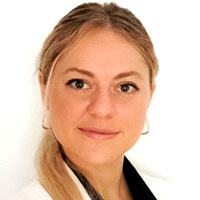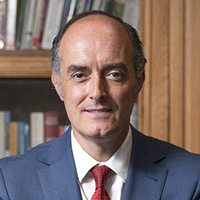Bachelor's Degree in Law
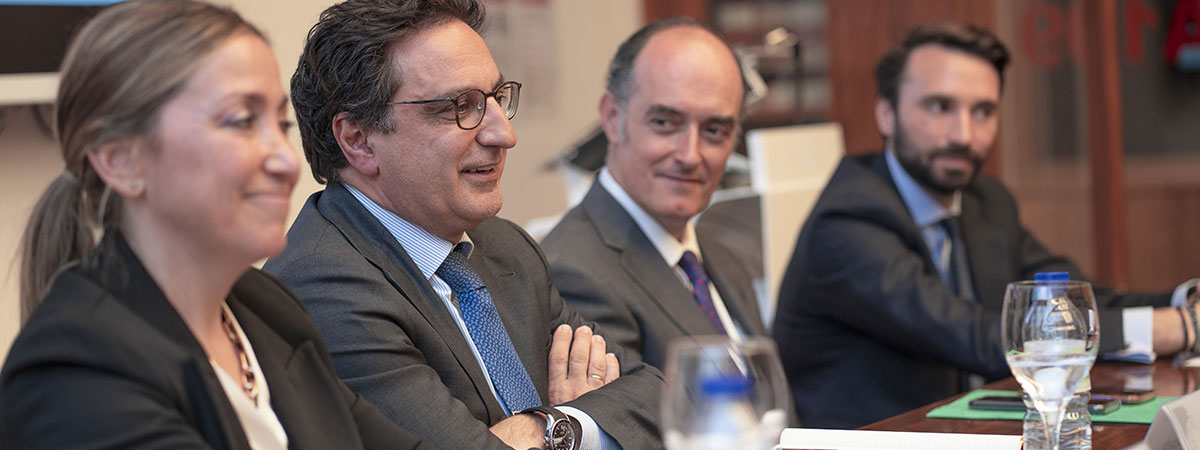
Legal clinic in prestigious law firms
The Bachelor's Degree in Law from Nebrija University allows the student to acquire specialized training, focused on the practice of law or the business world, through the wide range of electives offered.
The program includes a legal clinic, where students work together with the partners of some of the most prestigious law firms in our country, such as Baker McKenzie, Écija and Maio, in solving cases for non-profit associations and/or corporations. This is a unique opportunity to learn about the professional world and the reality of the sector.

Nebrija University's Law School reinforces its international presence with collaboration agreements with the most prestigious academic networks in the world.
The Bachelor's Degree in Law is a magnificent alternative for those who wish to open up endless professional doors, in which we can highlight its high employability index in various sectors. The Nebrija University graduate has a special training to develop professionally in different areas of law, as a business lawyer, managing their own firm or working for one of the most prestigious law firms in Spain.
In addition, all the Bachelor's Degree courses carry out their professional internships in some of the most prestigious firms in Spain (Garrigues, Écija and Ramón y Cajal) or in public institutions, thanks to the agreement with the General Council of the Judiciary to carry out internships in Courts and Tribunals.
The Bachelor's degree in Law from Nebrija University stands out for the following differential characteristics:
- The teaching method is specially designed so that the student becomes familiar with professional practice through the discussion of real cases, extracted in many occasions from the experience of his/her professors, and the exposition and debate of current legal issues. In this way, the student acquires the analysis, argumentation and decision-making skills essential to successfully carry out his/her professional activity in the future.
- Becoming acquainted with the working world through the compulsory realization of professional internships in prestigious law firms and legal counseling for companies.
- The multidisciplinary design of the new Bachelor's Degree in Law, fully adapted to the EHEA (European Higher Education Area), orients the minds of our students towards the intense knowledge of reality as a whole and not only to purely legal scenarios. The skills and competences of these studies are acquired by the students in a natural way, gradually becoming part of their daily work.
- University extension activities, which include seminars, conferences and visits to institutions and companies (courts, registries, financial centers, public bodies, etc.) that complement education and connect it with reality.
In addition, you have the possibility of combining the Bachelor's Degree in Law with the Bachelor's Degrees in International Relations, Business Creation, Administration and Management, or Security, promoting employability and promoting the figure of a new global Social Sciences professional with an international and transversal character.
Read Less"In a landscape dominated by social and digital transformation, guiding students through their learning journey to nurture versatile professionals capable of delivering innovative, high-quality legal services while upholding a strong commitment to society stands as an exhilarating challenge—one that engages the entire teaching faculty of the Department of Law."

Ana Quintana Director of the Law Department and the Bachelor's Degree in Law for the face-to-face modality
Double Degrees, double opportunities Combine your Degree in Law and obtain a Nebrija NextGen Talent Microcredential
What is the Nebrija NextGen Talent Microcredential?
Starting in the 2026/27 academic year, our Double Degrees will include this qualification, allowing our students to enrich their training and lead in an increasingly globalized world.
It consists of three essential elements:
From the 1st to the 4th year, there will be six work sessions of two and a half hours each, with expert guests from companies, media outlets, agencies, firms, and institutions to address topics such as:
- The most disruptive technological innovations
- New work methods and business models
- Deep Learning, Cognitive Science, Critical Thinking
- Global Affairs, Public Affairs
- New rights in the digital age
- Sustainability, Diversity, 2030 Agenda
Competencies:
- Global vision and critical thinking: abilities to design the future.
- Coherence and entrepreneurship: making the right decisions
- Teamwork and generosity: nurturing personal relationships
These six competencies will be assessed through an online assessment at the beginning of the program, providing each student with a personal development report. Based on that report, we will have two development sessions each year to create and monitor an action plan focusing on two competencies per year.
At the beginning of the fourth year, a new online assessment will allow us to measure each student’s personal improvement. In addition, it will offer guidance on the positions and sectors within the global market that best match their profile.
At the end of the Double Degree, students will participate in a one-week Study Tour at one of the following destinations:
- Montreal (McGill)
- Miami
- Boston (Babson College)
- Hong Kong
- Singapore
- Shanghai
Learn about our 80% Excellence Scholarships for these Double Degrees and benefit from an exclusive Mentoring Program.
Student mentoring program by active professionals
Curriculum
BOE No. 167, of July 11, 2018
Our curriculum has been prepared in accordance with the new guidelines set by current legislation, having been verified by the National Agency for Quality Assessment and Accreditation.
The student must take 240 credits
First year 60 ECTS
First Semester 30 ECTS- 6 ECTS | Roman Law
- 6 ECTS | Natural law and human rights
- 6 ECTS | Fundamentals of Economics
- 6 ECTS | History of law
- 6 ECTS | Seminar of legal competences and skills I
Second Semester 30 ECTS- 6 ECTS | Civil Law I: Fundamentals of civil law
- 6 ECTS | Administrative Law I
- 6 ECTS | Constitutional Law I
- 6 ECTS | Criminal Law I
- 6 ECTS | Common Law basics

Second year 60 ECTS
First Semester 30 ECTS- 6 ECTS | Constitutional law II
- 6 ECTS | Commercial Law I
- 6 ECTS | Criminal Law II
- 6 ECTS | Introduction to financial and tax law
- 6 ECTS | Seminar on legal competences and skills II
Second Semester 30 ECTS- 6 ECTS | Administrative Law II
- 6 ECTS | Fundamentals of accounting
- 6 ECTS | Civil law II: obligations and contracts
- 6 ECTS | Labor law and Social Security
- 6 ECTS | Privacy and data protection

Third year 60 ECTS
First Semester 30 ECTS- 6 ECTS | Civil Law III: real, mortgage and registry law
- 6 ECTS | Civil procedural law
- 6 ECTS | Elective I
- 6 ECTS | Elective II
- 6 ECTS | Elective III
Second Semester 30 ECTS- 6 ECTS | Civil Law IV: family and successions
- 6 ECTS | Commercial law II
- 6 ECTS | Public international law
- 6 ECTS | Elective IV
- 6 ECTS | Elective V
Fourth year 60 ECTS
First Semester 30 ECTS- 6 ECTS | Criminal Procedural Law
- 6 ECTS | Financial Law II: VAT and corporate tax
- 6 ECTS | Ethics and professional deontology
- 6 ECTS | Community law
- 6 ECTS | Alternative dispute resolution systems
Second Semester 30 ECTS- 6 ECTS | Private international law
- 6 ECTS | Development of the Participative and Solidarity Spirit
- 12 ECTS | Evaluation of the development of skills in the company
- 6 ECTS | Final Research Project
More information on these subjects
- 6 ECTS | Seminar on Legal skills and abilities I - 1st semester
The seminar offers an approach to the essential concepts for professional growth. It has a very broad agenda and among its main objectives is to train the participants and provide them with the strategic tools that are essential today for professional development in the field of Law. - 6 ECTS | Seminar on Legal skills and abilities II - 3st semester
The second part of the seminar tries to reinforce the skills and competencies learned in the previous course, always focused on the legal area. The following topics will be covered: identification of vocation, creativity and innovation, effective communication, negotiation techniques and tools, stress prevention techniques and time quality management, teamwork, work optimization tools, motivation, leadership and performance.
The student must obtain the 6 credits that make up this subject through:
- Cultural, sports, student representation, solidarity and cooperation activities. The Department will propose a list of these activities and will manage the awarding of these credits based on the different activities carried out by the student.
- Passing the semester subject: Corporate Social Responsibility.
The student can combine these two alternatives depending on their development needs until they obtain the 6 ECTS credits of the subject. Even having achieved the maximum number of ECTS credits, the student may continue to carry out cultural, sports, student representation, solidarity and cooperation activities whenever they wish, although this will not imply obtaining more ECTS credits.
Program which aims to promote the practical training of students, under the continuous supervision of the Department of Professional Careers of the University, the academic department corresponding to the degree and the company or collaborating institution where the practices are carried out. Advice is provided on the internship and there is follow-up and tutoring, always taking into account the professional orientation of each student.
List of companies and institutions where undergraduate students have carried out internships under an educational cooperation agreement.. Procedure of action in the realization of External Internships Management process for external internships and Professional Guidance More Information on Internships in CompaniesThe subject consists of choosing a subject to research or study in the field of Law, and writing a dissertation on it and defending in before a tribunal.
This process will be supervised by a professor from the School in order for the student to acquire the criteria and procedures by carrying out the project.
Nebrija University, which is committed to languages and quality, provides the student with added value with the Diploma in English Professional Communication, which will allow him/her to achieve with confidence the competence demanded to successfully join the labor market.
It corresponds to level C1.
More information hereFormer Curriculum (to extinguish)
The student must take 240 credits
First year 60 ECTS
First Semester 30 ECTS- 6 ECTS | Fundamentals of Economics
- 6 ECTS | Communication theory
- 6 ECTS | General Concepts of Administrative Law and Public Sector Contracting
- 6 ECTS | History of Spanish Law: The Roman and Germanic Influence
- 6 ECTS | The Spanish Constitution and its Law System
Second Semester 30 ECTS- 6 ECTS | Introduction to Law
- 6 ECTS | The Company and its Environment
- 6 ECTS | Fundamentals of Civil Law: Legal Standard, Person and the Legal Relationship
- 6 ECTS | General Concepts of Criminal Law and Theory of Punishment
- 6 ECTS | Competence Development Seminar I
Second year 60 ECTS
First Semester 30 ECTS- 6 ECTS | Contemporary world
- 6 ECTS | History of Political Thought
- 6 ECTS | Law of Obligations and Contracts
- 6 ECTS | Crimes and Offenses in the Spanish Legal System
- 6 ECTS | Legal Statute of the Entrepreneur and the Company and Company Law
Second Semester 30 ECTS- 6 ECTS | Social psychology
- 6 ECTS | Modern languages
- 6 ECTS | Commercial Contracts Law, Banking Law and Stock Exchange Law
- 6 ECTS | Introduction and General Questions of Procedural Law
- 6 ECTS | Competence Development Seminar II
Third year 60 ECTS
First Semester 30 ECTS- 6 ECTS | International Law in the Globalized World
- 6 ECTS | Contentious-Administrative Process, Public Function and Basic Institutions of Administrative Law
- 6 ECTS | Procedural Law and Civil Litigation
- 6 ECTS | Real Rights: its Regulation and Advertising
- 6 ECTS | Competition law
Second Semester 30 ECTS- 6 ECTS | Introduction to European Community Law
- 6 ECTS | Theory of Financial and Tax Law and PIT
- 18 ECTS | Eval. of the Development of Skills in the Company
Fourth year 60 ECTS
First Semester 24 ECTS- 6 ECTS | Procedural Law and Criminal Litigation
- 6 ECTS | Family Law and Succession Law
- 6 ECTS | Labor law and Social Security
- 6 ECTS | Competence Development Seminar III
Second Semester 36 ECTS- 6 ECTS | VAT, Tax on Companies and Tax Procedures
- 6 ECTS | Private international law
- 18 ECTS | Final Research Project
- 6 ECTS | Development of the Participatory and Solidarity Spirit
Professors
| Profesores Professors | Porcentaje de Doctores Percentage of PhD holders |
| 119 | 60% |
 Mónica Assama Rafi
Directora del Grado (modalidad semipresencial)
Director
Licenciada en Derecho por la Universidad de Barcelona. Profesora de Derecho Mercantil y de Derecho Marítimo de la Universidad Rovira y Virgili de Tarragona desde 1997. Larga trayectoria profesional como abogada especialista en derecho mercantil, derecho marítimo y derecho aéreo, habiendo trabajado en despachos de reconocido prestigio de Barcelona y Madrid. Actualmente es Profesora de Derecho Mercantil. Coordinadora de Calidad y Reconocimientos de la Facultad de Derecho y Relaciones Internacionales. Directora del Grado de Derecho Semipresencial. Coordinadora del Máster de Derecho Empresarial Internacional y del Máster de Derecho Laboral de la Universidad Nebrija.
Mónica Assama Rafi
Directora del Grado (modalidad semipresencial)
Director
Licenciada en Derecho por la Universidad de Barcelona. Profesora de Derecho Mercantil y de Derecho Marítimo de la Universidad Rovira y Virgili de Tarragona desde 1997. Larga trayectoria profesional como abogada especialista en derecho mercantil, derecho marítimo y derecho aéreo, habiendo trabajado en despachos de reconocido prestigio de Barcelona y Madrid. Actualmente es Profesora de Derecho Mercantil. Coordinadora de Calidad y Reconocimientos de la Facultad de Derecho y Relaciones Internacionales. Directora del Grado de Derecho Semipresencial. Coordinadora del Máster de Derecho Empresarial Internacional y del Máster de Derecho Laboral de la Universidad Nebrija.
 Ana Quintana Jiménez
Directora del Grado (modalidad presencial)
Director
Doctora en Turismo por la Universidad Nebrija. Licenciada en Derecho por la Universidad de Alcalá (CEU Luis Vives) Ha centrado su investigación en el área del Derecho del Turismo, en Derecho Civil, y en aspectos relacionados con la Seguridad y el Terrorismo. Desarrolla su investigación desde el grupo de investigación en “Inteligencia Turística e Innovación”.
Ha sido profesora de Legislación turística, Fundamentos de Derecho Civil, Derecho Romano, Introducción al Derecho Comunitario y Modelos de desarrollo turístico.
Ha ocupado cargos de gestión en la Universidad Nebrija, como la Dirección del Área de Derecho, Dirección del Máster en Derecho Empresarial, Dirección del Máster Universitario en Turismo, y actualmente dirige el Grado en Derecho en la modalidad presencial.
Ana Quintana Jiménez
Directora del Grado (modalidad presencial)
Director
Doctora en Turismo por la Universidad Nebrija. Licenciada en Derecho por la Universidad de Alcalá (CEU Luis Vives) Ha centrado su investigación en el área del Derecho del Turismo, en Derecho Civil, y en aspectos relacionados con la Seguridad y el Terrorismo. Desarrolla su investigación desde el grupo de investigación en “Inteligencia Turística e Innovación”.
Ha sido profesora de Legislación turística, Fundamentos de Derecho Civil, Derecho Romano, Introducción al Derecho Comunitario y Modelos de desarrollo turístico.
Ha ocupado cargos de gestión en la Universidad Nebrija, como la Dirección del Área de Derecho, Dirección del Máster en Derecho Empresarial, Dirección del Máster Universitario en Turismo, y actualmente dirige el Grado en Derecho en la modalidad presencial.
 Gracia Abad Quintal
Profesora
Professor
Doctora en Ciencias Políticas y Licenciada en Ciencias Políticas y de la Administración por la Universidad Complutense de Madrid. Es experta en Relaciones Internacionales y Política Exterior.
Su labor investigadora se centra en la seguridad internacional, las organizaciones internacionales, los procesos de integración y el multilateralismo, las relaciones internacionales de Asia Oriental y la política exterior y de seguridad china. Ha sido investigadora visitante en Royal Holloway, Universidad de Londres, la Universidad de Coimbra, el European Policy Center de Bruselas y la Rajaratnam School of International Studies de Singapur.
Su actividad docente está centrada en las Relaciones Internacionales y la Ciencia Política. Ha impartido docencia en Cursos de Grado y Postgrado en la Universidad Complutense de Madrid, Universidad de Salamanca, Universidad Camilo José Cela, Universidad Pontificia Comillas Saint Louis University y San Pablo CEU. Conferenciante en numerosas universidades, entre las que cabe mencionar, Syracuse University, Richmond University, Universidad Pontificia Comillas, Universidad de Valladolid, Universidad Complutense o Royal Holloway.
Gracia Abad Quintal
Profesora
Professor
Doctora en Ciencias Políticas y Licenciada en Ciencias Políticas y de la Administración por la Universidad Complutense de Madrid. Es experta en Relaciones Internacionales y Política Exterior.
Su labor investigadora se centra en la seguridad internacional, las organizaciones internacionales, los procesos de integración y el multilateralismo, las relaciones internacionales de Asia Oriental y la política exterior y de seguridad china. Ha sido investigadora visitante en Royal Holloway, Universidad de Londres, la Universidad de Coimbra, el European Policy Center de Bruselas y la Rajaratnam School of International Studies de Singapur.
Su actividad docente está centrada en las Relaciones Internacionales y la Ciencia Política. Ha impartido docencia en Cursos de Grado y Postgrado en la Universidad Complutense de Madrid, Universidad de Salamanca, Universidad Camilo José Cela, Universidad Pontificia Comillas Saint Louis University y San Pablo CEU. Conferenciante en numerosas universidades, entre las que cabe mencionar, Syracuse University, Richmond University, Universidad Pontificia Comillas, Universidad de Valladolid, Universidad Complutense o Royal Holloway.
 Esther Alba Ferré
Profesora
Professor
Doctora en Derecho por la Universidad San Pablo CEU. Es experta en Derecho Civil de la Persona y en Derecho de Familia. Ha realizado una estancia en Portugal con la Beca Erasmus de docencia.
Su labor investigadora se desarrolla fundamentalmente en el ámbito del Derecho de la Persona, el nuevo Derecho de Familia y la innovación educativa. Es autora de varios capítulos de libros y artículos de revistas de reconocido prestigio. Es coordinadora de un libro sobre la Persona en siglo XXI y coautora de una monografía sobre contratación civil y mercantil. Es evaluadora externa de la Revista de Derecho Civil y de la Revista de la Universidad del Externado de Colombia.
Su actividad docente se centra en el ámbito de Derecho Civil, habiendo impartido docencia en la Universidad Europea de Madrid y en ESERP (centro adscrito a la Universidad Rey Juan Carlos), tanto en asignaturas de Grado como en el Máster Universitario de Acceso a la Abogacía. Dirige en la actualidad trabajos fin de Grado y fin de Máster en la Universidad Europea de Madrid y en la UNED.
En el ámbito universitario, ha ostentado cargos de gestión, como directora de titulación de Derecho, Coordinadora del Máster de Práctica Jurídica, Directora del Departamento de Atención Integral al Alumno y responsable de innovación educativa de la Facultad.
Miembro de un equipo de investigación en el área de Derecho e Inteligencia Artificial y coordinadora interna y miembro de un proyecto de Erasmus plus sobre Educación y Tecnología. Ha recibido el premio de la mejor labor docente y mejores prácticas docentes en la Universidad Europea de Madrid.
Esther Alba Ferré
Profesora
Professor
Doctora en Derecho por la Universidad San Pablo CEU. Es experta en Derecho Civil de la Persona y en Derecho de Familia. Ha realizado una estancia en Portugal con la Beca Erasmus de docencia.
Su labor investigadora se desarrolla fundamentalmente en el ámbito del Derecho de la Persona, el nuevo Derecho de Familia y la innovación educativa. Es autora de varios capítulos de libros y artículos de revistas de reconocido prestigio. Es coordinadora de un libro sobre la Persona en siglo XXI y coautora de una monografía sobre contratación civil y mercantil. Es evaluadora externa de la Revista de Derecho Civil y de la Revista de la Universidad del Externado de Colombia.
Su actividad docente se centra en el ámbito de Derecho Civil, habiendo impartido docencia en la Universidad Europea de Madrid y en ESERP (centro adscrito a la Universidad Rey Juan Carlos), tanto en asignaturas de Grado como en el Máster Universitario de Acceso a la Abogacía. Dirige en la actualidad trabajos fin de Grado y fin de Máster en la Universidad Europea de Madrid y en la UNED.
En el ámbito universitario, ha ostentado cargos de gestión, como directora de titulación de Derecho, Coordinadora del Máster de Práctica Jurídica, Directora del Departamento de Atención Integral al Alumno y responsable de innovación educativa de la Facultad.
Miembro de un equipo de investigación en el área de Derecho e Inteligencia Artificial y coordinadora interna y miembro de un proyecto de Erasmus plus sobre Educación y Tecnología. Ha recibido el premio de la mejor labor docente y mejores prácticas docentes en la Universidad Europea de Madrid.
 Álvaro Alarcón Dávalos
Profesor
Professor
Licenciado en Derecho por la Universidad Complutense de Madrid. Completó la Licenciatura en un año menos de lo previsto por el plan de estudios. Máster en Derecho Empresarial, Centro de Estudios Garrigues y Universidad de Nebrija.
Estancia investigadora en la Universidad de Harvard (Boston-EEUU). “El arbitraje en Estados Unidos”. Julio/Agosto 2011.
Desde 2011 es abogado en Deloitte Legal. Forma parte del departamento de Derecho Procesal, Mediación y Arbitraje.
Además de la Universidad Nebrija, imparte clases en la Universidad Carlos III de Madrid y en la Universidad Rey Juan Carlos. Además, ha sido miembro del tribunal de los actos de defensa de los Trabajos Fin de Máster de Acceso a la Abogacía especialidad en Arbitraje Internacional de la Universidad Carlos III de Madrid.
Álvaro Alarcón Dávalos
Profesor
Professor
Licenciado en Derecho por la Universidad Complutense de Madrid. Completó la Licenciatura en un año menos de lo previsto por el plan de estudios. Máster en Derecho Empresarial, Centro de Estudios Garrigues y Universidad de Nebrija.
Estancia investigadora en la Universidad de Harvard (Boston-EEUU). “El arbitraje en Estados Unidos”. Julio/Agosto 2011.
Desde 2011 es abogado en Deloitte Legal. Forma parte del departamento de Derecho Procesal, Mediación y Arbitraje.
Además de la Universidad Nebrija, imparte clases en la Universidad Carlos III de Madrid y en la Universidad Rey Juan Carlos. Además, ha sido miembro del tribunal de los actos de defensa de los Trabajos Fin de Máster de Acceso a la Abogacía especialidad en Arbitraje Internacional de la Universidad Carlos III de Madrid.
 Ivana Ambrosio Racic
Profesora
Professor
Doctora en Ciencias Empresariales por la Universidad Nebrija. Máster Universitario en Creación y Dirección de Empresas por la Universidad Nebrija. Licenciada en Ciencias Económicas y Empresariales por la Universidad Complutense de Madrid, rama de Economía de la Empresa, especialidad en Contabilidad y Auditoría. También Diplomada por la Universidad Complutense de Madrid en Ciencias Empresariales, especialidad en Contabilidad. Cursos de Doctorado en la UCM en el programa de Contabilidad y Auditoría. Profesora del área de Contabilidad de la Universidad Antonio de Nebrija. Ha sido profesora asociada en IE University y en la Universidad Carlos III de Madrid. También profesora y colaboradora en la CECO-ICEX, Nebrija Business School, Fundación COSO, AEDE Business School.
Ivana Ambrosio Racic
Profesora
Professor
Doctora en Ciencias Empresariales por la Universidad Nebrija. Máster Universitario en Creación y Dirección de Empresas por la Universidad Nebrija. Licenciada en Ciencias Económicas y Empresariales por la Universidad Complutense de Madrid, rama de Economía de la Empresa, especialidad en Contabilidad y Auditoría. También Diplomada por la Universidad Complutense de Madrid en Ciencias Empresariales, especialidad en Contabilidad. Cursos de Doctorado en la UCM en el programa de Contabilidad y Auditoría. Profesora del área de Contabilidad de la Universidad Antonio de Nebrija. Ha sido profesora asociada en IE University y en la Universidad Carlos III de Madrid. También profesora y colaboradora en la CECO-ICEX, Nebrija Business School, Fundación COSO, AEDE Business School.
 Andrés Jerónimo Arenas Falótico
Profesor
Professor
Doctor en Gestión por la Florida Intl University. Máster en Dirección y Administración de Empresas en St Thomas University. Máster en Educación por la Universidad Camilo José Cela. Licenciado en Derecho por la Universidad Santa María. Licenciado en Periodismo por la Universidad de Georgia. International Baccalaureate, Business Teacher C2. Invitado a Naciones Unidas como ponente. Su labor investigadora se centra en la comparación legislativa y gestión empresarial y de personas del Mercado de Trabajo a Nivel Mundial. Posee más de 11 publicaciones indexadas de alto impacto, así como, capítulos de libro en editoriales británicas como IGI y Rouledge Francis and Group. En relación con el ámbito docente imparte en el área de Derecho Comparado, Internacionalización de Empresas, Dirección y Gestión de Empresas en el área Jurídica y Tecnológica. Ha impartido docencia en diferentes Universidades como ESIC, Universidad Europea de Madrid, Universidad del Istmo de Panamá, UNIR y UNEFA. Su experiencia profesional se concentra en la Dirección de la Estrategia de varias Empresas Multinacionales. Ha ostentado cargos de gestión como Director de Post-Grado de los Programas de Maestría en Gobierno Electrónico y Maestría en Gerencia de las Tecnologías de Información y Comunicación; Director del Máster en Transformación Digital y el Máster Universitario en Finanzas en la Universidad Europea de Madrid y Director del MBA en la especialización jurídica y tecnológica en la Universidad Nebrija. Es Director de varias tesis doctorales. Colaborador con periódicos nacionales para artículos divulgativos en su área de especialización, así como, en Radio y Televisión. Miembro de varios comités científicos de diferentes revistas a nivel internacional. Miembro sénior de la Academia de Educación Superior (Reino Unido). Entre los méritos más relevantes destacan: Senior Fellow Higher Education Academy UK; Gold Medal - Job Performance; Honuor Best Teaching Techniques 2015-2016; Gold Eagle Bottom Andres Arenas` Day por la Alcaldía de Miami.
Andrés Jerónimo Arenas Falótico
Profesor
Professor
Doctor en Gestión por la Florida Intl University. Máster en Dirección y Administración de Empresas en St Thomas University. Máster en Educación por la Universidad Camilo José Cela. Licenciado en Derecho por la Universidad Santa María. Licenciado en Periodismo por la Universidad de Georgia. International Baccalaureate, Business Teacher C2. Invitado a Naciones Unidas como ponente. Su labor investigadora se centra en la comparación legislativa y gestión empresarial y de personas del Mercado de Trabajo a Nivel Mundial. Posee más de 11 publicaciones indexadas de alto impacto, así como, capítulos de libro en editoriales británicas como IGI y Rouledge Francis and Group. En relación con el ámbito docente imparte en el área de Derecho Comparado, Internacionalización de Empresas, Dirección y Gestión de Empresas en el área Jurídica y Tecnológica. Ha impartido docencia en diferentes Universidades como ESIC, Universidad Europea de Madrid, Universidad del Istmo de Panamá, UNIR y UNEFA. Su experiencia profesional se concentra en la Dirección de la Estrategia de varias Empresas Multinacionales. Ha ostentado cargos de gestión como Director de Post-Grado de los Programas de Maestría en Gobierno Electrónico y Maestría en Gerencia de las Tecnologías de Información y Comunicación; Director del Máster en Transformación Digital y el Máster Universitario en Finanzas en la Universidad Europea de Madrid y Director del MBA en la especialización jurídica y tecnológica en la Universidad Nebrija. Es Director de varias tesis doctorales. Colaborador con periódicos nacionales para artículos divulgativos en su área de especialización, así como, en Radio y Televisión. Miembro de varios comités científicos de diferentes revistas a nivel internacional. Miembro sénior de la Academia de Educación Superior (Reino Unido). Entre los méritos más relevantes destacan: Senior Fellow Higher Education Academy UK; Gold Medal - Job Performance; Honuor Best Teaching Techniques 2015-2016; Gold Eagle Bottom Andres Arenas` Day por la Alcaldía de Miami.
 Mª Carmen Arroyo Rodríguez
Profesora
Professor
Licenciada en Derecho por la Universidad Autónoma de Madrid. Colegiada ejerciente del Ilustre Colegio de Abogados de Madrid desde 1993, ejerciendo sus competencias como abogado civilista y mercantilista independiente. Es Administradora Concursal y Árbitro de la Asociación Europea de Arbitraje desde 2010 y del Consejo Arbitral de la Comunidad de Madrid desde 2018.
Ha ejercido como docente dentro y fuera de España en el ámbito del Derecho Mercantil, ejerciendo como Docente de la Universidad Nebrija en el área de derecho mercantil en la Facultad de Derecho y de Relaciones Internacionales tanto en grado como en máster.
Ha compatibilizado su trabajo como letrado ejerciendo funciones como Legal Counsel de empresas nacionales y multinacionales, asesorando en startup de empresas americanas en España, así como, en Due Diligence de compra de carteras financieras para las principales entidades bancarias del país.
Mª Carmen Arroyo Rodríguez
Profesora
Professor
Licenciada en Derecho por la Universidad Autónoma de Madrid. Colegiada ejerciente del Ilustre Colegio de Abogados de Madrid desde 1993, ejerciendo sus competencias como abogado civilista y mercantilista independiente. Es Administradora Concursal y Árbitro de la Asociación Europea de Arbitraje desde 2010 y del Consejo Arbitral de la Comunidad de Madrid desde 2018.
Ha ejercido como docente dentro y fuera de España en el ámbito del Derecho Mercantil, ejerciendo como Docente de la Universidad Nebrija en el área de derecho mercantil en la Facultad de Derecho y de Relaciones Internacionales tanto en grado como en máster.
Ha compatibilizado su trabajo como letrado ejerciendo funciones como Legal Counsel de empresas nacionales y multinacionales, asesorando en startup de empresas americanas en España, así como, en Due Diligence de compra de carteras financieras para las principales entidades bancarias del país.
 Francisco Avendaño Martínez
Profesor
Professor
Licenciado en Derecho por la Universidad de Alcalá de Henares. Realizó un Máster en Dirección de Recursos Humanos en el Instituto de Empresa. Es experto en Relaciones Laborales y RR.HH. Actualmente, lidera proyectos sociales, de relaciones laborales y recursos humanos. A lo largo de su extensa experiencia laboral, ha trabajado como responsable en dirigir e implantar modelos de relaciones laborales en Colombia, Perú, Honduras y Panamá. Asesor de Confederación Sindical de Trabajadores UTC. Negociaciones Empresas, Sindicatos y Gobiernos. Diseño e implantación de actuaciones de RSE. Ha desempeñado sus funciones en diversos puestos de responsabilidad en CEOE, Gas Natural Fenosa, PwC, Accenture, entre otros. Miembro de pleno derecho de DCH-Organización Internacional de Directivos de Capital Humano. The Club of Consultants with Experience. Fundador y primer Presidente de la Fundación del Servicio Interconfederal de Mediación y Arbitraje (SIMA). Ha participado en diversas publicaciones y acciones formativas.
Francisco Avendaño Martínez
Profesor
Professor
Licenciado en Derecho por la Universidad de Alcalá de Henares. Realizó un Máster en Dirección de Recursos Humanos en el Instituto de Empresa. Es experto en Relaciones Laborales y RR.HH. Actualmente, lidera proyectos sociales, de relaciones laborales y recursos humanos. A lo largo de su extensa experiencia laboral, ha trabajado como responsable en dirigir e implantar modelos de relaciones laborales en Colombia, Perú, Honduras y Panamá. Asesor de Confederación Sindical de Trabajadores UTC. Negociaciones Empresas, Sindicatos y Gobiernos. Diseño e implantación de actuaciones de RSE. Ha desempeñado sus funciones en diversos puestos de responsabilidad en CEOE, Gas Natural Fenosa, PwC, Accenture, entre otros. Miembro de pleno derecho de DCH-Organización Internacional de Directivos de Capital Humano. The Club of Consultants with Experience. Fundador y primer Presidente de la Fundación del Servicio Interconfederal de Mediación y Arbitraje (SIMA). Ha participado en diversas publicaciones y acciones formativas.
 Luis Banciella Rodríguez-Miñón
Profesor
Professor
Licenciado en Derecho por la Universidad Complutense. Diplomado en Ciencias Económicas y Empresariales por la Universidad San Pablo CEU. Abogado del Estado desde el año 2001. Ha sido Secretario General de ENAIRE E.P.E, hasta su nombramiento como Abogado General de la Comunidad de Madrid.
Como Abogado del Estado ha ejercido sus funciones en diversos puestos de responsabilidad, entre otros, ha sido Secretario titular del Tribunal Económico-Administrativo Regional de Canarias, Abogado del Estado ante la Audiencia Nacional, específicamente en la Subdirección de Asuntos Europeos e Internacionales ha ejercicio la función de Representación y defensa en juicio del Reino de España ante el Tribunal de Justicia de la Unión Europea, siendo experto Nacional Destacado ante el Servicio Jurídico de la Comisión Europea desde el año 2013 al 2015.
Luis Banciella Rodríguez-Miñón
Profesor
Professor
Licenciado en Derecho por la Universidad Complutense. Diplomado en Ciencias Económicas y Empresariales por la Universidad San Pablo CEU. Abogado del Estado desde el año 2001. Ha sido Secretario General de ENAIRE E.P.E, hasta su nombramiento como Abogado General de la Comunidad de Madrid.
Como Abogado del Estado ha ejercido sus funciones en diversos puestos de responsabilidad, entre otros, ha sido Secretario titular del Tribunal Económico-Administrativo Regional de Canarias, Abogado del Estado ante la Audiencia Nacional, específicamente en la Subdirección de Asuntos Europeos e Internacionales ha ejercicio la función de Representación y defensa en juicio del Reino de España ante el Tribunal de Justicia de la Unión Europea, siendo experto Nacional Destacado ante el Servicio Jurídico de la Comisión Europea desde el año 2013 al 2015.
 José María Bautista Samaniego
Profesor
Professor
Doctor en Derecho por la Universidad Autónoma de Madrid (sobresaliente Cum Laude). Es experto en Derecho Administrativo, en particular en las Áreas de Contratación Pública, Derecho Urbanístico y Derecho Inmobiliario.
Su labor investigadora se desarrolla fundamentalmente en el ámbito del Derecho Administrativo. Ha impartido docencia en Cursos de Postgrado y Másteres Universitarios en la Universidad Autónoma de Madrid (Practicum Iuris), Instituto Nacional de Administración Pública (INAP) (Máster de Urbanismo).
Asimismo, también cuenta con experiencia profesional en el Ministerio de Defensa, señaladamente como Asesor Jurídico Jefe de la Gerencia de Infraestructura de la Defensa (hoy INVIED), Asesor del Contingente Militar en Kosovo (KSPAGT X, octubre 2003 a abril 2004), Subdirector General de Régimen Jurídico del Patrimonio e Inventario (Ayuntamiento de Madrid), Asesoría Jurídica General del Ministerio de Defensa (asuntos sobre contratación administrativa, urbanismo, inmobiliario, responsabilidad patrimonial de la Administración), y la Unidad de Consejo de Ministros del Ministerio de Defensa.
José María Bautista Samaniego
Profesor
Professor
Doctor en Derecho por la Universidad Autónoma de Madrid (sobresaliente Cum Laude). Es experto en Derecho Administrativo, en particular en las Áreas de Contratación Pública, Derecho Urbanístico y Derecho Inmobiliario.
Su labor investigadora se desarrolla fundamentalmente en el ámbito del Derecho Administrativo. Ha impartido docencia en Cursos de Postgrado y Másteres Universitarios en la Universidad Autónoma de Madrid (Practicum Iuris), Instituto Nacional de Administración Pública (INAP) (Máster de Urbanismo).
Asimismo, también cuenta con experiencia profesional en el Ministerio de Defensa, señaladamente como Asesor Jurídico Jefe de la Gerencia de Infraestructura de la Defensa (hoy INVIED), Asesor del Contingente Militar en Kosovo (KSPAGT X, octubre 2003 a abril 2004), Subdirector General de Régimen Jurídico del Patrimonio e Inventario (Ayuntamiento de Madrid), Asesoría Jurídica General del Ministerio de Defensa (asuntos sobre contratación administrativa, urbanismo, inmobiliario, responsabilidad patrimonial de la Administración), y la Unidad de Consejo de Ministros del Ministerio de Defensa.
 Gema Alejandra Botana García
Profesora
Professor
Doctora en Derecho por la Universidad de Zaragoza. Es experta en Derecho Civil y Gestión Educativa. Ha realizado estancias de investigación en Université de Louvain-Là-Neuve (Bélgica), Université de Paris II, Université Fribourg (Suiza).
Su labor investigadora se desarrolla fundamentalmente en el ámbito del Derecho de la protección de consumidores, el Derecho de daños y Gestión educativa. Es autora de monografías y numerosas publicaciones en diversas Revistas, así como Subdirectora de la Revista Actualidad Civil y Directora Adjunta de la Revista Práctica de Derecho de Daños.
Su actividad docente se centra en el ámbito del Derecho Civil. Ha impartido docencia, entre otras Universidades, en Cursos de Postgrado y Másteres Universitarios en Universidad de Zaragoza, Universidad Europea de Madrid, Universidad Carlos III, Universidad de Salamanca, Universidad Pontificia de Salamanca, UNED, Universidad Complutense, Universidad de París II, Universidad París XII, Instituto Tecnológico y de Estudios Superiores de Monterrey, Universidade Internacional Figueira da Foz.
En el ámbito universitario, ha ostentado cargos de gestión, como Responsable de Investigación del área de Derecho de la Universidad Europea de Madrid, Directora del Departamento de Derecho de la Universidad Europea de Madrid, Directora del Área Jurídica de la Universidad Europea de Madrid. Asimismo, también cuenta con experiencia profesional como Directora de Wolters Kluwer Formación.
Miembro del Jurado de la Asociación para la Autorregulación de la Comunicación Comercial representando al Instituto Nacional de Consumo. Directora de la Gestión de la Red Extrajudicial Europea en España en colaboración con el Instituto Nacional de Consumo. Vocal del Consejo de Consumo de la Comunidad de Madrid en calidad de único Experto de reconocido prestigio en materia de consumo. Miembro del Jurado Premio Abogado del Futuro Wolters Kluwer-La Ley.
Gema Alejandra Botana García
Profesora
Professor
Doctora en Derecho por la Universidad de Zaragoza. Es experta en Derecho Civil y Gestión Educativa. Ha realizado estancias de investigación en Université de Louvain-Là-Neuve (Bélgica), Université de Paris II, Université Fribourg (Suiza).
Su labor investigadora se desarrolla fundamentalmente en el ámbito del Derecho de la protección de consumidores, el Derecho de daños y Gestión educativa. Es autora de monografías y numerosas publicaciones en diversas Revistas, así como Subdirectora de la Revista Actualidad Civil y Directora Adjunta de la Revista Práctica de Derecho de Daños.
Su actividad docente se centra en el ámbito del Derecho Civil. Ha impartido docencia, entre otras Universidades, en Cursos de Postgrado y Másteres Universitarios en Universidad de Zaragoza, Universidad Europea de Madrid, Universidad Carlos III, Universidad de Salamanca, Universidad Pontificia de Salamanca, UNED, Universidad Complutense, Universidad de París II, Universidad París XII, Instituto Tecnológico y de Estudios Superiores de Monterrey, Universidade Internacional Figueira da Foz.
En el ámbito universitario, ha ostentado cargos de gestión, como Responsable de Investigación del área de Derecho de la Universidad Europea de Madrid, Directora del Departamento de Derecho de la Universidad Europea de Madrid, Directora del Área Jurídica de la Universidad Europea de Madrid. Asimismo, también cuenta con experiencia profesional como Directora de Wolters Kluwer Formación.
Miembro del Jurado de la Asociación para la Autorregulación de la Comunicación Comercial representando al Instituto Nacional de Consumo. Directora de la Gestión de la Red Extrajudicial Europea en España en colaboración con el Instituto Nacional de Consumo. Vocal del Consejo de Consumo de la Comunidad de Madrid en calidad de único Experto de reconocido prestigio en materia de consumo. Miembro del Jurado Premio Abogado del Futuro Wolters Kluwer-La Ley.
 Sonia Boulos
Profesora
Professor
Doctora en Derecho internacional por la Universidad de Notre Dame, Estados Unidos (con una beca Fulbright). Máster en Derecho internacional Humanitario por la misma universidad. Licenciada en Derecho por la Universidad de Haifa, Israel. Es experta en Derechos Humanos. Ha trabajado en la Asociación para los Derechos civiles en Israel y en la organización de Derechos humanos REDRESS, en Londres, Reino Unido, entre otras organizaciones. Ha publicado como autora y coautora diversas obras sobre su línea de investigación: el régimen internacional de los derechos humanos y el derecho humanitario en general. Ha sido profesora en la Universidad de Haifa, Israel.
Sonia Boulos
Profesora
Professor
Doctora en Derecho internacional por la Universidad de Notre Dame, Estados Unidos (con una beca Fulbright). Máster en Derecho internacional Humanitario por la misma universidad. Licenciada en Derecho por la Universidad de Haifa, Israel. Es experta en Derechos Humanos. Ha trabajado en la Asociación para los Derechos civiles en Israel y en la organización de Derechos humanos REDRESS, en Londres, Reino Unido, entre otras organizaciones. Ha publicado como autora y coautora diversas obras sobre su línea de investigación: el régimen internacional de los derechos humanos y el derecho humanitario en general. Ha sido profesora en la Universidad de Haifa, Israel.
 Santiago Budría Rodríguez
Profesor
Professor
Doctor en Economía Cuantitativa por la Universidad de Alicante en el marco del doctorado QED programa del Departamento de Análisis Económico. Licenciado en Economía por la Universidad Pompeu Fabra. Profesor titular acreditado por ANECA. Sus áreas de interés son la microeconometría, el mercado de trabajo, la economía de la educación, la desigualdad y el bienestar. Su labor investigadora se circunscribe al papel de los rasgos de personalidad, económicos situación social e inseguridad económica en la determinación de los niveles de bienestar en las sociedades modernas. Cuenta con más de 1000 citaciones en Google Scholar y más de 20 artículos en revistas JCR, ha colaborado en una docena de proyectos de investigación competitivos y consultoría. Tiene dos sexenios aprobados por la Comisión Nacional Evaluadora de la Actividad Investigadora de España. Ha impartido docencia en grados y postgrados en Universidad Nebrija.
Santiago Budría Rodríguez
Profesor
Professor
Doctor en Economía Cuantitativa por la Universidad de Alicante en el marco del doctorado QED programa del Departamento de Análisis Económico. Licenciado en Economía por la Universidad Pompeu Fabra. Profesor titular acreditado por ANECA. Sus áreas de interés son la microeconometría, el mercado de trabajo, la economía de la educación, la desigualdad y el bienestar. Su labor investigadora se circunscribe al papel de los rasgos de personalidad, económicos situación social e inseguridad económica en la determinación de los niveles de bienestar en las sociedades modernas. Cuenta con más de 1000 citaciones en Google Scholar y más de 20 artículos en revistas JCR, ha colaborado en una docena de proyectos de investigación competitivos y consultoría. Tiene dos sexenios aprobados por la Comisión Nacional Evaluadora de la Actividad Investigadora de España. Ha impartido docencia en grados y postgrados en Universidad Nebrija.
 Gregorio María Callejo Hernanz
Profesor
Professor
Licenciado en Derecho por la Universidad Complutense de Madrid en 1995. Tras aprobar la oposición a Judicatura ejerce como juez desde 2001 en diversos destinos (Juzgado de Primera Instancia e Instrucción en Sant Boi de Llobregat, Juzgado de Instrucción de Badalona, Juzgado de lo Penal de Mataró, secciones 7ª y 9ª de la A. P de Barcelona (penales), Sección 23ª de la Audiencia Provincial de Madrid (penal) y, actualmente, Juzgado de Primera Instancia e Instrucción 5 de Majadahonda.
Su actividad docente se centra en el ámbito del Derecho Penal y del Derecho Procesal Civil. Ha sido profesor asociado de la Universidad Autónoma de Barcelona, y ha participado en grados y másteres Universitarios en la propia U.A.B, y ha sido ponente y director de cursos en el ámbito del Consejo General del Poder Judicial, Centre d´Estudis Juridics de la Generalitat de Catalunya, Colegio de Abogados de Madrid y Universidad Antonio Nebrija.
Sus publicaciones científicas se han centrado en el ámbito del Derecho Penal y en concreto de la Historia del pensamiento jurídico penal español.
Gregorio María Callejo Hernanz
Profesor
Professor
Licenciado en Derecho por la Universidad Complutense de Madrid en 1995. Tras aprobar la oposición a Judicatura ejerce como juez desde 2001 en diversos destinos (Juzgado de Primera Instancia e Instrucción en Sant Boi de Llobregat, Juzgado de Instrucción de Badalona, Juzgado de lo Penal de Mataró, secciones 7ª y 9ª de la A. P de Barcelona (penales), Sección 23ª de la Audiencia Provincial de Madrid (penal) y, actualmente, Juzgado de Primera Instancia e Instrucción 5 de Majadahonda.
Su actividad docente se centra en el ámbito del Derecho Penal y del Derecho Procesal Civil. Ha sido profesor asociado de la Universidad Autónoma de Barcelona, y ha participado en grados y másteres Universitarios en la propia U.A.B, y ha sido ponente y director de cursos en el ámbito del Consejo General del Poder Judicial, Centre d´Estudis Juridics de la Generalitat de Catalunya, Colegio de Abogados de Madrid y Universidad Antonio Nebrija.
Sus publicaciones científicas se han centrado en el ámbito del Derecho Penal y en concreto de la Historia del pensamiento jurídico penal español.
 Juan Carlos Campaña Naranjo
Profesor
Professor
Doctor en Economía (calificación: Sobresaliente Cum Laude y mención Doctor Internacional) por la Universidad de Zaragoza. Máster Universitario de Investigación en Economía por la Universidad de Zaragoza. Es especialista en microeconomía.
Ha impartido docencia en la Universidad de Zaragoza. Su principal área de investigación es la Microeconomía y, en particular la Economía familiar y de la Población, con intereses específicos en las diferencias de género en los Usos del Tiempo.). Ha participado en Proyectos de Investigación Competitivos (Unión Europea, Nacionales y Regionales) y ha presentado sus trabajos de investigación en congresos tanto nacionales como internacionales. Sus trabajos de Investigación han sido publicados en revistas de alto impacto (JCR), destacando: Feminist Economics, Journal of Development Studies y Latin American Economic Review. También ha sido evaluador de revistas de alto impacto, destacando: Review of Economics of the Household (REHO) y Journal of Family and Economics Issues. Además, ha realizado una estancia de Investigación en "The Division of Gender Affairs (División de Asuntos de Genero)" en "Economic Commission for Latin America and the Caribbean (Comisión Económica para América Latina y el Caribe - ONU)" en Santiago de Chile. Ha ostentado cargos de gestión como la Coordinación de la Cátedra Global Nebrija Santander en Internacionalización de Empresas, Investigación en el grupo ECEMIN (Economía, Bienestar, Empresa e Internacionalización).
Juan Carlos Campaña Naranjo
Profesor
Professor
Doctor en Economía (calificación: Sobresaliente Cum Laude y mención Doctor Internacional) por la Universidad de Zaragoza. Máster Universitario de Investigación en Economía por la Universidad de Zaragoza. Es especialista en microeconomía.
Ha impartido docencia en la Universidad de Zaragoza. Su principal área de investigación es la Microeconomía y, en particular la Economía familiar y de la Población, con intereses específicos en las diferencias de género en los Usos del Tiempo.). Ha participado en Proyectos de Investigación Competitivos (Unión Europea, Nacionales y Regionales) y ha presentado sus trabajos de investigación en congresos tanto nacionales como internacionales. Sus trabajos de Investigación han sido publicados en revistas de alto impacto (JCR), destacando: Feminist Economics, Journal of Development Studies y Latin American Economic Review. También ha sido evaluador de revistas de alto impacto, destacando: Review of Economics of the Household (REHO) y Journal of Family and Economics Issues. Además, ha realizado una estancia de Investigación en "The Division of Gender Affairs (División de Asuntos de Genero)" en "Economic Commission for Latin America and the Caribbean (Comisión Económica para América Latina y el Caribe - ONU)" en Santiago de Chile. Ha ostentado cargos de gestión como la Coordinación de la Cátedra Global Nebrija Santander en Internacionalización de Empresas, Investigación en el grupo ECEMIN (Economía, Bienestar, Empresa e Internacionalización).
 Andrea Carrera
Profesor
Professor
Doctor en Economía por la Universidad de Lugano, Suiza (homologado UAM). Máster oficial en Economía por la Universidad Complutense de Madrid. Ha impartido docencia en varias universidades nacionales. Sus áreas de investigación abarcan la macroeconomía monetaria, la historia monetaria, y las relaciones monetarias internacionales. Ha participado en congresos, estancias de investigación e impartido clases en Europa y en América del Norte. Fuera del ámbito universitario, ha trabajado en grandes empresas de Italia y de Alemania. Es autor de un libro sobre la teoría del beneficio y los créditos bancarios (Routledge, 2019). Sus nuevos proyectos incluyen un libro para Palgrave Macmillan sobre el sistema de pagos internacionales (con Alvaro Cencini, LSE) y otro para Routledge sobre la historia monetaria de España (con Alberto Pineda Álcantara, KCL).
En el ámbito universitario, ha ostentado cargos de gestión, como Coordinador de Movilidad Internacional en la Facultad de Derecho y de Relaciones Internacionales de Universidad Nebrija.
Andrea Carrera
Profesor
Professor
Doctor en Economía por la Universidad de Lugano, Suiza (homologado UAM). Máster oficial en Economía por la Universidad Complutense de Madrid. Ha impartido docencia en varias universidades nacionales. Sus áreas de investigación abarcan la macroeconomía monetaria, la historia monetaria, y las relaciones monetarias internacionales. Ha participado en congresos, estancias de investigación e impartido clases en Europa y en América del Norte. Fuera del ámbito universitario, ha trabajado en grandes empresas de Italia y de Alemania. Es autor de un libro sobre la teoría del beneficio y los créditos bancarios (Routledge, 2019). Sus nuevos proyectos incluyen un libro para Palgrave Macmillan sobre el sistema de pagos internacionales (con Alvaro Cencini, LSE) y otro para Routledge sobre la historia monetaria de España (con Alberto Pineda Álcantara, KCL).
En el ámbito universitario, ha ostentado cargos de gestión, como Coordinador de Movilidad Internacional en la Facultad de Derecho y de Relaciones Internacionales de Universidad Nebrija.
 Laura Castillo Navarro
Profesora
Professor
Licenciada en Derecho y en Ciencias del Trabajo por la Universidad Carlos III de Madrid. Ha recibido el premio Extraordinario en la licenciatura de Ciencias del Trabajo. Máster Executive de Derecho Empresarial por el Centro de Estudios Garrigues. Abogada de Laboral en Gómez-Acebo & Pombo.
Su actividad docente se centra en el ámbito del Derecho del Trabajo. Ha impartido docencia en varias universidades. Autora de varias publicaciones jurídicas especializadas.
Miembro del Ilustre Colegio de Abogados de Madrid. Miembro experto en la Comisión de Protección a la Infancia y Adolescencia – Fundación Amigo. Miembro de la Junta Directiva de Women in the Legal World Young. Miembro del Grupo de Expertos en Seguridad Social de la Asociación Nacional de Abogados Laboralistas (ASNALA).
Laura Castillo Navarro
Profesora
Professor
Licenciada en Derecho y en Ciencias del Trabajo por la Universidad Carlos III de Madrid. Ha recibido el premio Extraordinario en la licenciatura de Ciencias del Trabajo. Máster Executive de Derecho Empresarial por el Centro de Estudios Garrigues. Abogada de Laboral en Gómez-Acebo & Pombo.
Su actividad docente se centra en el ámbito del Derecho del Trabajo. Ha impartido docencia en varias universidades. Autora de varias publicaciones jurídicas especializadas.
Miembro del Ilustre Colegio de Abogados de Madrid. Miembro experto en la Comisión de Protección a la Infancia y Adolescencia – Fundación Amigo. Miembro de la Junta Directiva de Women in the Legal World Young. Miembro del Grupo de Expertos en Seguridad Social de la Asociación Nacional de Abogados Laboralistas (ASNALA).
 Susana Beatriz Checa Prieto
Profesora
Professor
Doctora en Derecho por la Universidad Nebrija. Premio extraordinario Tesis Doctoral Ciencias Sociales. Letrada Asesor de Empresas por la Universidad Pontificia Comillas. Máster en Derecho de las Tecnologías de la Información y las Comunicaciones por la Universidad Pontificia Comillas y Máster de Edición por la Universidad de Alcalá.
Durante 16 años ha prestado sus servicios en distintos departamentos del Centro Español de Derechos Reprográficos, siendo su última posición Directora de Servicios a los Socios y Estrategia, liderando la internacionalización de la asociación.
Su actividad docente se centra en el ámbito de la Propiedad industrial e intelectual, las Nuevas Tecnologías y la Privacidad y protección de datos. Ha impartido docencia en la Universidad Internacional de La Rioja, la Universidad Complutense y en el EAE Business School.
Es autora única de la monografía “La explotación comercial de las obras huérfanas” (Ed. Tirant Lo Blanch, 2017) y coautora de varios libros, así como de numerosos artículos divulgativos y de investigación sobre modelos de negocio en el ámbito de la Propiedad Intelectual.
Representante española del sector editorial ante organizaciones internacionales como IFRRO y PDLN.
Susana Beatriz Checa Prieto
Profesora
Professor
Doctora en Derecho por la Universidad Nebrija. Premio extraordinario Tesis Doctoral Ciencias Sociales. Letrada Asesor de Empresas por la Universidad Pontificia Comillas. Máster en Derecho de las Tecnologías de la Información y las Comunicaciones por la Universidad Pontificia Comillas y Máster de Edición por la Universidad de Alcalá.
Durante 16 años ha prestado sus servicios en distintos departamentos del Centro Español de Derechos Reprográficos, siendo su última posición Directora de Servicios a los Socios y Estrategia, liderando la internacionalización de la asociación.
Su actividad docente se centra en el ámbito de la Propiedad industrial e intelectual, las Nuevas Tecnologías y la Privacidad y protección de datos. Ha impartido docencia en la Universidad Internacional de La Rioja, la Universidad Complutense y en el EAE Business School.
Es autora única de la monografía “La explotación comercial de las obras huérfanas” (Ed. Tirant Lo Blanch, 2017) y coautora de varios libros, así como de numerosos artículos divulgativos y de investigación sobre modelos de negocio en el ámbito de la Propiedad Intelectual.
Representante española del sector editorial ante organizaciones internacionales como IFRRO y PDLN.
 Víctor Conde Salazar
Profesor
Professor
Doctor en Economía de Empresa por la Universidad Nebrija. Licenciado en Ciencias Empresariales por la Universidad Complutense de Madrid y en Gestión Comercial y Marketing por ESIC. Es especialista en gran consumo, servicios de comunicación y consultoría de marketing, turismo, editorial y grandes eventos. Su actividad docente se centra en Dirección de Empresas y Marketing.
Su carrera profesional está vinculada al mundo del marketing y la gestión empresarial. Ha trabajado como Director de Empresas desde 1989 (Tapsa, Rhône Poulenc, IMP, Praxis MMT Corp. Desde hace 15 años compatibiliza su actividad profesional con la docencia de temas y asignaturas relacionadas con el marketing, en distintas instituciones universitarias y de postgrado, entre otras, Universidad Nebrija, ESIC, Nebrija Business School, FECEMD, CESMA y EAE. Ha ostentado cargos de gestión como Director del Máster en Creación y Dirección de Empresas y Director del Club de Emprendedores. Actualmente, es el Director General de la Asociación de Marketing en España.
Víctor Conde Salazar
Profesor
Professor
Doctor en Economía de Empresa por la Universidad Nebrija. Licenciado en Ciencias Empresariales por la Universidad Complutense de Madrid y en Gestión Comercial y Marketing por ESIC. Es especialista en gran consumo, servicios de comunicación y consultoría de marketing, turismo, editorial y grandes eventos. Su actividad docente se centra en Dirección de Empresas y Marketing.
Su carrera profesional está vinculada al mundo del marketing y la gestión empresarial. Ha trabajado como Director de Empresas desde 1989 (Tapsa, Rhône Poulenc, IMP, Praxis MMT Corp. Desde hace 15 años compatibiliza su actividad profesional con la docencia de temas y asignaturas relacionadas con el marketing, en distintas instituciones universitarias y de postgrado, entre otras, Universidad Nebrija, ESIC, Nebrija Business School, FECEMD, CESMA y EAE. Ha ostentado cargos de gestión como Director del Máster en Creación y Dirección de Empresas y Director del Club de Emprendedores. Actualmente, es el Director General de la Asociación de Marketing en España.
 María Contín Trillo-Figueroa
Profesora
Professor
Doctora en Derecho por la Universidad de Zaragoza. Su labor investigadora se desarrolla fundamentalmente en el ámbito del Derecho Procesal y Derecho Civil. Es autora de diversas publicaciones y colaboraciones jurídicas. Tiene 10 años de experiencia en docencia universitaria. Su actividad docente se centra en el ámbito del Derecho civil, así como en la dirección de TFGs y TFMs.
Miembro del Cuerpo Jurídico Militar desde 2005, en el que ingresó por oposición, ejerciendo funciones de asesoramiento y fundamentalmente en justicia, como fiscal.
María Contín Trillo-Figueroa
Profesora
Professor
Doctora en Derecho por la Universidad de Zaragoza. Su labor investigadora se desarrolla fundamentalmente en el ámbito del Derecho Procesal y Derecho Civil. Es autora de diversas publicaciones y colaboraciones jurídicas. Tiene 10 años de experiencia en docencia universitaria. Su actividad docente se centra en el ámbito del Derecho civil, así como en la dirección de TFGs y TFMs.
Miembro del Cuerpo Jurídico Militar desde 2005, en el que ingresó por oposición, ejerciendo funciones de asesoramiento y fundamentalmente en justicia, como fiscal.
 José Luis Cruz Beltrán
Profesor
Professor
Licenciado en Historia y BA en Derecho. Máster Universitario en Dirección y Gestión de RRHH, Técnico Superior y Máster Universitario en Prevención de Riesgos Laborales (3 Especialidades: Higiene Industrial, Seguridad en el Trabajo y Ergonomía y Psicosociología Aplicada), Máster en Business Intelligence y Big Data, Máster MBA, Máster & Ph.D in Commercial Law, Máster en Cooperación y Desarrollo Internacional, Especialista Universitario en Mediación Civil, Mercantil y Familiar, Especialista Universitario en Seguridad Integral, Especialista Universitario en Servicios de Inteligencia, Experto Universitario y Perito Judicial en Prevención de Blanqueo de Capitales y Financiación del Terrorismo, Experto Universitario e-teacher, Experto Universitario en Cumplimiento Normativo.
Profesor de la Facultad de Derecho y de Relaciones Internacionales y Director del Programa del Máster en Prevención de Riesgos Laborales y Cumplimiento Normativo de la Universidad Antonio de Nebrija.
Actualmente, Presidente de la Asociación Española de Auditores de Seguridad (AEAS), Auditor Registrado del Servicio Ejecutivo de la Comisión de Prevención del Blanqueo de Capitales e Infracciones Monetarias (SEPBLAC), miembro de la “Office for Democratic Institutions and Human Rights” para misiones de observación (OSCE - ODIHR) y miembro a nivel institucional de (ACUNS) Academic Council on the United Nations System.
José Luis Cruz Beltrán
Profesor
Professor
Licenciado en Historia y BA en Derecho. Máster Universitario en Dirección y Gestión de RRHH, Técnico Superior y Máster Universitario en Prevención de Riesgos Laborales (3 Especialidades: Higiene Industrial, Seguridad en el Trabajo y Ergonomía y Psicosociología Aplicada), Máster en Business Intelligence y Big Data, Máster MBA, Máster & Ph.D in Commercial Law, Máster en Cooperación y Desarrollo Internacional, Especialista Universitario en Mediación Civil, Mercantil y Familiar, Especialista Universitario en Seguridad Integral, Especialista Universitario en Servicios de Inteligencia, Experto Universitario y Perito Judicial en Prevención de Blanqueo de Capitales y Financiación del Terrorismo, Experto Universitario e-teacher, Experto Universitario en Cumplimiento Normativo.
Profesor de la Facultad de Derecho y de Relaciones Internacionales y Director del Programa del Máster en Prevención de Riesgos Laborales y Cumplimiento Normativo de la Universidad Antonio de Nebrija.
Actualmente, Presidente de la Asociación Española de Auditores de Seguridad (AEAS), Auditor Registrado del Servicio Ejecutivo de la Comisión de Prevención del Blanqueo de Capitales e Infracciones Monetarias (SEPBLAC), miembro de la “Office for Democratic Institutions and Human Rights” para misiones de observación (OSCE - ODIHR) y miembro a nivel institucional de (ACUNS) Academic Council on the United Nations System.
 Enrique Cubells Angresola
Profesor
Professor
Licenciado en Ciencias Empresariales por la Universidad Literaria de Valencia. Licenciado en Derecho por la Universidad Europea. Máster en Tributación y Asesoría Fiscal en el Centro de Estudios Financieros.
Profesional con más de 20 años de experiencia en el área financiera de empresa multinacional y asesor fiscal de pymes. Actualmente, Técnico financiero en Mapfre, empresa en la que he ejercido tanto el cargo de responsable del departamento de tesorería como el de administración.
Su actividad docente se centra en el ámbito del Derecho Financiero y Tributario.
Enrique Cubells Angresola
Profesor
Professor
Licenciado en Ciencias Empresariales por la Universidad Literaria de Valencia. Licenciado en Derecho por la Universidad Europea. Máster en Tributación y Asesoría Fiscal en el Centro de Estudios Financieros.
Profesional con más de 20 años de experiencia en el área financiera de empresa multinacional y asesor fiscal de pymes. Actualmente, Técnico financiero en Mapfre, empresa en la que he ejercido tanto el cargo de responsable del departamento de tesorería como el de administración.
Su actividad docente se centra en el ámbito del Derecho Financiero y Tributario.
 Paula Cubí López
Profesora
Professor
Licenciada en Derecho y Diplomatura en Empresariales por la Universidad Pontificia de Comillas. Máster Executive Derecho Empresarial por el Centro de Estudios Garrigues en colaboración con Harvard Law School.
Abogada en ejercicio desde septiembre de 2009 y especialista en Derecho del Trabajo. Actualmente, trabaja en el Departamento de RRHH de DHL Express Spain SLU como Responsable de relaciones laborales. Ha trabajado en el prestigio Despacho Garrigues durante 7 años.
Su actividad docente se centra en el ámbito del Derecho Constitucional y Derecho del Trabajo.
Paula Cubí López
Profesora
Professor
Licenciada en Derecho y Diplomatura en Empresariales por la Universidad Pontificia de Comillas. Máster Executive Derecho Empresarial por el Centro de Estudios Garrigues en colaboración con Harvard Law School.
Abogada en ejercicio desde septiembre de 2009 y especialista en Derecho del Trabajo. Actualmente, trabaja en el Departamento de RRHH de DHL Express Spain SLU como Responsable de relaciones laborales. Ha trabajado en el prestigio Despacho Garrigues durante 7 años.
Su actividad docente se centra en el ámbito del Derecho Constitucional y Derecho del Trabajo.
 Carlos Cuervo Arango
Profesor
Professor
Doctor en Economía por la Universidad de Minnesota (EE.UU). Licenciado en Ciencias Económicas por la Universidad Complutense de Madrid. Con anterioridad, desempeñó los cargos de Vicepresidente Ejecutivo del Banco Finantia Sofinloc (2002-2010) y Consejero Delegado de Benito y Monjardín, Sociedad de Valores y Bolsa (1995-2002). Entre 1988 y 1995 fue Director Económico Financiero de Banesto, con responsabilidad sobre las áreas de tesorería, mercado de capitales y planificación financiera y Presidente de Bandesco Gestión de Activos. Anteriormente, ocupó el cargo de Subdirector General de Gestión Monetaria (1986-88), Investigador en la Fundación de Estudios de Economía Aplicada (1984-86) y Consultor del Centro de Formación del Banco de España (1983-84). Ha publicado dos libros sobre Introducción a la Economía y Sistema Financiero Español, así como numerosos artículos sobre temas de política monetaria, regulación bancaria y estructura del sistema financiero.
Carlos Cuervo Arango
Profesor
Professor
Doctor en Economía por la Universidad de Minnesota (EE.UU). Licenciado en Ciencias Económicas por la Universidad Complutense de Madrid. Con anterioridad, desempeñó los cargos de Vicepresidente Ejecutivo del Banco Finantia Sofinloc (2002-2010) y Consejero Delegado de Benito y Monjardín, Sociedad de Valores y Bolsa (1995-2002). Entre 1988 y 1995 fue Director Económico Financiero de Banesto, con responsabilidad sobre las áreas de tesorería, mercado de capitales y planificación financiera y Presidente de Bandesco Gestión de Activos. Anteriormente, ocupó el cargo de Subdirector General de Gestión Monetaria (1986-88), Investigador en la Fundación de Estudios de Economía Aplicada (1984-86) y Consultor del Centro de Formación del Banco de España (1983-84). Ha publicado dos libros sobre Introducción a la Economía y Sistema Financiero Español, así como numerosos artículos sobre temas de política monetaria, regulación bancaria y estructura del sistema financiero.
 Alfredo Dagnino Guerra
Profesor
Professor
Licenciado en Derecho por la misma universidad. Diplomado en Derecho Comparado y Derecho Comunitario Europeo en Marshall- White School of Law Virginia. Es experto en sectores regulados, contratación pública, infraestructuras y servicios públicos.
Pertenece al Cuerpo de Letrados del Consejo de Estado, en el que ingresó mediante oposición libre convocada en 1992. Como letrado del Consejo de Estado ha ejercido en diferentes Secciones y Ponencias del Alto Cuerpo Consultivo, en especial, en la Sección Sexta, "Obras Públicas y Urbanismo", posteriormente "Obras Públicas, Transportes y Medio Ambiente" y hoy denominada "Fomento", así como en la Sección Cuarta ("Defensa y Telecomunicaciones"), la Sección Quinta ("Economía y Hacienda") y la Sección Segunda ("Asuntos Exteriores y Justicia").
Abogado ejerciente del Ilustre Colegio de Abogados de Madrid desde 1995. En el desempeño de la condición de abogado y consultor ha venido prestando servicios profesionales de asesoramiento jurídico (consultivo y contencioso) y consultoría en firmas de reconocido prestigio nacional e internacional. Actualmente, socio en Cremades & Calvo-Sotelo.
Fue Consejero y Patrono de diversas corporaciones, empresas y fundaciones de naturaleza privada en diversos sectores económicos y empresarial.
Alfredo Dagnino Guerra
Profesor
Professor
Licenciado en Derecho por la misma universidad. Diplomado en Derecho Comparado y Derecho Comunitario Europeo en Marshall- White School of Law Virginia. Es experto en sectores regulados, contratación pública, infraestructuras y servicios públicos.
Pertenece al Cuerpo de Letrados del Consejo de Estado, en el que ingresó mediante oposición libre convocada en 1992. Como letrado del Consejo de Estado ha ejercido en diferentes Secciones y Ponencias del Alto Cuerpo Consultivo, en especial, en la Sección Sexta, "Obras Públicas y Urbanismo", posteriormente "Obras Públicas, Transportes y Medio Ambiente" y hoy denominada "Fomento", así como en la Sección Cuarta ("Defensa y Telecomunicaciones"), la Sección Quinta ("Economía y Hacienda") y la Sección Segunda ("Asuntos Exteriores y Justicia").
Abogado ejerciente del Ilustre Colegio de Abogados de Madrid desde 1995. En el desempeño de la condición de abogado y consultor ha venido prestando servicios profesionales de asesoramiento jurídico (consultivo y contencioso) y consultoría en firmas de reconocido prestigio nacional e internacional. Actualmente, socio en Cremades & Calvo-Sotelo.
Fue Consejero y Patrono de diversas corporaciones, empresas y fundaciones de naturaleza privada en diversos sectores económicos y empresarial.
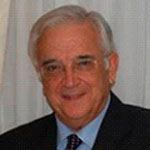 Fernando Davara Rodríguez
Profesor
Professor
Doctor en Ingeniería Informática por la Universidad Pontificia de Salamanca. Licenciado en Ciencias Físicas por la Universidad de Valladolid. Licenciado en Enseñanza Superior Militar por la Academia General Militar y Academia de Artillería. Es experto en Ciberseguridad, Seguridad y Defensa, Inteligencia, Inteligencia Económica e Inteligencia de Fuentes Abiertas, Geomática y GeoInteligencia y Gestión de crisis.
Su actividad docente se centra en el ámbito de Seguridad y Defensa. Asimismo, también cuenta con experiencia profesional como Director de la European Union Satellite Center; General de Brigada ® de Artillería en el Ministerio de Defensa. Los últimos destinos en actividad: Director del Centro de Satélites de la Unión Europea (EUSC) (1999 a 2005) y Jefe Operativo Español del Programa y Sistema de Observación Espacial Helios (1987 a 1999); Rector de la Sociedad de Estudios Internacionales (SEI); Director y Patrono de la Fundación FUNCOAS para la transferencia de conocimiento de AMETIC; Miembro del Consejo Asesor de Clúster TIC de Seguridad y Confianza de la Comunidad de Madrid; Presidente de Asociación Vertidos Cero.
Actualmente, Presidente de la Fundación ESPAÑA DIGITAL, Miembro y Secretario del Consejo Asesor del Clúster de Ciberseguridad de Madrid, Miembro del Consejo Asesor del IGFS (Foro de la Gobernanza de Internet en España), Vicepresidente de APIC (Asociación para la Protección de las Infraestructuras Críticas), Académico correspondiente de la Academia de la Diplomacia y miembro del Consejo Editorial de la revista Seguridad Global del Instituto Choiseul España y de la revista electrónica Tendencias21.
Fernando Davara Rodríguez
Profesor
Professor
Doctor en Ingeniería Informática por la Universidad Pontificia de Salamanca. Licenciado en Ciencias Físicas por la Universidad de Valladolid. Licenciado en Enseñanza Superior Militar por la Academia General Militar y Academia de Artillería. Es experto en Ciberseguridad, Seguridad y Defensa, Inteligencia, Inteligencia Económica e Inteligencia de Fuentes Abiertas, Geomática y GeoInteligencia y Gestión de crisis.
Su actividad docente se centra en el ámbito de Seguridad y Defensa. Asimismo, también cuenta con experiencia profesional como Director de la European Union Satellite Center; General de Brigada ® de Artillería en el Ministerio de Defensa. Los últimos destinos en actividad: Director del Centro de Satélites de la Unión Europea (EUSC) (1999 a 2005) y Jefe Operativo Español del Programa y Sistema de Observación Espacial Helios (1987 a 1999); Rector de la Sociedad de Estudios Internacionales (SEI); Director y Patrono de la Fundación FUNCOAS para la transferencia de conocimiento de AMETIC; Miembro del Consejo Asesor de Clúster TIC de Seguridad y Confianza de la Comunidad de Madrid; Presidente de Asociación Vertidos Cero.
Actualmente, Presidente de la Fundación ESPAÑA DIGITAL, Miembro y Secretario del Consejo Asesor del Clúster de Ciberseguridad de Madrid, Miembro del Consejo Asesor del IGFS (Foro de la Gobernanza de Internet en España), Vicepresidente de APIC (Asociación para la Protección de las Infraestructuras Críticas), Académico correspondiente de la Academia de la Diplomacia y miembro del Consejo Editorial de la revista Seguridad Global del Instituto Choiseul España y de la revista electrónica Tendencias21.
 Víctor de Gregorio Alcaide
Profesor
Professor
Licenciado en Derecho por la Universidad Europea de Madrid. Licenciado en Ciencias del Trabajo por la Universitat Oberta de Catalunya. Licenciado en Ciencias Políticas por la Universidad Complutense de Madrid. Licenciado en Sociología por la Universidad Complutense de Madrid. Máster Universitario en derecho Empresarial por la Universidad Nebrija. Certificado del periodo de Docencia de Doctorado en Ciencia Políticas y de la Administración en el programa de Doctorado de los Procesos Políticos en la Unión Europea y Europa de este en la Universidad Nacional de Educación a Distancia. Doctorando en Derecho, en la Escuela Internacional de Doctorado de la Universidad de Castilla la Mancha, en Derecho Penal; Blanqueo de capitales y Compliance.
Abogado en ejercicio profesional desde el año 2010. Socio fundador de SLEY Abogados. Áreas de trabajo profesional: Derecho Administrativo, Derecho Penal y Penal Económico, Derecho Mercantil y Concursal. Miembro del Ilustre Colegio de Abogados de Madrid.
Víctor de Gregorio Alcaide
Profesor
Professor
Licenciado en Derecho por la Universidad Europea de Madrid. Licenciado en Ciencias del Trabajo por la Universitat Oberta de Catalunya. Licenciado en Ciencias Políticas por la Universidad Complutense de Madrid. Licenciado en Sociología por la Universidad Complutense de Madrid. Máster Universitario en derecho Empresarial por la Universidad Nebrija. Certificado del periodo de Docencia de Doctorado en Ciencia Políticas y de la Administración en el programa de Doctorado de los Procesos Políticos en la Unión Europea y Europa de este en la Universidad Nacional de Educación a Distancia. Doctorando en Derecho, en la Escuela Internacional de Doctorado de la Universidad de Castilla la Mancha, en Derecho Penal; Blanqueo de capitales y Compliance.
Abogado en ejercicio profesional desde el año 2010. Socio fundador de SLEY Abogados. Áreas de trabajo profesional: Derecho Administrativo, Derecho Penal y Penal Económico, Derecho Mercantil y Concursal. Miembro del Ilustre Colegio de Abogados de Madrid.
 Sebastián Del Rey Barba
Profesor
Professor
Doctor en Derecho Civil por la Universidad de Sevilla (sobresaliente Cum Laude). Licenciado en Derecho por la Universidad de Córdoba. Graduado del Programa de Alta Dirección por la Universidad de Navarra- IESE Business School. Director RSC Colegio de Registradores de España. Es experto en la Calificación registral de las cláusulas abusivas en los préstamos hipotecarios.
Su actividad docente se centra en Derecho Hipotecario y Derecho Mercantil. Ha impartido docencia de grado y postgrado en la Universidad Internacional de Cataluña. Cuenta con experiencia profesional como Director de la Academia de Preparación de Oposiciones a Registros de Cataluña; Registrador en Comisión de Servicios en Dirección General de los Registros y el Notariado; Registrador de la Propiedad y Mercantil; Vocal de Tribunal Arbitral de Barcelona. Actualmente, es Registrador de la Propiedad.
Sebastián Del Rey Barba
Profesor
Professor
Doctor en Derecho Civil por la Universidad de Sevilla (sobresaliente Cum Laude). Licenciado en Derecho por la Universidad de Córdoba. Graduado del Programa de Alta Dirección por la Universidad de Navarra- IESE Business School. Director RSC Colegio de Registradores de España. Es experto en la Calificación registral de las cláusulas abusivas en los préstamos hipotecarios.
Su actividad docente se centra en Derecho Hipotecario y Derecho Mercantil. Ha impartido docencia de grado y postgrado en la Universidad Internacional de Cataluña. Cuenta con experiencia profesional como Director de la Academia de Preparación de Oposiciones a Registros de Cataluña; Registrador en Comisión de Servicios en Dirección General de los Registros y el Notariado; Registrador de la Propiedad y Mercantil; Vocal de Tribunal Arbitral de Barcelona. Actualmente, es Registrador de la Propiedad.
 Fernando Díez Estella
Profesor
Professor
Doctor en Derecho Mercantil por la Universidad Autónoma de Madrid. Licenciado en Derecho y en Ciencias Económicas y Empresariales por la Universidad Pontificia de Comillas. Visiting Researcher en la Harvard Law School.
Imparte docencia en Cursos de Postgrado en la Universidad Villanueva, el Centro de Estudios Garrigues, la Universidad Carlos III de Madrid y la Universidad Nebrija.
Su labor investigadora se desarrolla en el ámbito del Derecho y la Economía de la Competencia, la innovación docente y el Derecho de Sociedades. Ha publicado dos monografías y medio centenar de artículos de investigación y colaboración en obras colectivas. Ha impartido cursos y conferencias en diversas Universidades españolas y extranjeras (Ámsterdam, Londres, Santiago de Guayaquil, Quito, Viena, etc). Miembro investigador de proyectos en la Universidad CEU San Pablo sobre lucha contra los cárteles económicos y responsabilidad de administradores. Tiene reconocido un sexenio de investigación en el año 2019.
Ha obtenido el Premio CEF de Estudios Jurídicos en la Modalidad de Derecho Mercantil, en el año 2015, así como diversos accésit y reconocimientos de otras instituciones.
Pertenece a la Asociación Española para la Defensa de la Competencia y es Vicepresidente de la Sección de Derecho de la Competencia del ICAM (Ilustre Colegio de Abogados de Madrid). Académico Correspondiente de la Real Academia de Jurisprudencia y Legislación.
Fernando Díez Estella
Profesor
Professor
Doctor en Derecho Mercantil por la Universidad Autónoma de Madrid. Licenciado en Derecho y en Ciencias Económicas y Empresariales por la Universidad Pontificia de Comillas. Visiting Researcher en la Harvard Law School.
Imparte docencia en Cursos de Postgrado en la Universidad Villanueva, el Centro de Estudios Garrigues, la Universidad Carlos III de Madrid y la Universidad Nebrija.
Su labor investigadora se desarrolla en el ámbito del Derecho y la Economía de la Competencia, la innovación docente y el Derecho de Sociedades. Ha publicado dos monografías y medio centenar de artículos de investigación y colaboración en obras colectivas. Ha impartido cursos y conferencias en diversas Universidades españolas y extranjeras (Ámsterdam, Londres, Santiago de Guayaquil, Quito, Viena, etc). Miembro investigador de proyectos en la Universidad CEU San Pablo sobre lucha contra los cárteles económicos y responsabilidad de administradores. Tiene reconocido un sexenio de investigación en el año 2019.
Ha obtenido el Premio CEF de Estudios Jurídicos en la Modalidad de Derecho Mercantil, en el año 2015, así como diversos accésit y reconocimientos de otras instituciones.
Pertenece a la Asociación Española para la Defensa de la Competencia y es Vicepresidente de la Sección de Derecho de la Competencia del ICAM (Ilustre Colegio de Abogados de Madrid). Académico Correspondiente de la Real Academia de Jurisprudencia y Legislación.
 Geoffrey Ditta
Profesor
Professor
Doctor en Ciencias Sociales por la Universidad Luminière Lyon 2. Máster en Ciencias Políticas y Gobierno por la Universidad Autónoma Metropolitana. Máster en Gestión Económica por el IAE FRANCE- Ecoles Universitaires de Management. Ha sido candidato para investigar como Doctor en Naciones Unidas. En experto en internacionalización de Empresas.
En el ámbito universitario, ha ostentado cargos de gestión, como Director del Máster en Internacionalización de Empresas. También cuenta con experiencia como International Banker BNP Paribas; Manager Finance Control; International Business Developer VIE.
Geoffrey Ditta
Profesor
Professor
Doctor en Ciencias Sociales por la Universidad Luminière Lyon 2. Máster en Ciencias Políticas y Gobierno por la Universidad Autónoma Metropolitana. Máster en Gestión Económica por el IAE FRANCE- Ecoles Universitaires de Management. Ha sido candidato para investigar como Doctor en Naciones Unidas. En experto en internacionalización de Empresas.
En el ámbito universitario, ha ostentado cargos de gestión, como Director del Máster en Internacionalización de Empresas. También cuenta con experiencia como International Banker BNP Paribas; Manager Finance Control; International Business Developer VIE.
 David Docal Gil
Profesor
Professor
Doctor en Derecho por la Universidad Rey Juan Carlos. Licenciado en Ciencias del Trabajo. Diplomado en Estudios Avanzados. Investigador en materia de grupos urbanos violentos. Es experto en Tribus Urbanas y Participación Política. Su actividad docente se centra sobre Tribus Urbanas en la sociedad civil, sindicatos, políticas, escuelas. Actualmente, Presidente del Centro de Estudios e Iniciativas sobre Discriminación y Violencia CEIDIV, destinado a formar en la prevención de la violencia urbana, además de dirigir trabajos de investigación en este sentido, así como, la redacción de artículos de opinión sobre este fenómeno. Colaborador del Informe RAXEN.
David Docal Gil
Profesor
Professor
Doctor en Derecho por la Universidad Rey Juan Carlos. Licenciado en Ciencias del Trabajo. Diplomado en Estudios Avanzados. Investigador en materia de grupos urbanos violentos. Es experto en Tribus Urbanas y Participación Política. Su actividad docente se centra sobre Tribus Urbanas en la sociedad civil, sindicatos, políticas, escuelas. Actualmente, Presidente del Centro de Estudios e Iniciativas sobre Discriminación y Violencia CEIDIV, destinado a formar en la prevención de la violencia urbana, además de dirigir trabajos de investigación en este sentido, así como, la redacción de artículos de opinión sobre este fenómeno. Colaborador del Informe RAXEN.
 Carlos Espaliú Berdud
Profesor
Professor
Doctor en Derecho Internacional público por la Universidad de Córdoba, con una tesis sobre el arreglo pacífico de las controversias internacionales titulada: "Desarrollos jurisprudenciales y práctica reciente en la jurisdicción contenciosa de la Corte Internacional de Justicia” (sobresaliente Cum Laude por unanimidad). Licenciado en Derecho por la misma universidad. Tiene reconocido dos sexenios estatales y dos autonómicos.
Ejerció funciones docentes e investigadoras en la Universidad de Navarra, de 1998 a 2000. En su último año en la Universidad de Navarra ocupó el cargo de Secretario del Instituto de Derechos Humanos de esa universidad.
Fue Letrado de la Corte Internacional de Justicia en La Haya, y fue elegido representante del Secretario del Tribunal en el Comité de Conciliación del personal en la Secretaría de la Corte Internacional de Justicia
Ha publicado alrededor de 30 artículos indexados en prestigiosas revistas sobre arreglo pacífico de controversias, uso de la fuerza en el Derecho Internacional, derecho de los tratados, defensa europea, ciudadanía europea, etc.; así como 3 libros y unos 20 capítulos de libro sobre esas cuestiones. Ha formado parte y dirigido equipos de investigación con proyectos.
Carlos Espaliú Berdud
Profesor
Professor
Doctor en Derecho Internacional público por la Universidad de Córdoba, con una tesis sobre el arreglo pacífico de las controversias internacionales titulada: "Desarrollos jurisprudenciales y práctica reciente en la jurisdicción contenciosa de la Corte Internacional de Justicia” (sobresaliente Cum Laude por unanimidad). Licenciado en Derecho por la misma universidad. Tiene reconocido dos sexenios estatales y dos autonómicos.
Ejerció funciones docentes e investigadoras en la Universidad de Navarra, de 1998 a 2000. En su último año en la Universidad de Navarra ocupó el cargo de Secretario del Instituto de Derechos Humanos de esa universidad.
Fue Letrado de la Corte Internacional de Justicia en La Haya, y fue elegido representante del Secretario del Tribunal en el Comité de Conciliación del personal en la Secretaría de la Corte Internacional de Justicia
Ha publicado alrededor de 30 artículos indexados en prestigiosas revistas sobre arreglo pacífico de controversias, uso de la fuerza en el Derecho Internacional, derecho de los tratados, defensa europea, ciudadanía europea, etc.; así como 3 libros y unos 20 capítulos de libro sobre esas cuestiones. Ha formado parte y dirigido equipos de investigación con proyectos.
 Cristina Fernández Herrero
Profesora
Professor
Licenciada en Derecho por la Universidad Autónoma de Madrid. Abogada en ejercicio desde 1991. Es especialista en Derecho de Familia y Sucesiones y Derecho Civil. Trabaja en el Estudio Legal Vallehermoso S.L., siendo socio fundador de dicho despacho. Ha trabajado, durante los años 1993-1994, en el despacho Cartwirgt Law office, en San Francisco (EEUU), despacho eminentemente procesalista.
Miembro del Ilustre Colegio de Abogados de Madrid y miembro del Elenco Rotal y miembro de A.E.A.F.A.
Cristina Fernández Herrero
Profesora
Professor
Licenciada en Derecho por la Universidad Autónoma de Madrid. Abogada en ejercicio desde 1991. Es especialista en Derecho de Familia y Sucesiones y Derecho Civil. Trabaja en el Estudio Legal Vallehermoso S.L., siendo socio fundador de dicho despacho. Ha trabajado, durante los años 1993-1994, en el despacho Cartwirgt Law office, en San Francisco (EEUU), despacho eminentemente procesalista.
Miembro del Ilustre Colegio de Abogados de Madrid y miembro del Elenco Rotal y miembro de A.E.A.F.A.
 Elena Fernández Ruiz
Profesora
Professor
Doctora en Derecho por la Universidad de Valencia. Licenciada en Derecho por la Universidad de Valencia. Postgrado en mediación, responsabilidad civil y ejercicio de la función jurisdiccional civil.
Letrada de la Administración de Justicia en excedencia. Es especialista en responsabilidad civil, intereses procesales y ejecución hipotecaria. Ha trabajado en diferentes Juzgados, de las jurisdicciones civiles y penales desde 2003 hasta 2019.
Su actividad docente se centra en el ámbito del derecho civil y la mediación. Ha impartido docencia en Cursos de Grado y Másteres Universitarios en el Centro de Estudios Judiciales, la Universidad Cardenal Herrera CEU, la Universidad Internacional de Valencia y la Universidad de Nebrija. Colaboradora en la obra BROCÁ MAJADA CORBAL.
Elena Fernández Ruiz
Profesora
Professor
Doctora en Derecho por la Universidad de Valencia. Licenciada en Derecho por la Universidad de Valencia. Postgrado en mediación, responsabilidad civil y ejercicio de la función jurisdiccional civil.
Letrada de la Administración de Justicia en excedencia. Es especialista en responsabilidad civil, intereses procesales y ejecución hipotecaria. Ha trabajado en diferentes Juzgados, de las jurisdicciones civiles y penales desde 2003 hasta 2019.
Su actividad docente se centra en el ámbito del derecho civil y la mediación. Ha impartido docencia en Cursos de Grado y Másteres Universitarios en el Centro de Estudios Judiciales, la Universidad Cardenal Herrera CEU, la Universidad Internacional de Valencia y la Universidad de Nebrija. Colaboradora en la obra BROCÁ MAJADA CORBAL.
 Marlene Fonseca de Freitas
Profesora
Professor
Licenciada en Administracion de Empresas y máster en Gestion Estratégica. Posee la acreditación pedagógica oficial de formador de formadores. Su perfil profesional incluye 5 años de experiencia como consultora y técnica de investigación en el ámbito universitario. Ha sido, además, docente en las áreas de Gestion Empresarial, Economía, Análisis Financiero y Turismo.
En la empresa privada, la profesora Marlene Fonseca ha ejercido de gestora y consultora en instituciones de prestigio tales como el Banco Comercial Portugués y el Instituto de Desarrollo de Negocios. Finalmente, ha ejercido, en el sector público y durante varios años, funciones de auditoría y consultoría en varias instituciones de gobierno tales como el Servicio Regional de Protec ción Civil Portugués y la Vicepresidencia del Gobierno Regional de Madeira.
Marlene Fonseca de Freitas
Profesora
Professor
Licenciada en Administracion de Empresas y máster en Gestion Estratégica. Posee la acreditación pedagógica oficial de formador de formadores. Su perfil profesional incluye 5 años de experiencia como consultora y técnica de investigación en el ámbito universitario. Ha sido, además, docente en las áreas de Gestion Empresarial, Economía, Análisis Financiero y Turismo.
En la empresa privada, la profesora Marlene Fonseca ha ejercido de gestora y consultora en instituciones de prestigio tales como el Banco Comercial Portugués y el Instituto de Desarrollo de Negocios. Finalmente, ha ejercido, en el sector público y durante varios años, funciones de auditoría y consultoría en varias instituciones de gobierno tales como el Servicio Regional de Protec ción Civil Portugués y la Vicepresidencia del Gobierno Regional de Madeira.
 Luis Armando García Segura
Profesor
Professor
Doctor en Derecho por la Universidad Nebrija (sobresaliente Cum Laude). Es experto en derecho de las nuevas tecnologías, privacidad y protección de datos.
Su labor investigadora y docente se desarrolla fundamentalmente en el ámbito del derecho de las nuevas tecnologías, protección de datos, ciberseguridad, derechos humanos y gestión de despachos de abogados. Es autor de varias obras, entre las que destaca “Cyberspace: risks and benefits for society (2017)” y “Diseño, creación y administración de un despacho de Abogados (2016)”, la cual cuenta con un prólogo de Antonio Garrigues Walker.
Ha impartido docencia en el Grado en Derecho y los másteres universitarios de acceso a la abogacía y derecho empresarial en la Universidad Nebrija, así como en el máster de propiedad intelectual de la Universidad Internacional de la Rioja (UNIR).
En el ámbito universitario, ha ostentado diversos cargos de gestión, como Coordinador académico del Grado en Derecho online, Director del máster universitario en derecho empresarial. Actualmente, Director del máster universitario en protección de datos y seguridad, así como Coordinador de la cátedra global Nebrija-Santander en gestión de riesgos y conflictos.
Asimismo, también cuenta con experiencia profesional como abogado en su propio despacho y como asesor en materia de protección de datos, obteniendo la certificación de Certified Data Privacy Professional (CDPP) de ISMS Forum en junio 2020.
Luis Armando García Segura
Profesor
Professor
Doctor en Derecho por la Universidad Nebrija (sobresaliente Cum Laude). Es experto en derecho de las nuevas tecnologías, privacidad y protección de datos.
Su labor investigadora y docente se desarrolla fundamentalmente en el ámbito del derecho de las nuevas tecnologías, protección de datos, ciberseguridad, derechos humanos y gestión de despachos de abogados. Es autor de varias obras, entre las que destaca “Cyberspace: risks and benefits for society (2017)” y “Diseño, creación y administración de un despacho de Abogados (2016)”, la cual cuenta con un prólogo de Antonio Garrigues Walker.
Ha impartido docencia en el Grado en Derecho y los másteres universitarios de acceso a la abogacía y derecho empresarial en la Universidad Nebrija, así como en el máster de propiedad intelectual de la Universidad Internacional de la Rioja (UNIR).
En el ámbito universitario, ha ostentado diversos cargos de gestión, como Coordinador académico del Grado en Derecho online, Director del máster universitario en derecho empresarial. Actualmente, Director del máster universitario en protección de datos y seguridad, así como Coordinador de la cátedra global Nebrija-Santander en gestión de riesgos y conflictos.
Asimismo, también cuenta con experiencia profesional como abogado en su propio despacho y como asesor en materia de protección de datos, obteniendo la certificación de Certified Data Privacy Professional (CDPP) de ISMS Forum en junio 2020.
 Olivia García de Velasco
Profesora
Professor
Doctora en Psicología por la Universidad Complutense de Madrid. Máster en Gestión de Recursos Humanos por la Universidad Complutense de Madrid y en Salud Mental por la Universidad a Distancia de Madrid. Licenciada en Psicología por la Universidad Complutense de Madrid.
Su labor investigadora se desarrolla, sobre todo, en liderazgo y género, intervención social y asma como enfermedad psicosomática. Es experta en Salud Mental. Ha trabajado como responsable de Selección, Formación y Desarrollo en SEUR y como Directora Académica de Coaching Comercial. Actualmente, Psicóloga ejerciente en su Consulta Privada.
Olivia García de Velasco
Profesora
Professor
Doctora en Psicología por la Universidad Complutense de Madrid. Máster en Gestión de Recursos Humanos por la Universidad Complutense de Madrid y en Salud Mental por la Universidad a Distancia de Madrid. Licenciada en Psicología por la Universidad Complutense de Madrid.
Su labor investigadora se desarrolla, sobre todo, en liderazgo y género, intervención social y asma como enfermedad psicosomática. Es experta en Salud Mental. Ha trabajado como responsable de Selección, Formación y Desarrollo en SEUR y como Directora Académica de Coaching Comercial. Actualmente, Psicóloga ejerciente en su Consulta Privada.
 Marc Gil Van Beverem
Profesor
Professor
Licenciado en Derecho por la Universidad Autónoma de Madrid. Máster en Economía de los Servicios por la Universidad Autónoma de Madrid. Abogado en ejercicio perteneciente al Ilustre Colegio de Abogados de Madrid (ICAM). Es especialista en Derecho Administrativo y Contratación Pública. Trabaja en Van Beveren Abogados y Consultores Contratación Pública. Ha trabajado en distintos despachos de abogados a lo largo de su carrera profesional durante 15 años, entre los que se encuentran, Clarke Modet & Cº, Castro Sueiro y Varela y MLegal.
Su actividad docente se centra en el ámbito del Derecho Administrado. Ha impartido docencia en Cursos de Grados y Másteres Universitarios en la Universidad Nebrija.
Marc Gil Van Beverem
Profesor
Professor
Licenciado en Derecho por la Universidad Autónoma de Madrid. Máster en Economía de los Servicios por la Universidad Autónoma de Madrid. Abogado en ejercicio perteneciente al Ilustre Colegio de Abogados de Madrid (ICAM). Es especialista en Derecho Administrativo y Contratación Pública. Trabaja en Van Beveren Abogados y Consultores Contratación Pública. Ha trabajado en distintos despachos de abogados a lo largo de su carrera profesional durante 15 años, entre los que se encuentran, Clarke Modet & Cº, Castro Sueiro y Varela y MLegal.
Su actividad docente se centra en el ámbito del Derecho Administrado. Ha impartido docencia en Cursos de Grados y Másteres Universitarios en la Universidad Nebrija.
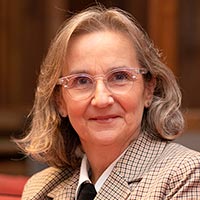 Mónica Goded Salto
Profesora
Professor
Doctora en Economía por la Universidad Complutense de Madrid. Licenciada en Ciencias Económicas y Empresariales por la Universidad Pontificia Comilla. Es experta en Economía y Desarrollo, Relaciones Internacionales y Organizaciones Supranacionales, con amplia trayectoria investigadora en las universidades San Pablo CEU, Deusto y Pontificia Comillas. En elación al ámbito docente ha impartido docencia en varias universidades como Universidad Nebrija, UNIR y Universidad Pontificia Comillas donde imparte, entre otras, las asignaturas de Organización Económica Internacional; Crecimiento Económico; Entorno Global de los Negocios; Economía Mundial y Enfoques Económicos para las Relaciones Internacionales. Actualmente, es Colaboradora de la Revista de Economía Mundial.
Mónica Goded Salto
Profesora
Professor
Doctora en Economía por la Universidad Complutense de Madrid. Licenciada en Ciencias Económicas y Empresariales por la Universidad Pontificia Comilla. Es experta en Economía y Desarrollo, Relaciones Internacionales y Organizaciones Supranacionales, con amplia trayectoria investigadora en las universidades San Pablo CEU, Deusto y Pontificia Comillas. En elación al ámbito docente ha impartido docencia en varias universidades como Universidad Nebrija, UNIR y Universidad Pontificia Comillas donde imparte, entre otras, las asignaturas de Organización Económica Internacional; Crecimiento Económico; Entorno Global de los Negocios; Economía Mundial y Enfoques Económicos para las Relaciones Internacionales. Actualmente, es Colaboradora de la Revista de Economía Mundial.
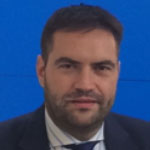 Daniel Gómez de Arriba
Profesor
Professor
Licenciado en Derecho y Graduado Superior en Ciencias Jurídicas por la Universidad Pontificia de Comillas. Programa executive de IE Law School de Start Up Lawyers. Abogado en ejercicio perteneciente al Ilustre Colegio de Abogados de Madrid (ICAM) con más de 25 años de experiencia en la práctica del Derecho, especializado en el área del Derecho Procesal, Mercantil y, en especial, en su vertiente del Derecho Concursal donde ha intervenido en más de 200 Concurso de acreedores. Asesorar de start ups y emprendedores. También ha desarrollado asesoramiento integral en: el sector deportes y entretenimiento.
Actualmente, Socio del Área de Reestructuraciones de ACT LEGAL- DA ESPAÑA. Best Lawyer 2020, 2021.
Daniel Gómez de Arriba
Profesor
Professor
Licenciado en Derecho y Graduado Superior en Ciencias Jurídicas por la Universidad Pontificia de Comillas. Programa executive de IE Law School de Start Up Lawyers. Abogado en ejercicio perteneciente al Ilustre Colegio de Abogados de Madrid (ICAM) con más de 25 años de experiencia en la práctica del Derecho, especializado en el área del Derecho Procesal, Mercantil y, en especial, en su vertiente del Derecho Concursal donde ha intervenido en más de 200 Concurso de acreedores. Asesorar de start ups y emprendedores. También ha desarrollado asesoramiento integral en: el sector deportes y entretenimiento.
Actualmente, Socio del Área de Reestructuraciones de ACT LEGAL- DA ESPAÑA. Best Lawyer 2020, 2021.
 Almudena Gómiz Macein
Profesora
Professor
Licenciada en Derecho por la Universidad Complutense de Madrid. Máster Oficial en Seguridad y Defensa por la Universidad NEBRIJA. Graduada Superior en Ciencias del Patrimonio Especialidad en Protección y Gestión por la Universidad SEK. Experta Universitaria en Fundaciones, aspectos jurídicos y fiscales, por la Universidad Nacional de Educación a Distancia. Doctoranda por la Universidad de Málaga.
Abogado en ejercicio perteneciente al Ilustre Colegio de Abogados de Madrid (ICAM). Socia fundadora de ESTUDIO JURIDICO OLIVARES, despacho especializado en responsabilidad civil y socia fundadora de ALARTE ABOGADOS despacho especializado y dedicado al sector del arte, donde actualmente desempeña su trabajo de abogado y directora de la firma.
Profesora, organizadora y asidua ponente en cursos de formación, charlas, congresos y jornadas impartidos en instituciones del sector cultural, museos, fundaciones y universidades. Publicación de artículos y de ponencias en materia de Derecho Civil y Derecho de la Cultura.
Almudena Gómiz Macein
Profesora
Professor
Licenciada en Derecho por la Universidad Complutense de Madrid. Máster Oficial en Seguridad y Defensa por la Universidad NEBRIJA. Graduada Superior en Ciencias del Patrimonio Especialidad en Protección y Gestión por la Universidad SEK. Experta Universitaria en Fundaciones, aspectos jurídicos y fiscales, por la Universidad Nacional de Educación a Distancia. Doctoranda por la Universidad de Málaga.
Abogado en ejercicio perteneciente al Ilustre Colegio de Abogados de Madrid (ICAM). Socia fundadora de ESTUDIO JURIDICO OLIVARES, despacho especializado en responsabilidad civil y socia fundadora de ALARTE ABOGADOS despacho especializado y dedicado al sector del arte, donde actualmente desempeña su trabajo de abogado y directora de la firma.
Profesora, organizadora y asidua ponente en cursos de formación, charlas, congresos y jornadas impartidos en instituciones del sector cultural, museos, fundaciones y universidades. Publicación de artículos y de ponencias en materia de Derecho Civil y Derecho de la Cultura.
 Mariano González García
Profesor
Professor
Doctor en Tecnología de la Computación e Ingeniería Ambiental por la Universidad Católica San Antonio de Murcia. Máster en Ciencias Ambientales por la Universidad Nacional de Educación a Distancia. Licenciado en Ingeniería Agrónoma con la especialidad en Exportaciones Agropecuarias. Licenciado en Ciencias Ambientales por la UNED. Es experto en Seguridad Laboral, Higiene Industrial y Ergonomía y Psicosociología Aplicada y en Ingeniería Ambiental. Su labor investigadora se concentra en la evaluación de la seguridad alimentaria y en la investigación ambiental y su impacto en diferentes ámbitos. Cuenta con publicaciones en libros y revistas de alto impacto a nivel internacional derivados de sus resultados científicos. Ha realizado estancias de investigación en Technical University of Denmark en el Departamento de Ingeniería Ambiental. Por otro lado, en relación con el ámbito docente ha impartido docencia en varias universidades e instituciones como la Junta de Castilla y León, UNIR, Conserjería de Educación, Universidad Isabel I de Castilla y Universidad Nebrija. Las materias que imparte se concentran en Higiene Industrial y Técnicas de Higiene Industrial. Ha ostentado cargos de gestión como la dirección del Máster en Prevención de Riesgos Laborales. Asimismo, cuenta con amplia experiencia profesional como Responsable de Calidad, Prevención de Riesgos Laborales y Medio Ambiente en construcción de diferentes obras singulares: Parques Eólicos, Piscifactorías, EDARs (Estaciones Depuradoras de Aguas Residuales), Captaciones de Agua, etc. en empresas como Global Energy Services, S.A., Proyectos Simienza, entre otras.
Mariano González García
Profesor
Professor
Doctor en Tecnología de la Computación e Ingeniería Ambiental por la Universidad Católica San Antonio de Murcia. Máster en Ciencias Ambientales por la Universidad Nacional de Educación a Distancia. Licenciado en Ingeniería Agrónoma con la especialidad en Exportaciones Agropecuarias. Licenciado en Ciencias Ambientales por la UNED. Es experto en Seguridad Laboral, Higiene Industrial y Ergonomía y Psicosociología Aplicada y en Ingeniería Ambiental. Su labor investigadora se concentra en la evaluación de la seguridad alimentaria y en la investigación ambiental y su impacto en diferentes ámbitos. Cuenta con publicaciones en libros y revistas de alto impacto a nivel internacional derivados de sus resultados científicos. Ha realizado estancias de investigación en Technical University of Denmark en el Departamento de Ingeniería Ambiental. Por otro lado, en relación con el ámbito docente ha impartido docencia en varias universidades e instituciones como la Junta de Castilla y León, UNIR, Conserjería de Educación, Universidad Isabel I de Castilla y Universidad Nebrija. Las materias que imparte se concentran en Higiene Industrial y Técnicas de Higiene Industrial. Ha ostentado cargos de gestión como la dirección del Máster en Prevención de Riesgos Laborales. Asimismo, cuenta con amplia experiencia profesional como Responsable de Calidad, Prevención de Riesgos Laborales y Medio Ambiente en construcción de diferentes obras singulares: Parques Eólicos, Piscifactorías, EDARs (Estaciones Depuradoras de Aguas Residuales), Captaciones de Agua, etc. en empresas como Global Energy Services, S.A., Proyectos Simienza, entre otras.
 Montserrat Hernández Martínez
Profesora
Professor
Licenciada en Derecho por la Universidad Complutense de Madrid. Opositora a la Carrera Judicial y Fiscal, y al Cuerpo de Letrados de la Administración de Justicia (2004-2016).
Abogado en ejercicio perteneciente al Ilustre Colegio de Abogados de Madrid (ICAM). Es especialista en responsabilidad civil y seguros. Trabaja en el despacho Blecualegal como abogada procesalista. Ha trabajado en el despacho Enter Abogados durante cuatro años en el ámbito de la responsabilidad civil y seguros, así como en el Derecho de Sucesiones.
Montserrat Hernández Martínez
Profesora
Professor
Licenciada en Derecho por la Universidad Complutense de Madrid. Opositora a la Carrera Judicial y Fiscal, y al Cuerpo de Letrados de la Administración de Justicia (2004-2016).
Abogado en ejercicio perteneciente al Ilustre Colegio de Abogados de Madrid (ICAM). Es especialista en responsabilidad civil y seguros. Trabaja en el despacho Blecualegal como abogada procesalista. Ha trabajado en el despacho Enter Abogados durante cuatro años en el ámbito de la responsabilidad civil y seguros, así como en el Derecho de Sucesiones.
 Inmaculada Herranz Perlado
Profesora
Professor
Licenciada en Derecho por la Universidad Pontificia de Comillas. Licenciada en Ciencias Políticas y Sociología por la Universidad Nacional de Educación a Distancia. Cursos de doctorado en Derecho Laboral en la Universidad Nacional de Educación a Distancia. Abogada de la división jurídico- fiscal de PwC, en la que ingresó en el año 2002, tras haber tenido una larga experiencia en otro despacho laboralista.
Es especialista en la puesta en práctica del derecho laboral, defensa letrada en actos de juicio oral, arbitrajes internacionales y posteriores recursos, negociación colectiva y relaciones laborales, así como en el asesoramiento diario a las empresas en materias complejas tanto a nivel nacional como internacional. Asimismo, cuenta con una gran experiencia en reestructuraciones de empresas siempre desde el ámbito jurídico laboral: negociación de convenios y pactos colectivos, ERES y ERTES, armonización de condiciones, reducciones salariales, etc. Ha sido ponente en diferentes foros en materias relacionadas con el derecho del trabajo, entre otras, responsabilidad de administradores y directivos, contratas, subcontratas y riesgo de cesión ilegal, conciliación de la vida familiar, movilidad geográfica internacional y reestructuraciones empresariales y concursos.
Inmaculada Herranz Perlado
Profesora
Professor
Licenciada en Derecho por la Universidad Pontificia de Comillas. Licenciada en Ciencias Políticas y Sociología por la Universidad Nacional de Educación a Distancia. Cursos de doctorado en Derecho Laboral en la Universidad Nacional de Educación a Distancia. Abogada de la división jurídico- fiscal de PwC, en la que ingresó en el año 2002, tras haber tenido una larga experiencia en otro despacho laboralista.
Es especialista en la puesta en práctica del derecho laboral, defensa letrada en actos de juicio oral, arbitrajes internacionales y posteriores recursos, negociación colectiva y relaciones laborales, así como en el asesoramiento diario a las empresas en materias complejas tanto a nivel nacional como internacional. Asimismo, cuenta con una gran experiencia en reestructuraciones de empresas siempre desde el ámbito jurídico laboral: negociación de convenios y pactos colectivos, ERES y ERTES, armonización de condiciones, reducciones salariales, etc. Ha sido ponente en diferentes foros en materias relacionadas con el derecho del trabajo, entre otras, responsabilidad de administradores y directivos, contratas, subcontratas y riesgo de cesión ilegal, conciliación de la vida familiar, movilidad geográfica internacional y reestructuraciones empresariales y concursos.
 Sara Izquierdo Pérez
Profesora
Professor
Licenciada en Derecho por la Universidad Autónoma de Madrid en el año 2000. Ingresó en el Cuerpo de Abogados del Estado en el año 2001.
Ha trabajado en distintos puestos en activo en la Abogacía General del Estado en el ámbito administrativo, tributario y concursal, destacando su puesto como Abogado del Estado - Jefe en el Servicio Jurídico Regional de la AEAT en Galicia (2004-2009) y Murcia (2011-2013) y la Secretaria de Estado de Hacienda entre 2014 y 2019.
Experto Nacional Destacado en el Servicio Jurídico de la Comisión europea, en la unidad especializada en contratación pública y recaudación de deudas (MAREC) entre 2019 y 2020. En la actualidad es Secretaria General de la Universidad Antonio de Nebrija.
Miembro de diversos tribunales de selección para el acceso a los Cuerpos de Letrados de la Administración de Justicia, Interventores del Estado, Ingenieros de Montes de Hacienda y Superior/Técnico de Gestión Catastral.
Ha impartido docencia en el Instituto de Estudios Fiscales, el Centro de Estudios Jurídicos y la Universidad Nebrija, en materias relacionadas con el Derecho administrativo, tributario y concursal.
Sara Izquierdo Pérez
Profesora
Professor
Licenciada en Derecho por la Universidad Autónoma de Madrid en el año 2000. Ingresó en el Cuerpo de Abogados del Estado en el año 2001.
Ha trabajado en distintos puestos en activo en la Abogacía General del Estado en el ámbito administrativo, tributario y concursal, destacando su puesto como Abogado del Estado - Jefe en el Servicio Jurídico Regional de la AEAT en Galicia (2004-2009) y Murcia (2011-2013) y la Secretaria de Estado de Hacienda entre 2014 y 2019.
Experto Nacional Destacado en el Servicio Jurídico de la Comisión europea, en la unidad especializada en contratación pública y recaudación de deudas (MAREC) entre 2019 y 2020. En la actualidad es Secretaria General de la Universidad Antonio de Nebrija.
Miembro de diversos tribunales de selección para el acceso a los Cuerpos de Letrados de la Administración de Justicia, Interventores del Estado, Ingenieros de Montes de Hacienda y Superior/Técnico de Gestión Catastral.
Ha impartido docencia en el Instituto de Estudios Fiscales, el Centro de Estudios Jurídicos y la Universidad Nebrija, en materias relacionadas con el Derecho administrativo, tributario y concursal.
 Giuseppe Kodjack VII Gangi Guillén
Profesor
Professor
Licenciado en Ciencias y Artes militares de la Academia Militar de Venezuela (Mención Honorífica 1996-2001 en la especialidad de Armamento). Máster en DIH, Logística Militar y Gestión de RRHH.
Su actividad docente se ha desarrollado como Instructor de Instructores en DDHH y en Uso Progresivo de la Fuerza certificado por la Inspectoría General de la Fuerza Armada. Asimismo, ha sido profesor de Derecho Internacional Humanitario de la Academia Militar de Venezuela, profesor de Doctrina Logística Militar en la Escuela de Logística del Ejército de Venezuela, y profesor de Logística de Combate en el Instituto Universitario Politécnico de la Fuerza Armada Nacional de Venezuela. También, ha sido desarrollador de contenidos de la Cátedra “Prisionero de Guerra” en el Instituto Universitario Politécnico de la Fuerza Armada Nacional de Venezuela. En materia de investigación, destaca su participación en trabajos sobre “Análisis del Conflicto Armado Colombo-venezolano; perspectivas históricas y sus desviaciones políticas” y “Élites Musulmanas en Latinoamérica y su influencia en el ámbito económico, político y social”.
Giuseppe Kodjack VII Gangi Guillén
Profesor
Professor
Licenciado en Ciencias y Artes militares de la Academia Militar de Venezuela (Mención Honorífica 1996-2001 en la especialidad de Armamento). Máster en DIH, Logística Militar y Gestión de RRHH.
Su actividad docente se ha desarrollado como Instructor de Instructores en DDHH y en Uso Progresivo de la Fuerza certificado por la Inspectoría General de la Fuerza Armada. Asimismo, ha sido profesor de Derecho Internacional Humanitario de la Academia Militar de Venezuela, profesor de Doctrina Logística Militar en la Escuela de Logística del Ejército de Venezuela, y profesor de Logística de Combate en el Instituto Universitario Politécnico de la Fuerza Armada Nacional de Venezuela. También, ha sido desarrollador de contenidos de la Cátedra “Prisionero de Guerra” en el Instituto Universitario Politécnico de la Fuerza Armada Nacional de Venezuela. En materia de investigación, destaca su participación en trabajos sobre “Análisis del Conflicto Armado Colombo-venezolano; perspectivas históricas y sus desviaciones políticas” y “Élites Musulmanas en Latinoamérica y su influencia en el ámbito económico, político y social”.
 Isabel Lacave Sanz
Profesora
Professor
Doctora en Derecho por la Universidad Camilo José Cela. Licenciada en Derecho por la Universidad Autónoma de Madrid. Es especialista en derecho Constitucional, Administrativo y Financiero.
Técnico de Recaudación en el Ayuntamiento de Valdemorillo, Madrid, desde el año 2012. Como personal del Ayuntamiento de Valdemorillo ha trabajado en otros departamentos desde el año 2001 como urbanismo, medio ambiente, secretaría general y servicios deportivos.
Su actividad docente se centra en el ámbito del Derecho Público. Ha impartido docencia para estudiantes del Grado en Derecho en la Universidad Nebrija, de Dirección y Administración de Empresas en la Universidad Camilo José Cela y de la Escuela Superior de Dirección y Administración de Empresas Deportivas.
Isabel Lacave Sanz
Profesora
Professor
Doctora en Derecho por la Universidad Camilo José Cela. Licenciada en Derecho por la Universidad Autónoma de Madrid. Es especialista en derecho Constitucional, Administrativo y Financiero.
Técnico de Recaudación en el Ayuntamiento de Valdemorillo, Madrid, desde el año 2012. Como personal del Ayuntamiento de Valdemorillo ha trabajado en otros departamentos desde el año 2001 como urbanismo, medio ambiente, secretaría general y servicios deportivos.
Su actividad docente se centra en el ámbito del Derecho Público. Ha impartido docencia para estudiantes del Grado en Derecho en la Universidad Nebrija, de Dirección y Administración de Empresas en la Universidad Camilo José Cela y de la Escuela Superior de Dirección y Administración de Empresas Deportivas.
 Javier Lacleta Michelena
Profesor
Professor
Licenciado en Derecho por la Universidad Complutense de Madrid. LL.M. en Derecho comunitario europeo por el Institut d’Études Européennes de Bruselas con Grande Distinction. Baccalauréat con mention.
Abogado en ejercicio desde 1998, especialista en derecho europeo comunitario, inmobiliario y concursal, ha ocupado el puesto de Director de la Asesoría jurídica de Martinsa-Fadesa durante el periodo de su declaración de concurso de acreedores que es el más grande de la historia de España. Socio de MAIO y abogado recomendado por CHAMBERS®.
Javier Lacleta Michelena
Profesor
Professor
Licenciado en Derecho por la Universidad Complutense de Madrid. LL.M. en Derecho comunitario europeo por el Institut d’Études Européennes de Bruselas con Grande Distinction. Baccalauréat con mention.
Abogado en ejercicio desde 1998, especialista en derecho europeo comunitario, inmobiliario y concursal, ha ocupado el puesto de Director de la Asesoría jurídica de Martinsa-Fadesa durante el periodo de su declaración de concurso de acreedores que es el más grande de la historia de España. Socio de MAIO y abogado recomendado por CHAMBERS®.
 Susana Laguna
Profesora
Professor
Doctora en Derecho por la Universidad Camilo José Cela. Licenciada en Psicología por la Universidad Complutense de Madrid. Titulada en Ciencias Criminológicas, Penales y Penitenciarias por el Instituto de Criminología de la Universidad Complutense de Madrid. Máster en Psicología Clínica, Legal y Forense por la misma universidad. Experta en Psicología Clínica e Intervención en Trauma por la Sociedad Española de Medicina Psicosomática.
Desde 2004 hasta 2017 ha impartido docencia en el departamento de Ciencias de la Seguridad (CISE) de la Universidad de Salamanca en materias relacionadas con la victimología y la psicología jurídica. En 2014 se incorpora como profesora en la Universidad a Distancia de Madrid y la Universidad Camilo José Cela donde continua en la actualidad. En 2019 se incorpora al claustro docente como profesora asociada en la Universidad Nebrija, en el Grado de Seguridad y el Grado en Derecho.
Ha trabajado como psicóloga y criminóloga en la Asociación Nacional de Víctimas de Delitos Violentos (ANVDV), en la Red de Oficinas judiciales de la Comunidad de Madrid, en Unidad de Atención a Víctimas (UAV) de IPJ CIENTIFICA y la Red de psicólogos especialistas en la atención a las víctimas de terrorismo del Ministerio del Interior. Desde 2019 ostenta el cargo de Secretaria general del Colegio Profesional de la Criminología de la Comunidad de Madrid.
Susana Laguna
Profesora
Professor
Doctora en Derecho por la Universidad Camilo José Cela. Licenciada en Psicología por la Universidad Complutense de Madrid. Titulada en Ciencias Criminológicas, Penales y Penitenciarias por el Instituto de Criminología de la Universidad Complutense de Madrid. Máster en Psicología Clínica, Legal y Forense por la misma universidad. Experta en Psicología Clínica e Intervención en Trauma por la Sociedad Española de Medicina Psicosomática.
Desde 2004 hasta 2017 ha impartido docencia en el departamento de Ciencias de la Seguridad (CISE) de la Universidad de Salamanca en materias relacionadas con la victimología y la psicología jurídica. En 2014 se incorpora como profesora en la Universidad a Distancia de Madrid y la Universidad Camilo José Cela donde continua en la actualidad. En 2019 se incorpora al claustro docente como profesora asociada en la Universidad Nebrija, en el Grado de Seguridad y el Grado en Derecho.
Ha trabajado como psicóloga y criminóloga en la Asociación Nacional de Víctimas de Delitos Violentos (ANVDV), en la Red de Oficinas judiciales de la Comunidad de Madrid, en Unidad de Atención a Víctimas (UAV) de IPJ CIENTIFICA y la Red de psicólogos especialistas en la atención a las víctimas de terrorismo del Ministerio del Interior. Desde 2019 ostenta el cargo de Secretaria general del Colegio Profesional de la Criminología de la Comunidad de Madrid.
 Gonzalo Lama Muñoz
Profesor
Professor
Licenciado en Derecho por la Universidad Complutense de Madrid. Máster en Ejercicio de la Abogacía por la Universidad de Salamanca.
Abogado en ejercicio perteneciente al Ilustre Colegio de Abogados de Madrid (ICAM). Especialista en Derecho Laboral y Protección de Datos. Trabaja en el departamento Jurídico de la Universidad Antonio de Nebrija desde el año 2015. Su actividad docente se centra en el ámbito de la Protección de Datos de Carácter Personal.
Gonzalo Lama Muñoz
Profesor
Professor
Licenciado en Derecho por la Universidad Complutense de Madrid. Máster en Ejercicio de la Abogacía por la Universidad de Salamanca.
Abogado en ejercicio perteneciente al Ilustre Colegio de Abogados de Madrid (ICAM). Especialista en Derecho Laboral y Protección de Datos. Trabaja en el departamento Jurídico de la Universidad Antonio de Nebrija desde el año 2015. Su actividad docente se centra en el ámbito de la Protección de Datos de Carácter Personal.
 Pedro Llorente Cachorro
Profesor
Professor
Licenciado en Derecho por la Universidad de Valladolid. Es experto en derecho social administrativo (actuaciones ante la Inspección de Trabajo y la Seguridad Social), relaciones laborales en el sector público y cumplimiento laboral y movilidad internacional. Actualmente, Consejero en Cuatrecasas.
Es miembro del Cuerpo Superior de Administradores Civiles del Estado, actualmente en excedencia. Desde el 2011 hasta el 2018, fue subsecretario del Ministerio de Empleo y Seguridad Social. Durante esa etapa, participó en la elaboración de los principales proyectos de reforma del mercado de trabajo, como la reforma laboral de 2012, y en diversas mesas de diálogo social sobre asuntos sociolaborales. Formó parte de varias comisiones, incluyendo la Comisión de Seguimiento de la Negociación Colectiva en las Empresas Públicas, y la Comisión Internacional para la salida del Reino Unido de la Unión Europea (Brexit).
También desempeñó la jefatura superior de todo el personal del Ministerio en materia de recursos humanos, y coordinó acciones en asuntos laborales ante la Unión Europea, la OCDE, la Organización Internacional del Trabajo (OIT) y el G20.
Anteriormente, desempeñó cargos de responsabilidad dentro del sector público, como Director General de gestión económica y compras de productos sanitarios y farmacéuticos del Servicio Madrileño de Salud, Director General de infraestructuras del Ministerio de Defensa, y Jefe del gabinete técnico del subsecretario de Economía y Hacienda.
Pedro Llorente Cachorro
Profesor
Professor
Licenciado en Derecho por la Universidad de Valladolid. Es experto en derecho social administrativo (actuaciones ante la Inspección de Trabajo y la Seguridad Social), relaciones laborales en el sector público y cumplimiento laboral y movilidad internacional. Actualmente, Consejero en Cuatrecasas.
Es miembro del Cuerpo Superior de Administradores Civiles del Estado, actualmente en excedencia. Desde el 2011 hasta el 2018, fue subsecretario del Ministerio de Empleo y Seguridad Social. Durante esa etapa, participó en la elaboración de los principales proyectos de reforma del mercado de trabajo, como la reforma laboral de 2012, y en diversas mesas de diálogo social sobre asuntos sociolaborales. Formó parte de varias comisiones, incluyendo la Comisión de Seguimiento de la Negociación Colectiva en las Empresas Públicas, y la Comisión Internacional para la salida del Reino Unido de la Unión Europea (Brexit).
También desempeñó la jefatura superior de todo el personal del Ministerio en materia de recursos humanos, y coordinó acciones en asuntos laborales ante la Unión Europea, la OCDE, la Organización Internacional del Trabajo (OIT) y el G20.
Anteriormente, desempeñó cargos de responsabilidad dentro del sector público, como Director General de gestión económica y compras de productos sanitarios y farmacéuticos del Servicio Madrileño de Salud, Director General de infraestructuras del Ministerio de Defensa, y Jefe del gabinete técnico del subsecretario de Economía y Hacienda.
 Begoña del Carmen Lluva Rivera
Profesora
Professor
Doctora en Derecho por la Universidad Nacional de Educación a Distancia. Profesora del área de Derecho y Seguridad. Procurador de los Tribunales y con despacho propio desde el año 1993. Mediadora Familiar, Civil, Mercantil y Tráfico. Su actividad docente se centra en el ámbito del Derecho Procesal Civil, Derecho de Familia y Derecho Anglosajón.
Begoña del Carmen Lluva Rivera
Profesora
Professor
Doctora en Derecho por la Universidad Nacional de Educación a Distancia. Profesora del área de Derecho y Seguridad. Procurador de los Tribunales y con despacho propio desde el año 1993. Mediadora Familiar, Civil, Mercantil y Tráfico. Su actividad docente se centra en el ámbito del Derecho Procesal Civil, Derecho de Familia y Derecho Anglosajón.
 María Dolores López Faraldos
Profesora
Professor
Licenciada en Derecho por la Universidad Complutense de Madrid. Diplomada como Abogado del S. Tribunal de La Rota de la Nunciatura Apostólica. Mediadora de la Fundación Notarial Signun, para la resolución Alternativa de Conflictos.
Abogado en ejercicio perteneciente al Ilustre Colegio de Abogados de Madrid (ICAM) desde 1983, momento en el que empieza su proyecto profesional y establece su propio Despacho en Madrid. Desde entonces viene prestando sus servicios profesionales tanto en el ámbito del Derecho privado para particulares, como en el ámbito de Derecho Público para Entidades públicas. Especializada en Derecho Civil, Derecho Penal y Derecho Procesal. Asesora Jurídica de pequeños y medianos empresarios de Madrid. Desde 2006, hasta la actualidad, Asesora Jurídica del Ayuntamiento de Tres Cantos en distintas Concejalías.
Integrante del Equipo de Mediadores de la Fundación Notarial Signum (FNS), a la que pertenece desde 2014. Ha participado en numerosos Proyectos de Mediación de la FNS y el CGPJ para la implantación y difusión de los ADRs en los Juzgados de la Comunidad de Madrid. En la actualidad es la Coordinadora del Proyecto de Mediación Penal que la FNS mantiene con la Audiencia Provincial de Madrid.
Su actividad como Jurista la ha desempeñado ante NNUU, asistiendo y participando en la 39, 40, 45 y 50, Sesiones de la Comisión sobre el Estado de la Mujer, en las NNUU. Nueva York, como representante y Presidenta de la Asociación Española de Mujeres Juristas.
María Dolores López Faraldos
Profesora
Professor
Licenciada en Derecho por la Universidad Complutense de Madrid. Diplomada como Abogado del S. Tribunal de La Rota de la Nunciatura Apostólica. Mediadora de la Fundación Notarial Signun, para la resolución Alternativa de Conflictos.
Abogado en ejercicio perteneciente al Ilustre Colegio de Abogados de Madrid (ICAM) desde 1983, momento en el que empieza su proyecto profesional y establece su propio Despacho en Madrid. Desde entonces viene prestando sus servicios profesionales tanto en el ámbito del Derecho privado para particulares, como en el ámbito de Derecho Público para Entidades públicas. Especializada en Derecho Civil, Derecho Penal y Derecho Procesal. Asesora Jurídica de pequeños y medianos empresarios de Madrid. Desde 2006, hasta la actualidad, Asesora Jurídica del Ayuntamiento de Tres Cantos en distintas Concejalías.
Integrante del Equipo de Mediadores de la Fundación Notarial Signum (FNS), a la que pertenece desde 2014. Ha participado en numerosos Proyectos de Mediación de la FNS y el CGPJ para la implantación y difusión de los ADRs en los Juzgados de la Comunidad de Madrid. En la actualidad es la Coordinadora del Proyecto de Mediación Penal que la FNS mantiene con la Audiencia Provincial de Madrid.
Su actividad como Jurista la ha desempeñado ante NNUU, asistiendo y participando en la 39, 40, 45 y 50, Sesiones de la Comisión sobre el Estado de la Mujer, en las NNUU. Nueva York, como representante y Presidenta de la Asociación Española de Mujeres Juristas.
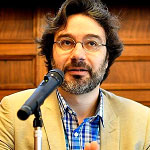 Carlos López Gómez
Profesor
Professor
Doctor en Historia por la Universidad Complutense de Madrid. Diploma de Estudios Avanzados y Magíster en Relaciones Internacionales y Comunicación por la Universidad Complutense de Madrid. Licenciado en Historia. Diplomado en estudios de la Unión Europea por la Escuela Diplomática de Madrid. Ha sido investigador invitado en el Instituto Universitario Europeo de Florencia y la Universidad Libre de Bruselas. y ha impartido cursos en la Universidad Internacional Menéndez Pelayo y para varios programas de universidades norteamericanas en España. Autor de publicaciones sobre historia de las Relaciones Internacionales y de la política exterior española. Miembro de la Comisión Española de Historia de las Relaciones Internacionales (CEHRI), del Grupo de Investigación sobre Historia de las Relaciones Internacionales de la Comunidad de Madrid (GHistRI) y de la Asociación de Historia Contemporánea (AHC).
Carlos López Gómez
Profesor
Professor
Doctor en Historia por la Universidad Complutense de Madrid. Diploma de Estudios Avanzados y Magíster en Relaciones Internacionales y Comunicación por la Universidad Complutense de Madrid. Licenciado en Historia. Diplomado en estudios de la Unión Europea por la Escuela Diplomática de Madrid. Ha sido investigador invitado en el Instituto Universitario Europeo de Florencia y la Universidad Libre de Bruselas. y ha impartido cursos en la Universidad Internacional Menéndez Pelayo y para varios programas de universidades norteamericanas en España. Autor de publicaciones sobre historia de las Relaciones Internacionales y de la política exterior española. Miembro de la Comisión Española de Historia de las Relaciones Internacionales (CEHRI), del Grupo de Investigación sobre Historia de las Relaciones Internacionales de la Comunidad de Madrid (GHistRI) y de la Asociación de Historia Contemporánea (AHC).
 Alejandro López Platero
Profesor
Professor
Licenciado en Derecho por la Universidad Complutense de Madrid. Ha realizado diferentes cursos de especialización impartidos por el Ilustre Colegio de Abogados de Madrid en materias de derecho público y derecho privado.
Su labor investigadora se desarrolla fundamentalmente en el ámbito del Derecho Penal siendo autor de diversos artículos en publicaciones jurídicas.
Tiene amplia experiencia docente en diferentes asignaturas del área jurídica, impartidas en licenciaturas, diplomaturas y grados, así como en postgrado, donde ha colaborado como profesor de Práctica Jurídica.
En el ámbito universitario, ha realizado diferentes tareas de gestión en Departamentos de Relaciones Externas y Admisión de alumnos.
Asimismo, también cuenta con experiencia profesional como abogado en diversos ámbitos de Derecho Penal, Urbanístico, Civil y Laboral, desarrollada en despachos de Madrid y Oviedo. En los años 2014 y 2018 recibió la Medalla de Honor, por su ejercicio profesional en el Turno de Oficio, otorgada por el Ilustre Colegio de Abogados de Madrid, del que es miembro desde el año 1995.
Alejandro López Platero
Profesor
Professor
Licenciado en Derecho por la Universidad Complutense de Madrid. Ha realizado diferentes cursos de especialización impartidos por el Ilustre Colegio de Abogados de Madrid en materias de derecho público y derecho privado.
Su labor investigadora se desarrolla fundamentalmente en el ámbito del Derecho Penal siendo autor de diversos artículos en publicaciones jurídicas.
Tiene amplia experiencia docente en diferentes asignaturas del área jurídica, impartidas en licenciaturas, diplomaturas y grados, así como en postgrado, donde ha colaborado como profesor de Práctica Jurídica.
En el ámbito universitario, ha realizado diferentes tareas de gestión en Departamentos de Relaciones Externas y Admisión de alumnos.
Asimismo, también cuenta con experiencia profesional como abogado en diversos ámbitos de Derecho Penal, Urbanístico, Civil y Laboral, desarrollada en despachos de Madrid y Oviedo. En los años 2014 y 2018 recibió la Medalla de Honor, por su ejercicio profesional en el Turno de Oficio, otorgada por el Ilustre Colegio de Abogados de Madrid, del que es miembro desde el año 1995.
 Carmen López-Jacoiste Díaz
Profesora
Professor
Licenciada en Derecho por la Universidad del País Vasco. Abogada especializada en asesoramiento de empresas familiares y entidades sin ánimo de lucro.
Ha trabajado en la Fundación Pumarejo como gerente en el ámbito socio sanitario, en CPL seguros y en varias entidades dedicadas a fines sociales y de desarrollo, llevando a cabo la gestión de proyectos europeos y fundraising para entidades de iniciativa social.
Su actividad docente se centra en el ámbito del Derecho Público, las instituciones del Estado y de la Unión Europea, los Derechos y Libertades amparados por la Constitución y la protección de los Derechos Fundamentales de la Unión.
Carmen López-Jacoiste Díaz
Profesora
Professor
Licenciada en Derecho por la Universidad del País Vasco. Abogada especializada en asesoramiento de empresas familiares y entidades sin ánimo de lucro.
Ha trabajado en la Fundación Pumarejo como gerente en el ámbito socio sanitario, en CPL seguros y en varias entidades dedicadas a fines sociales y de desarrollo, llevando a cabo la gestión de proyectos europeos y fundraising para entidades de iniciativa social.
Su actividad docente se centra en el ámbito del Derecho Público, las instituciones del Estado y de la Unión Europea, los Derechos y Libertades amparados por la Constitución y la protección de los Derechos Fundamentales de la Unión.
 Antonio Nicolás Marchal Escalona
Profesor
Professor
Doctor en Derecho por la Universidad Nacional de Educación a Distancia. Coronel de la Guardia Civil (25 años como profesor en la Institución). Es experto en Globalización, Fuerzas de Seguridad y Gestión de RRHH.
Su labor investigadora se desarrolla fundamentalmente en el ámbito de la Investigación Criminal, Seguridad Pública y Policía Judicial. Es autor autor/coautor de una quincena de obras relacionadas con dicha materia y es director de la Colección “Criminología y criminalística” (30 obras y 123 autores). Asimismo, es director autores Proyecto SIAPOL -(aplicativo de actuación policial)- Thomson Reuters Aranzadi.
Su actividad docente se centra en el ámbito de la Seguridad y Defensa. Ha impartido docencia en Cursos de Postgrado y Másteres Universitarios en Universidad Camilo José Cela, Universidad Antonio de Nebrija y en la Guardia Civil.
En el ámbito universitario, ha ostentado diferentes cargos de gestión, como Director Departamento Criminología y Seguridad Universidad Camilo José Cela (2014-2017).
Antonio Nicolás Marchal Escalona
Profesor
Professor
Doctor en Derecho por la Universidad Nacional de Educación a Distancia. Coronel de la Guardia Civil (25 años como profesor en la Institución). Es experto en Globalización, Fuerzas de Seguridad y Gestión de RRHH.
Su labor investigadora se desarrolla fundamentalmente en el ámbito de la Investigación Criminal, Seguridad Pública y Policía Judicial. Es autor autor/coautor de una quincena de obras relacionadas con dicha materia y es director de la Colección “Criminología y criminalística” (30 obras y 123 autores). Asimismo, es director autores Proyecto SIAPOL -(aplicativo de actuación policial)- Thomson Reuters Aranzadi.
Su actividad docente se centra en el ámbito de la Seguridad y Defensa. Ha impartido docencia en Cursos de Postgrado y Másteres Universitarios en Universidad Camilo José Cela, Universidad Antonio de Nebrija y en la Guardia Civil.
En el ámbito universitario, ha ostentado diferentes cargos de gestión, como Director Departamento Criminología y Seguridad Universidad Camilo José Cela (2014-2017).
 Andreea Marica
Profesora
Professor
Doctora Derecho por la Universidad Carlos III de Madrid (sobresaliente Cum Laude y mención Doctor Internacional). Experto Universitario en Crimen Organizado Transnacional y Seguridad por el Instituto Universitario Gutiérrez Mellado. Diploma de Estudios Avanzados por la Universidad de Castilla-La Mancha. Máster en Derecho Comunitario Universidad de Castilla-La Mancha. Máster en Derecho Público y Ciencias Penales por la Universidad de Craiova. Licenciada en Derecho. Ha realizado estancias de investigación predoctoral en la Universidad de Edimburgo, Escocia.
Su labor investigadora se desarrolla fundamentalmente en el ámbito del Derecho Penal Europeo, específicamente en materia de cooperación policial en la UE. Es autora de tres libros y varios artículos de especialidad.
Su actividad docente se centra en el ámbito del Derecho de la UE y Derecho Internacional Público. En el ámbito universitario, ostenta el cargo de Directora del Máster Universitario en Seguridad y Defensa.
Andreea Marica
Profesora
Professor
Doctora Derecho por la Universidad Carlos III de Madrid (sobresaliente Cum Laude y mención Doctor Internacional). Experto Universitario en Crimen Organizado Transnacional y Seguridad por el Instituto Universitario Gutiérrez Mellado. Diploma de Estudios Avanzados por la Universidad de Castilla-La Mancha. Máster en Derecho Comunitario Universidad de Castilla-La Mancha. Máster en Derecho Público y Ciencias Penales por la Universidad de Craiova. Licenciada en Derecho. Ha realizado estancias de investigación predoctoral en la Universidad de Edimburgo, Escocia.
Su labor investigadora se desarrolla fundamentalmente en el ámbito del Derecho Penal Europeo, específicamente en materia de cooperación policial en la UE. Es autora de tres libros y varios artículos de especialidad.
Su actividad docente se centra en el ámbito del Derecho de la UE y Derecho Internacional Público. En el ámbito universitario, ostenta el cargo de Directora del Máster Universitario en Seguridad y Defensa.
 Miguel Marinas Depasse
Profesor
Professor
Doctor en Ciencias Económicas por la Universidad Complutense de Madrid (sobresaliente Cum Laude). MBA HEC Hautes Études Commerciales, Paris.
Profesor Universitario y de Escuelas de Negocio, desde el año 2006. Economista del Servicio de Estudios, Cámara de Comercio de Madrid 1989-2015. Experto en comercio exterior. Consultor y asesor internacional de empresas en ejercicio. Miembro del Colegio de Economistas de Madrid.
Miguel Marinas Depasse
Profesor
Professor
Doctor en Ciencias Económicas por la Universidad Complutense de Madrid (sobresaliente Cum Laude). MBA HEC Hautes Études Commerciales, Paris.
Profesor Universitario y de Escuelas de Negocio, desde el año 2006. Economista del Servicio de Estudios, Cámara de Comercio de Madrid 1989-2015. Experto en comercio exterior. Consultor y asesor internacional de empresas en ejercicio. Miembro del Colegio de Economistas de Madrid.
 Teresa Martínez Díaz
Profesora
Professor
Licenciada en Derecho y Ciencias Económicas y Empresariales por la Universidad Pontificia Comillas. Máster en formación de profesorado por la Universidad San Pablo-CEU.
En el ámbito del ejercicio profesional, cuenta con experiencia en Chase Manhattan Bank (Oficina de Representación en España) Audihispana (Asesoría fiscal) Barclays Bank (Premier Banking).
Teresa Martínez Díaz
Profesora
Professor
Licenciada en Derecho y Ciencias Económicas y Empresariales por la Universidad Pontificia Comillas. Máster en formación de profesorado por la Universidad San Pablo-CEU.
En el ámbito del ejercicio profesional, cuenta con experiencia en Chase Manhattan Bank (Oficina de Representación en España) Audihispana (Asesoría fiscal) Barclays Bank (Premier Banking).
 Oscar Martínez Tapia
Profesor
Professor
Doctor en Ciencias Políticas por la Universidad Complutense de Madrid. Máster en Gobierno, Ciencias Políticas y Relaciones Internacionales. Es experto en Ciencias Políticas y Relaciones Internacionales. Ha realizado estancias de investigación en la Universidad de California, Irvine, Teaching Fellow and la Universidad de Harvard (USA).
Su labor investigadora se desarrolla fundamentalmente en el ámbito de la “Dimensión Centro-Periferia en los Partidos Nacionalistas de Cataluña y el País Vasco”. Es autor del libro “Los problemas no resueltos de la democracia Centro y Periferia en España”.
Su actividad docente se centra en el ámbito de las Ciencias Políticas y Relaciones Internacionales. Ha impartido docencia en Cursos de Postgrado y Másteres Universitarios en el Instituto de Empresa, Universidad Nebrija y en Suffolk University.
Asimismo, también cuenta con experiencia profesional como Decano de la Marbella International University Centre y Asesor de comunicación de la Secretaria de Estado de Comunicación.
Oscar Martínez Tapia
Profesor
Professor
Doctor en Ciencias Políticas por la Universidad Complutense de Madrid. Máster en Gobierno, Ciencias Políticas y Relaciones Internacionales. Es experto en Ciencias Políticas y Relaciones Internacionales. Ha realizado estancias de investigación en la Universidad de California, Irvine, Teaching Fellow and la Universidad de Harvard (USA).
Su labor investigadora se desarrolla fundamentalmente en el ámbito de la “Dimensión Centro-Periferia en los Partidos Nacionalistas de Cataluña y el País Vasco”. Es autor del libro “Los problemas no resueltos de la democracia Centro y Periferia en España”.
Su actividad docente se centra en el ámbito de las Ciencias Políticas y Relaciones Internacionales. Ha impartido docencia en Cursos de Postgrado y Másteres Universitarios en el Instituto de Empresa, Universidad Nebrija y en Suffolk University.
Asimismo, también cuenta con experiencia profesional como Decano de la Marbella International University Centre y Asesor de comunicación de la Secretaria de Estado de Comunicación.
 Paula Martínez-Echevarría Ozámiz
Profesora
Professor
Doctora en Derecho Civil por la Universidad de Córdoba (sobresaliente Cum Laude). Licenciada en Derecho y Diploma en relaciones internacionales por la Universidad Pontificia Comillas.
Abogada en ejercicio en el Despacho de abogados Martínez-Echevarría & Rivera, perteneciente al departamento de civil con especial dedicación en los asuntos de familia. Directora de gestión de calidad del Despacho.
En cuanto a la actividad docente imparte clases de civil, procesal civil y sistemas alternativos de resolución de conflictos.
Paula Martínez-Echevarría Ozámiz
Profesora
Professor
Doctora en Derecho Civil por la Universidad de Córdoba (sobresaliente Cum Laude). Licenciada en Derecho y Diploma en relaciones internacionales por la Universidad Pontificia Comillas.
Abogada en ejercicio en el Despacho de abogados Martínez-Echevarría & Rivera, perteneciente al departamento de civil con especial dedicación en los asuntos de familia. Directora de gestión de calidad del Despacho.
En cuanto a la actividad docente imparte clases de civil, procesal civil y sistemas alternativos de resolución de conflictos.
 José Merino Tapia
Profesor
Professor
Licenciado en Derecho por la Universidad Complutense de Madrid. Diploma de Estudios Avanzados por la Universidad Complutense de Madrid. Máster General de Práctica Jurídica por la Universidad Pontificia Comillas. Premio Extraordinario de Promoción. Actualmente, socio director del Estudio Legal GLOBALJURIST (Madrid). Letrado colegiado ejerciente en Madrid, formación específica en las áreas de Derecho Civil (Herencias, Testamentarias), Mercantil, Procesal y Contencioso-Administrativo. Experiencia procesal ante Juzgados y Tribunales de toda índole. Director de la Asesoría Jurídica del Colegio Oficial de Agentes de la Propiedad Inmobiliaria de Madrid y Asesor Jurídico de la Junta de Gobierno y de la Comisión de Deontología y Defensa Profesional del Colegio Oficial de Agentes de la Propiedad Inmobiliaria de Madrid.
José Merino Tapia
Profesor
Professor
Licenciado en Derecho por la Universidad Complutense de Madrid. Diploma de Estudios Avanzados por la Universidad Complutense de Madrid. Máster General de Práctica Jurídica por la Universidad Pontificia Comillas. Premio Extraordinario de Promoción. Actualmente, socio director del Estudio Legal GLOBALJURIST (Madrid). Letrado colegiado ejerciente en Madrid, formación específica en las áreas de Derecho Civil (Herencias, Testamentarias), Mercantil, Procesal y Contencioso-Administrativo. Experiencia procesal ante Juzgados y Tribunales de toda índole. Director de la Asesoría Jurídica del Colegio Oficial de Agentes de la Propiedad Inmobiliaria de Madrid y Asesor Jurídico de la Junta de Gobierno y de la Comisión de Deontología y Defensa Profesional del Colegio Oficial de Agentes de la Propiedad Inmobiliaria de Madrid.
 Lidia Moreno Blesa
Profesora
Professor
Doctora en Derecho por la Universidad Complutense de Madrid. Premio extraordinario de Licenciatura. Es experta en Derecho Internacional Privado, Derecho de la Unión Europea y Resolución Extrajudicial de Conflictos. Ha realizado estancias de investigación en la Vrije Universiteit Amsterdam (Holanda) desde enero a junio de 1996, en Florianópolis (Brasil) en noviembre de 2003, en Sofía (Bulgaria) de enero a febrero de 2005 y en Sofía y Varna (Bulgaria) en junio 2005.
En el ámbito universitario, ha ostentado cargos de gestión, como Directora de Departamento desde el 2004 hasta el 2010, responsable de investigación en el 2011-2012 y actualmente coordinadora del Máster Universitario en Derecho Internacional de la Universidad Complutense de Madrid. Asimismo, también cuenta con experiencia profesional en la empresa ENDESA, durante el año 1994, y también ha gestionado el Servicio de apoyo a la gestión del centro de intercambio de información de la Red Extrajudicial Europea en el 2002 y 2003.
Ha recibido el premio de Excelencia Docente otorgado por el Rector de la Universidad Complutense de Madrid en reconocimiento a la labor docente desarrollada durante el curso 2018-2019.
Lidia Moreno Blesa
Profesora
Professor
Doctora en Derecho por la Universidad Complutense de Madrid. Premio extraordinario de Licenciatura. Es experta en Derecho Internacional Privado, Derecho de la Unión Europea y Resolución Extrajudicial de Conflictos. Ha realizado estancias de investigación en la Vrije Universiteit Amsterdam (Holanda) desde enero a junio de 1996, en Florianópolis (Brasil) en noviembre de 2003, en Sofía (Bulgaria) de enero a febrero de 2005 y en Sofía y Varna (Bulgaria) en junio 2005.
En el ámbito universitario, ha ostentado cargos de gestión, como Directora de Departamento desde el 2004 hasta el 2010, responsable de investigación en el 2011-2012 y actualmente coordinadora del Máster Universitario en Derecho Internacional de la Universidad Complutense de Madrid. Asimismo, también cuenta con experiencia profesional en la empresa ENDESA, durante el año 1994, y también ha gestionado el Servicio de apoyo a la gestión del centro de intercambio de información de la Red Extrajudicial Europea en el 2002 y 2003.
Ha recibido el premio de Excelencia Docente otorgado por el Rector de la Universidad Complutense de Madrid en reconocimiento a la labor docente desarrollada durante el curso 2018-2019.
 Guillermo Murciano Pérez
Profesor
Professor
Licenciado en Ingeniería Industrial con la Especialidad de Estructuras e Instalaciones Industriales por la Universidad de León. Máster en Relaciones Laborales por Garrigues. Máster en Prevención de Riesgos Laborales por la Universidad Pontificia de Comillas. Máster en Gestión Integrada de Calidad y Medio Ambiente por la Universidad de León.
Especialista en el ámbito de los RR.HH. Desde el 2000 trabaja en DHL como gerente de negocios de RR.HH., salud y seguridad, y es Presidente y Socio Fundador de PRLINNOVACION, asociación que agrupa a más de 200 grandes empresas de España.
Su actividad docente se centra en el ámbito de las Relaciones Laborales, RR.HH. y Prevención de Riesgos Laborales. Ha impartido docencia en Cursos de Grado y Másteres Universitarios en el Centro de Estudios Garrigues, Universidad Europea de Madrid, Universidad Politécnica de Madrid, Universidad San Pablo CEU, Universidad Europea y Universidad Internacional de Valencia.
Guillermo Murciano Pérez
Profesor
Professor
Licenciado en Ingeniería Industrial con la Especialidad de Estructuras e Instalaciones Industriales por la Universidad de León. Máster en Relaciones Laborales por Garrigues. Máster en Prevención de Riesgos Laborales por la Universidad Pontificia de Comillas. Máster en Gestión Integrada de Calidad y Medio Ambiente por la Universidad de León.
Especialista en el ámbito de los RR.HH. Desde el 2000 trabaja en DHL como gerente de negocios de RR.HH., salud y seguridad, y es Presidente y Socio Fundador de PRLINNOVACION, asociación que agrupa a más de 200 grandes empresas de España.
Su actividad docente se centra en el ámbito de las Relaciones Laborales, RR.HH. y Prevención de Riesgos Laborales. Ha impartido docencia en Cursos de Grado y Másteres Universitarios en el Centro de Estudios Garrigues, Universidad Europea de Madrid, Universidad Politécnica de Madrid, Universidad San Pablo CEU, Universidad Europea y Universidad Internacional de Valencia.
 Tahina Ojeda Medina
Profesora
Professor
Doctora en Ciencias Políticas y Sociología por la Universidad Complutense de Madrid. Magíster en Cooperación Internacional y Máster en Estudios Contemporáneos de América Latina por la misma universidad. Licenciada en Estudios Internacionales y Abogada por la Universidad Central de Venezuela. Especialista en temas de cooperación Sur-Sur en América Latina, cooperación internacional para el desarrollo, regionalismos e integración regional. Forma parte del Grupo de Trabajo sobre Cooperación Sur-Sur y desarrollo en América Latina del Consejo Latinoamericano de Ciencias Sociales (CLACSO) y del Grupo de Investigación sobre Cooperación Sur-Sur e integraciones regionales de la Red Española de Estudios de Desarrollo (REEDES). Ha realizado consultorías para el Fondo de Población de Naciones Unidas en el área de cooperación Sur-Sur y formación para el personal de los Puntos Focales de dicho fondo. Ha sido responsable de cooperación internacional en instituciones públicas en Venezuela y ha participado en el diseño y ejecución de intervenciones de cooperación internacional en varios países latinoamericanos. Actualmente trabaja como investigadora y docente adscrita al IUDC-UCM.
Tahina Ojeda Medina
Profesora
Professor
Doctora en Ciencias Políticas y Sociología por la Universidad Complutense de Madrid. Magíster en Cooperación Internacional y Máster en Estudios Contemporáneos de América Latina por la misma universidad. Licenciada en Estudios Internacionales y Abogada por la Universidad Central de Venezuela. Especialista en temas de cooperación Sur-Sur en América Latina, cooperación internacional para el desarrollo, regionalismos e integración regional. Forma parte del Grupo de Trabajo sobre Cooperación Sur-Sur y desarrollo en América Latina del Consejo Latinoamericano de Ciencias Sociales (CLACSO) y del Grupo de Investigación sobre Cooperación Sur-Sur e integraciones regionales de la Red Española de Estudios de Desarrollo (REEDES). Ha realizado consultorías para el Fondo de Población de Naciones Unidas en el área de cooperación Sur-Sur y formación para el personal de los Puntos Focales de dicho fondo. Ha sido responsable de cooperación internacional en instituciones públicas en Venezuela y ha participado en el diseño y ejecución de intervenciones de cooperación internacional en varios países latinoamericanos. Actualmente trabaja como investigadora y docente adscrita al IUDC-UCM.
 Olalde Olalde López
Profesora
Professor
Licenciada en Derecho por la Universidad de Oviedo. Máster en Asesoría Jurídica para Empresas por la Universidad Pontificia Comillas. Es especialista en protección de datos, cumplimiento normativo, medios de pago, financiaciones sindicadas, trade finance, regulatorio bancario, factoring y confirming y derecho de los consumidores. Trabaja como Socia Directora en In Capita Abogados y Abogada en Secretaría General en Universidad Nebrija. Ha trabajado como analista renta fija BNP Paribas en Londres ; Letrada asesora en Bankinter, S.A.; Directora Asesoría Jurídica y Cumplimiento Normativo en American Insurance Group; Letrada Asesora Senior en Barclays Bank, S.A.; Responsable Asesoría Jurídica en Banco Santander, S.A.
Su actividad docente se centra en el ámbito de protección de datos, derecho bancario y regulatorio y derecho concursal.
Olalde Olalde López
Profesora
Professor
Licenciada en Derecho por la Universidad de Oviedo. Máster en Asesoría Jurídica para Empresas por la Universidad Pontificia Comillas. Es especialista en protección de datos, cumplimiento normativo, medios de pago, financiaciones sindicadas, trade finance, regulatorio bancario, factoring y confirming y derecho de los consumidores. Trabaja como Socia Directora en In Capita Abogados y Abogada en Secretaría General en Universidad Nebrija. Ha trabajado como analista renta fija BNP Paribas en Londres ; Letrada asesora en Bankinter, S.A.; Directora Asesoría Jurídica y Cumplimiento Normativo en American Insurance Group; Letrada Asesora Senior en Barclays Bank, S.A.; Responsable Asesoría Jurídica en Banco Santander, S.A.
Su actividad docente se centra en el ámbito de protección de datos, derecho bancario y regulatorio y derecho concursal.
 Mª Ángeles Palacios García
Profesora
Professor
Licenciada en Derecho por la Universidad de Salamanca. Máster en Seguridad Social y Derecho Laboral por el Centro de Estudios Financieros. Máster en Prevención de Riesgos Laborales por el Centro de Estudios Financieros. Máster en Prácticas Jurídicas y Procedimiento por el Centro de Estudios Financieros. Posee una amplia experiencia profesional como consultora y asesora en empresas y ejercicio de la abogacía (Experta en Dirección de Recursos Humanos, Derecho del Trabajo y Seguridad Social).
Mª Ángeles Palacios García
Profesora
Professor
Licenciada en Derecho por la Universidad de Salamanca. Máster en Seguridad Social y Derecho Laboral por el Centro de Estudios Financieros. Máster en Prevención de Riesgos Laborales por el Centro de Estudios Financieros. Máster en Prácticas Jurídicas y Procedimiento por el Centro de Estudios Financieros. Posee una amplia experiencia profesional como consultora y asesora en empresas y ejercicio de la abogacía (Experta en Dirección de Recursos Humanos, Derecho del Trabajo y Seguridad Social).
 Ana Isabel Páramo
Profesora
Professor
Licenciada en Derecho por la Universidad Pontificia Comillas y Letrada Asesora de Empresas por ICADE (E-1). Formación en comercio exterior (CEOE).
Experiencia en la tramitación de impagos en la zona OCDE en la Compañía Española de Seguros de Crédito a la Exportación (CESCE). De 1999 hasta 2019, analista de inteligencia y formadora en esta materia en el Ministerio de Defensa español. Durante los últimos diez años de este periodo ha diseñado e impartido actividades formativas para organizaciones vinculadas a la seguridad tanto en España como en el extranjero: Latinoamérica, África y Oriente Medio, sobre todo. Desde marzo de 2019, consultora y formadora en materia de inteligencia, con mayor especialización en la producción y el análisis de inteligencia.
Su actividad docente se centra en el ámbito de la seguridad y la inteligencia, tanto pública como privada. Ha impartido docencia en Cursos de Postgrado y Másteres Universitarios en ICADE, Universidad Autónoma de Madrid, Universidad Juan Carlos I en colaboración con la Universidad Carlos III, Universidad Católica de Murcia, INIR, Universidad Francisco de Vitoria, entre otras. Asimismo, también participa en diversos foros relacionados con la seguridad, la estrategia, la planificación y la inteligencia.
Ha recibido la Cruz al Mérito Militar y la Cruz al Mérito Naval, ambas con distintivo blanco, por su trayectoria profesional en el Ministerio de Defensa de España.
Ana Isabel Páramo
Profesora
Professor
Licenciada en Derecho por la Universidad Pontificia Comillas y Letrada Asesora de Empresas por ICADE (E-1). Formación en comercio exterior (CEOE).
Experiencia en la tramitación de impagos en la zona OCDE en la Compañía Española de Seguros de Crédito a la Exportación (CESCE). De 1999 hasta 2019, analista de inteligencia y formadora en esta materia en el Ministerio de Defensa español. Durante los últimos diez años de este periodo ha diseñado e impartido actividades formativas para organizaciones vinculadas a la seguridad tanto en España como en el extranjero: Latinoamérica, África y Oriente Medio, sobre todo. Desde marzo de 2019, consultora y formadora en materia de inteligencia, con mayor especialización en la producción y el análisis de inteligencia.
Su actividad docente se centra en el ámbito de la seguridad y la inteligencia, tanto pública como privada. Ha impartido docencia en Cursos de Postgrado y Másteres Universitarios en ICADE, Universidad Autónoma de Madrid, Universidad Juan Carlos I en colaboración con la Universidad Carlos III, Universidad Católica de Murcia, INIR, Universidad Francisco de Vitoria, entre otras. Asimismo, también participa en diversos foros relacionados con la seguridad, la estrategia, la planificación y la inteligencia.
Ha recibido la Cruz al Mérito Militar y la Cruz al Mérito Naval, ambas con distintivo blanco, por su trayectoria profesional en el Ministerio de Defensa de España.
 Jose Carlos Pedraza
Profesor
Professor
Licenciado en Derecho por la Universidad Complutense de Madrid. Escuela de Práctica Jurídica de la Universidad Complutense de Madrid.
Abogado en ejercicio desde 2003, Colegiado en el Ilustre Colegio de Abogados de Madrid. Trabaja en su propio despacho en el que comenzó en 2010. Ha trabajado en diversos despachos de abogados por cuenta ajena, con carácter previo a la apertura de su propia firma, destacando su desempeño desde 2005 a 2010 en la Corte Española de Arbitraje.
Su actividad docente se centra en el ámbito del Derecho Administrativo y Derecho Mercantil. Ha impartido docencia en Cursos de Postgrado y Másteres Universitarios en Universidad Nebrija, como de Máster de Prevención de Riesgos Laborales y el Máster de Acceso a la Abogacía, además del Grado en Derecho.
Jose Carlos Pedraza
Profesor
Professor
Licenciado en Derecho por la Universidad Complutense de Madrid. Escuela de Práctica Jurídica de la Universidad Complutense de Madrid.
Abogado en ejercicio desde 2003, Colegiado en el Ilustre Colegio de Abogados de Madrid. Trabaja en su propio despacho en el que comenzó en 2010. Ha trabajado en diversos despachos de abogados por cuenta ajena, con carácter previo a la apertura de su propia firma, destacando su desempeño desde 2005 a 2010 en la Corte Española de Arbitraje.
Su actividad docente se centra en el ámbito del Derecho Administrativo y Derecho Mercantil. Ha impartido docencia en Cursos de Postgrado y Másteres Universitarios en Universidad Nebrija, como de Máster de Prevención de Riesgos Laborales y el Máster de Acceso a la Abogacía, además del Grado en Derecho.
 María Peñarrubia Bañón
Profesora
Professor
Doctora Internacional en Estudios Europeos (Derecho) por la Universidad CEU San Pablo (sobresaliente Cum Laude por unanimidad). Licenciada en Derecho y en Ciencias Políticas y de la Administración por la Universidad CEU Cardenal-Herrera. Es experta en Unión Europea y Relaciones Internacionales. Ha realizado estancias de investigación en la Charles University, Praga (República Checa); Maastricht University, Maastricht (Países Bajos); Helsinki University, Helsinki (Finlandia); School of Business, Economics and Law-Gothenburg University, Gotemburgo, (Suecia); Institute for European Studies-Vrije Universiteit Brussels, Bruselas (Bélgica) y Facultad de Derecho de la Universidad Tecnológica de El Salvador (San Salvador, El Salvador).
Su labor investigadora se desarrolla fundamentalmente en el ámbito del Derecho de la Unión Europea, las Relaciones Internacionales, el Derecho constitucional comparado, la Ciencia Política, la Gobernanza y la Teoría de la Democracia. Su actividad docente se centra en el ámbito del Derecho de la Unión Europea, las Relaciones Internacionales, el Derecho Constitucional y la Ciencia Política. Ha impartido docencia en Másteres Universitarios en la Universidad CEU San Pablo y otras asignaturas de Grado en la Vrije Universiteit Brussel, Universidad de Castilla-La Mancha, Universidad Nebrija y Universidad CEU San Pablo.
Asimismo, también cuenta con experiencia profesional en el campo de la Unión Europea y de las Relaciones Internacionales habiendo sido asesora en el Congreso de los Diputados para la Comisión de Asuntos Exteriores, Comisión Mixta para la Unión Europea, Comisión de Cooperación Internacional para el Desarrollo y Comisión de Trabajo, Migraciones y Seguridad Social.
María Peñarrubia Bañón
Profesora
Professor
Doctora Internacional en Estudios Europeos (Derecho) por la Universidad CEU San Pablo (sobresaliente Cum Laude por unanimidad). Licenciada en Derecho y en Ciencias Políticas y de la Administración por la Universidad CEU Cardenal-Herrera. Es experta en Unión Europea y Relaciones Internacionales. Ha realizado estancias de investigación en la Charles University, Praga (República Checa); Maastricht University, Maastricht (Países Bajos); Helsinki University, Helsinki (Finlandia); School of Business, Economics and Law-Gothenburg University, Gotemburgo, (Suecia); Institute for European Studies-Vrije Universiteit Brussels, Bruselas (Bélgica) y Facultad de Derecho de la Universidad Tecnológica de El Salvador (San Salvador, El Salvador).
Su labor investigadora se desarrolla fundamentalmente en el ámbito del Derecho de la Unión Europea, las Relaciones Internacionales, el Derecho constitucional comparado, la Ciencia Política, la Gobernanza y la Teoría de la Democracia. Su actividad docente se centra en el ámbito del Derecho de la Unión Europea, las Relaciones Internacionales, el Derecho Constitucional y la Ciencia Política. Ha impartido docencia en Másteres Universitarios en la Universidad CEU San Pablo y otras asignaturas de Grado en la Vrije Universiteit Brussel, Universidad de Castilla-La Mancha, Universidad Nebrija y Universidad CEU San Pablo.
Asimismo, también cuenta con experiencia profesional en el campo de la Unión Europea y de las Relaciones Internacionales habiendo sido asesora en el Congreso de los Diputados para la Comisión de Asuntos Exteriores, Comisión Mixta para la Unión Europea, Comisión de Cooperación Internacional para el Desarrollo y Comisión de Trabajo, Migraciones y Seguridad Social.
 María Eugenia Pérez Montero
Profesora
Professor
Doctora en Derecho por la Universidad Complutense de Madrid. Profesora acreditada y docente en varias universidades españolas. Especialista en Derechos Humanos por el Instituto Universitario de Derechos Humanos de la Facultad de Derecho de la UCM. Autora de varias publicaciones sobre derechos fundamentales y libertades públicas. Ha impartido docencia en el área de Derecho Humanos y Teoría y Filosofía del derecho en diferentes Universidades como la U. Camilo José Cela, Universidad Isabel I, Universidad Nebrija. Tiene experiencia profesional como Responsable del departamento de asesoría jurídica de varias empresas nacionales. Miembro de Cruz Roja Española (Comunidad de Madrid) y ACNUR-España.
María Eugenia Pérez Montero
Profesora
Professor
Doctora en Derecho por la Universidad Complutense de Madrid. Profesora acreditada y docente en varias universidades españolas. Especialista en Derechos Humanos por el Instituto Universitario de Derechos Humanos de la Facultad de Derecho de la UCM. Autora de varias publicaciones sobre derechos fundamentales y libertades públicas. Ha impartido docencia en el área de Derecho Humanos y Teoría y Filosofía del derecho en diferentes Universidades como la U. Camilo José Cela, Universidad Isabel I, Universidad Nebrija. Tiene experiencia profesional como Responsable del departamento de asesoría jurídica de varias empresas nacionales. Miembro de Cruz Roja Española (Comunidad de Madrid) y ACNUR-España.
 José Javier Rainer Granados
Profesor
Professor
Doctor Ingeniero Industrial en el programa de Automática y Robótica por la Universidad Politécnica de Madrid. Máster en Dirección de Proyectos por Bureau Veritas CU. Experto Universitario en Gestión y Auditoría de Sistemas de Calidad, PDP en Inteligencia Artificial. Ha participado como investigador y responsable de diversos proyectos de I+D, posee publicaciones nacionales e internacionales. Ha sido Director del Grupo de Investigación Inteligencia Artificial y Robótica (IAR). Sus líneas de investigación relacionadas con la robótica, aprendizaje y sistemas cognitivos. Cuenta con más de 40 publicaciones científicas en áreas como: robótica, inteligencia artificial, gestión de proyectos, prevención de riesgos laborales y formación en entornos virtuales. Tiene una amplia experiencia en empresas privada del sector de las telecomunicaciones donde ha desempeñado funciones de gestión y dirección de personas y proyectos.
José Javier Rainer Granados
Profesor
Professor
Doctor Ingeniero Industrial en el programa de Automática y Robótica por la Universidad Politécnica de Madrid. Máster en Dirección de Proyectos por Bureau Veritas CU. Experto Universitario en Gestión y Auditoría de Sistemas de Calidad, PDP en Inteligencia Artificial. Ha participado como investigador y responsable de diversos proyectos de I+D, posee publicaciones nacionales e internacionales. Ha sido Director del Grupo de Investigación Inteligencia Artificial y Robótica (IAR). Sus líneas de investigación relacionadas con la robótica, aprendizaje y sistemas cognitivos. Cuenta con más de 40 publicaciones científicas en áreas como: robótica, inteligencia artificial, gestión de proyectos, prevención de riesgos laborales y formación en entornos virtuales. Tiene una amplia experiencia en empresas privada del sector de las telecomunicaciones donde ha desempeñado funciones de gestión y dirección de personas y proyectos.
 Francisco Ramos González
Profesor
Professor
Doctor en Ciencias Económicas y Empresariales. Licenciado en Psicología. Diplomado en Psicología Industrial. Licenciado en Derecho. Es experto en la conexión entre la Dirección Estratégica, la estructura organizativa y las Políticas y Prácticas de Recursos Humanos en su relación con la productividad y rentabilidad de las organizaciones. Ha realizado estancias de investigación en diferentes Universidades Nacionales e Internacionales.
Su labor investigadora se desarrolla fundamentalmente en el ámbito de consultoría, la cual, se centra en la conexión entre la Dirección Estratégica, la Estructura Organizativa, las Prácticas de Recursos Humanos y el Sistema de Operaciones.
Su actividad docente se centra en el ámbito del Diseño de la Organización, Dirección de Recursos Humanos, Economía de la Empresa, Creación de empresas, Organización y Dirección, Dirección Estratégica y Política de Empresa, Coaching y Desarrollo Personal y Dirección de Producción y Operaciones. Ha impartido docencia en Cursos de Postgrado y Másteres Universitarios en la Universidad Complutense de Madrid, Universidad Alfonso X el Sabio, Universidad Pontificia Comillas de Madrid y Universidad Politécnica de Madrid. En el ámbito universitario, ha ostentado cargos de gestión como director del programa "Psicología Aplicada a la Empresa" en la Universidad Pontificia Comillas de Madrid.
Asimismo, también cuenta con experiencia profesional como Socio Director Boston Asesores, Jefe del Área de Recursos Humanos del Instituto Marítimo Español y Técnico de Selección de CEPSA.
Francisco Ramos González
Profesor
Professor
Doctor en Ciencias Económicas y Empresariales. Licenciado en Psicología. Diplomado en Psicología Industrial. Licenciado en Derecho. Es experto en la conexión entre la Dirección Estratégica, la estructura organizativa y las Políticas y Prácticas de Recursos Humanos en su relación con la productividad y rentabilidad de las organizaciones. Ha realizado estancias de investigación en diferentes Universidades Nacionales e Internacionales.
Su labor investigadora se desarrolla fundamentalmente en el ámbito de consultoría, la cual, se centra en la conexión entre la Dirección Estratégica, la Estructura Organizativa, las Prácticas de Recursos Humanos y el Sistema de Operaciones.
Su actividad docente se centra en el ámbito del Diseño de la Organización, Dirección de Recursos Humanos, Economía de la Empresa, Creación de empresas, Organización y Dirección, Dirección Estratégica y Política de Empresa, Coaching y Desarrollo Personal y Dirección de Producción y Operaciones. Ha impartido docencia en Cursos de Postgrado y Másteres Universitarios en la Universidad Complutense de Madrid, Universidad Alfonso X el Sabio, Universidad Pontificia Comillas de Madrid y Universidad Politécnica de Madrid. En el ámbito universitario, ha ostentado cargos de gestión como director del programa "Psicología Aplicada a la Empresa" en la Universidad Pontificia Comillas de Madrid.
Asimismo, también cuenta con experiencia profesional como Socio Director Boston Asesores, Jefe del Área de Recursos Humanos del Instituto Marítimo Español y Técnico de Selección de CEPSA.
 María Luisa Ríos Dávila
Profesora
Professor
Licenciada en Derecho por la Universidad de Salamanca. Estudios de tercer ciclo en el departamento de Derecho Civil de la Universidad Complutense de Madrid (cursos de doctorado 1991/93 y 1993/94) y reconocimiento de suficiencia investigadora en 1994. Máster de Derecho Matrimonial Canónico (2002/2003 Conferencia Episcopal Española-UEM), habilitante para el ejercicio profesional ante tribunales eclesiásticos.
Abogada ejercicio desde 2006. Especialista en Derecho Civil, y más concretamente en contratación civil, derecho de familia y derecho de sucesiones. Actualmente ejerce la abogacía en despacho propio. Ha trabajado como letrada de los servicios jurídicos del grupo inmobiliario SILVER EAGLE SA (grupo de construcción y promoción inmobiliaria, desde febrero de 2006 a julio de 2010); como abogada en el bufete JAUSAS LEGAL Y TRIBUTARIO SL durante 2010 y 2011; empleada en la “Notaría De la Calle Ríos”, desde 1 de julio de 2012 a octubre de 2014.
Su actividad docente se centra en el ámbito del Derecho Civil. Ha impartido docencia en Másteres Universitarios, en concreto, en el Máster de Acceso a la Abogacía de la Universidad Nacional de Educación a Distancia en el módulo de Derecho civil patrimonial, mercantil y fiscal.
Miembro de IDADFE (Instituto de desarrollo y análisis del derecho de familia en España).
María Luisa Ríos Dávila
Profesora
Professor
Licenciada en Derecho por la Universidad de Salamanca. Estudios de tercer ciclo en el departamento de Derecho Civil de la Universidad Complutense de Madrid (cursos de doctorado 1991/93 y 1993/94) y reconocimiento de suficiencia investigadora en 1994. Máster de Derecho Matrimonial Canónico (2002/2003 Conferencia Episcopal Española-UEM), habilitante para el ejercicio profesional ante tribunales eclesiásticos.
Abogada ejercicio desde 2006. Especialista en Derecho Civil, y más concretamente en contratación civil, derecho de familia y derecho de sucesiones. Actualmente ejerce la abogacía en despacho propio. Ha trabajado como letrada de los servicios jurídicos del grupo inmobiliario SILVER EAGLE SA (grupo de construcción y promoción inmobiliaria, desde febrero de 2006 a julio de 2010); como abogada en el bufete JAUSAS LEGAL Y TRIBUTARIO SL durante 2010 y 2011; empleada en la “Notaría De la Calle Ríos”, desde 1 de julio de 2012 a octubre de 2014.
Su actividad docente se centra en el ámbito del Derecho Civil. Ha impartido docencia en Másteres Universitarios, en concreto, en el Máster de Acceso a la Abogacía de la Universidad Nacional de Educación a Distancia en el módulo de Derecho civil patrimonial, mercantil y fiscal.
Miembro de IDADFE (Instituto de desarrollo y análisis del derecho de familia en España).
 Paola Rodas Paredes
Profesora
Professor
Doctora en Derecho por la Universidad de Valencia EG. Experta en Derecho europeo de sociedades. Ha realizado estancias de investigación en Londres, Hamburgo y Boston.
Su labor investigadora se desarrolla fundamentalmente en el ámbito del Derecho societario, Derecho de seguros y Derecho Marítimo. Es autora de dos monografías: Libertad de establecimiento y movilidad internacional de las sociedades mercantiles (Comares 2010), La separación del socio en la Ley de sociedades de capital (Marcial Pons 2013).
Su actividad docente se centra en el ámbito del Derecho Mercantil y de los Negocios Internacionales. Ha impartido docencia en Cursos de Postgrado y Másteres Universitarios en la Universidad de Valencia, Universidad Rovira i Virgili, Universidad San Carlos de Guatemala, etc.
Paola Rodas Paredes
Profesora
Professor
Doctora en Derecho por la Universidad de Valencia EG. Experta en Derecho europeo de sociedades. Ha realizado estancias de investigación en Londres, Hamburgo y Boston.
Su labor investigadora se desarrolla fundamentalmente en el ámbito del Derecho societario, Derecho de seguros y Derecho Marítimo. Es autora de dos monografías: Libertad de establecimiento y movilidad internacional de las sociedades mercantiles (Comares 2010), La separación del socio en la Ley de sociedades de capital (Marcial Pons 2013).
Su actividad docente se centra en el ámbito del Derecho Mercantil y de los Negocios Internacionales. Ha impartido docencia en Cursos de Postgrado y Másteres Universitarios en la Universidad de Valencia, Universidad Rovira i Virgili, Universidad San Carlos de Guatemala, etc.
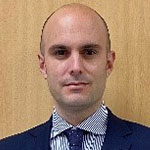 Francisco de Borja Rodríguez García
Profesor
Professor
Licenciado en Derecho y en Administración y Dirección de Empresas por la Universidad Antonio de Nebrija. Menciones de Honor Nebrija en sendas licenciaturas al mejor expediente académico (2008 y 2010). Master Executive en Derecho Empresarial por el Centro de Estudios Garrigues en colaboración con Harvard Law School (2010-2012). Master of Laws (LL.M.) en Transacciones Internacionales por el Centro de Estudios Garrigues en colaboración con Fordham School of Law (Nueva York). Abogado del Ilustre Colegio de Abogados de Madrid. Especialista en Derecho Mercantil. Trabajó en J&A Garrigues, S.L.P. de 2010 a 2018, en el Departamento Mercantil de Sevilla. Actualmente ostenta el cargo de Director Adjunto de Asesoría Jurídica de Grupo Azvi, grupo multinacional de empresas, y de Vicesecretario No-Consejero del mismo.
Francisco de Borja Rodríguez García
Profesor
Professor
Licenciado en Derecho y en Administración y Dirección de Empresas por la Universidad Antonio de Nebrija. Menciones de Honor Nebrija en sendas licenciaturas al mejor expediente académico (2008 y 2010). Master Executive en Derecho Empresarial por el Centro de Estudios Garrigues en colaboración con Harvard Law School (2010-2012). Master of Laws (LL.M.) en Transacciones Internacionales por el Centro de Estudios Garrigues en colaboración con Fordham School of Law (Nueva York). Abogado del Ilustre Colegio de Abogados de Madrid. Especialista en Derecho Mercantil. Trabajó en J&A Garrigues, S.L.P. de 2010 a 2018, en el Departamento Mercantil de Sevilla. Actualmente ostenta el cargo de Director Adjunto de Asesoría Jurídica de Grupo Azvi, grupo multinacional de empresas, y de Vicesecretario No-Consejero del mismo.
 María Victoria Rodríguez Prieto
Profesora
Professor
Doctora en Ciencias Políticas, área de Relaciones Internacionales por la Universidad Complutense de Madrid (Sobresaliente Cum Laude, Mención Europea y Premio Extraordinario de Doctorado). Premio Antonio Truyol y Serra a la mejor tesis doctoral en Relaciones Internacionales concedido por la AEPDIRI. Máster en Relaciones Internacionales y Licenciada en Periodismo por la misma universidad. Desde 2016, es profesora en la Universidad Antonio de Nebrija. Anteriormente, fue beneficiaria de la beca pre-doctoral de Formación de Profesorado Universitario (FPU) en la Facultad de Ciencias Políticas y Sociología, Universidad Complutense de Madrid. Ha sido investigadora visitante en prestigiosos centros extranjeros, tales como Brussels School of International Studies, University of Kent (Bélgica) o Universiteit van Amsterdam (Holanda). Autora de numerosas publicaciones y miembro de grupos de investigación.
María Victoria Rodríguez Prieto
Profesora
Professor
Doctora en Ciencias Políticas, área de Relaciones Internacionales por la Universidad Complutense de Madrid (Sobresaliente Cum Laude, Mención Europea y Premio Extraordinario de Doctorado). Premio Antonio Truyol y Serra a la mejor tesis doctoral en Relaciones Internacionales concedido por la AEPDIRI. Máster en Relaciones Internacionales y Licenciada en Periodismo por la misma universidad. Desde 2016, es profesora en la Universidad Antonio de Nebrija. Anteriormente, fue beneficiaria de la beca pre-doctoral de Formación de Profesorado Universitario (FPU) en la Facultad de Ciencias Políticas y Sociología, Universidad Complutense de Madrid. Ha sido investigadora visitante en prestigiosos centros extranjeros, tales como Brussels School of International Studies, University of Kent (Bélgica) o Universiteit van Amsterdam (Holanda). Autora de numerosas publicaciones y miembro de grupos de investigación.
 Francisco Romero Caro
Profesor
Professor
Doctor en Derecho por la Universidad del País Vasco. Ha sido Investigador FPI en la Universidad del País Vasco, realizando estancias de investigación en la Universidad de Ottawa, el CEPC, el Max Planck y la Universidad Nacional de Educación a Distancia. Sus principales líneas de investigación versan sobre la distribución territorial del poder en sistemas multinivel (con especial atención a los estados federales) y en la integración territorial y el fenómeno de la secesión en estados como Canadá o España. También ha colaborado en proyectos sobre calidad democrática, despilfarro alimentario y la regulación de los organismos modificados genéticamente en la Unión Europea. Fue ganador del XVII Premio "Manuel Giménez Abad" para trabajos de investigación sobre la descentralización política y territorial y obtuvo el Seal of Excellece de la Comisión Europea en la convocatoria Horizon 2020 Marie Skłodowska-Curie gracias a un proyecto sobre integración territorial y federalismo fiscal en colaboración con el EURAC.
Es autor de artículos como “La reforma del proceso de selección y nombramiento de los magistrados del Tribunal Supremo de Canadá: el caso particular de Quebec” (Teoría y Realidad Constitucional), “Senado y sistema federal en Canadá: ¿imposibilidad de una reforma deseable?” (Revista de Estudios Políticos) y “The Spanish vision of Canada’s Clarity Act: from idealization to myth” (Perspectives on Federalism), así como diversos capítulos en obras colectivas.
Francisco Romero Caro
Profesor
Professor
Doctor en Derecho por la Universidad del País Vasco. Ha sido Investigador FPI en la Universidad del País Vasco, realizando estancias de investigación en la Universidad de Ottawa, el CEPC, el Max Planck y la Universidad Nacional de Educación a Distancia. Sus principales líneas de investigación versan sobre la distribución territorial del poder en sistemas multinivel (con especial atención a los estados federales) y en la integración territorial y el fenómeno de la secesión en estados como Canadá o España. También ha colaborado en proyectos sobre calidad democrática, despilfarro alimentario y la regulación de los organismos modificados genéticamente en la Unión Europea. Fue ganador del XVII Premio "Manuel Giménez Abad" para trabajos de investigación sobre la descentralización política y territorial y obtuvo el Seal of Excellece de la Comisión Europea en la convocatoria Horizon 2020 Marie Skłodowska-Curie gracias a un proyecto sobre integración territorial y federalismo fiscal en colaboración con el EURAC.
Es autor de artículos como “La reforma del proceso de selección y nombramiento de los magistrados del Tribunal Supremo de Canadá: el caso particular de Quebec” (Teoría y Realidad Constitucional), “Senado y sistema federal en Canadá: ¿imposibilidad de una reforma deseable?” (Revista de Estudios Políticos) y “The Spanish vision of Canada’s Clarity Act: from idealization to myth” (Perspectives on Federalism), así como diversos capítulos en obras colectivas.
 Susana Sancristobal Reales
Profesora
Professor
Doctora en derecho Procesal por la Universidad Complutense de Madrid. Cuenta con dos sexenios de investigación concedidos por CNEAI. Especialista en derecho procesal. Coordinadora y autora de varios libros sobre su especialidad: Sistemas complementarios a la Jurisdicción para la resolución de conflictos civiles y mercantiles; Manual de Derecho de la Construcción; Estudios de la Propiedad Horizontal; Las acciones arrendaticias; La jurisdicción militar, como jurisdicción especializada, etc., así como de numerosos artículos doctrinales.
Ha impartido clases y másteres de postgrado en varias universidades: UNED, UEM, Real Centro Universitario Escorial Mª Cristina (Adscrito a la UCM), Universidad Camilo José Cela, Centro de Estudios Garrigues. Ha ejercido como abogado del ICAM durante seis años.
Susana Sancristobal Reales
Profesora
Professor
Doctora en derecho Procesal por la Universidad Complutense de Madrid. Cuenta con dos sexenios de investigación concedidos por CNEAI. Especialista en derecho procesal. Coordinadora y autora de varios libros sobre su especialidad: Sistemas complementarios a la Jurisdicción para la resolución de conflictos civiles y mercantiles; Manual de Derecho de la Construcción; Estudios de la Propiedad Horizontal; Las acciones arrendaticias; La jurisdicción militar, como jurisdicción especializada, etc., así como de numerosos artículos doctrinales.
Ha impartido clases y másteres de postgrado en varias universidades: UNED, UEM, Real Centro Universitario Escorial Mª Cristina (Adscrito a la UCM), Universidad Camilo José Cela, Centro de Estudios Garrigues. Ha ejercido como abogado del ICAM durante seis años.
 María Luisa Sánchez Paredes
Profesora
Professor
Doctora en Derecho mercantil por la Universidad San Pablo-CEU de Madrid. Cuenta con un sexenio de investigación concedido por CNEAI. Obtuvo el Premio Extraordinario de Licenciatura en la Facultad de Derecho de la Universidad de Alcalá de Henares.
Es experta en Derecho mercantil, y su labor investigadora se ha desarrollado fundamentalmente en el ámbito del Derecho concursal y del Derecho contractual. Es colaboradora habitual de reconocidas publicaciones jurídicas como el Anuario de Derecho concursal o la Revista de Derecho mercantil. Asimismo, es coautora de los manuales, “El derecho de la insolvencia. El concurso de acreedores” (3.ª ed., 2018) de la editorial Tirant lo Blanch, las “Lecciones de Derecho empresarial” (4.ª ed., 2020) de la misma editorial, y las “Lecciones de Derecho concursal” (2020) de la editorial Civitas -Thomson Reuters.
Es docente en cursos de grado y posgrado y másteres universitarios en distintas universidades como la Universidad San Pablo-CEU y la Universidad Francisco de Vitoria de Madrid. Cuenta con experiencia profesional en despachos especializados en Derecho mercantil y concursal. Y es miembro del Comité Evaluador de la Revista Crítica de Derecho Inmobiliario y de la Revista Jurídica de la Universidad Autónoma de Madrid.
María Luisa Sánchez Paredes
Profesora
Professor
Doctora en Derecho mercantil por la Universidad San Pablo-CEU de Madrid. Cuenta con un sexenio de investigación concedido por CNEAI. Obtuvo el Premio Extraordinario de Licenciatura en la Facultad de Derecho de la Universidad de Alcalá de Henares.
Es experta en Derecho mercantil, y su labor investigadora se ha desarrollado fundamentalmente en el ámbito del Derecho concursal y del Derecho contractual. Es colaboradora habitual de reconocidas publicaciones jurídicas como el Anuario de Derecho concursal o la Revista de Derecho mercantil. Asimismo, es coautora de los manuales, “El derecho de la insolvencia. El concurso de acreedores” (3.ª ed., 2018) de la editorial Tirant lo Blanch, las “Lecciones de Derecho empresarial” (4.ª ed., 2020) de la misma editorial, y las “Lecciones de Derecho concursal” (2020) de la editorial Civitas -Thomson Reuters.
Es docente en cursos de grado y posgrado y másteres universitarios en distintas universidades como la Universidad San Pablo-CEU y la Universidad Francisco de Vitoria de Madrid. Cuenta con experiencia profesional en despachos especializados en Derecho mercantil y concursal. Y es miembro del Comité Evaluador de la Revista Crítica de Derecho Inmobiliario y de la Revista Jurídica de la Universidad Autónoma de Madrid.
 Luis Sánchez-Cervera de los Santos
Profesor
Professor
Doctor en Derecho por la Universidad Europea de Madrid (sobresaliente Cum Laude). Licenciado en derecho por la Universidad Autónoma de Madrid. Experto en Administración Local, servicios públicos y urbanismo.
Su labor investigadora se desarrolla fundamentalmente en el ámbito del Derecho Administrativo. Es autor de 20 doctrinales publicados en las revistas administrativas más prestigiosas, promoviendo formulas cooperativas entre el sector público y el privado. Autor de tres monografías (editorial CIVITAS y BOE); Una de ellas ha sido premiada dentro de los cien mejores libros de derecho editados en 2011, tanto en lengua española como no española.
Su actividad docente se centra en el ámbito de Derecho Administrativo. Ha impartido docencia en Cursos de Postgrado y Másteres Universitarios en Habilitados Nacionales y como profesor externo del grado de Ciencias Políticas y Gestión Pública. Asimismo, ha participado como docente en el marco del programa de formación continua descentralizada del Instituto Nacional de Administración Pública (INAP) de la Administración General del Estado.
Pertenece al Cuerpo de Funcionarios con Habilitación de Carácter Nacional, grupo A1 con nivel 30 consolidado, con veinte años de carrera profesional.
Ha recibido el premio del VIII Premio de Estudio e Investigación sobre Administración y Gestión Pública de la Comunidad de Madrid.
Luis Sánchez-Cervera de los Santos
Profesor
Professor
Doctor en Derecho por la Universidad Europea de Madrid (sobresaliente Cum Laude). Licenciado en derecho por la Universidad Autónoma de Madrid. Experto en Administración Local, servicios públicos y urbanismo.
Su labor investigadora se desarrolla fundamentalmente en el ámbito del Derecho Administrativo. Es autor de 20 doctrinales publicados en las revistas administrativas más prestigiosas, promoviendo formulas cooperativas entre el sector público y el privado. Autor de tres monografías (editorial CIVITAS y BOE); Una de ellas ha sido premiada dentro de los cien mejores libros de derecho editados en 2011, tanto en lengua española como no española.
Su actividad docente se centra en el ámbito de Derecho Administrativo. Ha impartido docencia en Cursos de Postgrado y Másteres Universitarios en Habilitados Nacionales y como profesor externo del grado de Ciencias Políticas y Gestión Pública. Asimismo, ha participado como docente en el marco del programa de formación continua descentralizada del Instituto Nacional de Administración Pública (INAP) de la Administración General del Estado.
Pertenece al Cuerpo de Funcionarios con Habilitación de Carácter Nacional, grupo A1 con nivel 30 consolidado, con veinte años de carrera profesional.
Ha recibido el premio del VIII Premio de Estudio e Investigación sobre Administración y Gestión Pública de la Comunidad de Madrid.
 Antonio Sánchez-Collado Obon
Profesor
Professor
Licenciado en Derecho por la Universidad Complutense de Madrid. Escuela de Práctica Jurídica por la Universidad Complutense de Madrid. Máster en Tributación y Asesoría Fiscal por el Centro de Estudios Financieros. Ha realizado diferentes cursos de especialización en Protección de datos. Trabaja en Telefónica desde hace más de 20 años con experiencia en diferentes áreas. Abogado especializado en asesoramiento en Protección de Datos y como asesor fiscal. Su actividad docente se centra en el ámbito de la Privacidad y Protección de datos.
Antonio Sánchez-Collado Obon
Profesor
Professor
Licenciado en Derecho por la Universidad Complutense de Madrid. Escuela de Práctica Jurídica por la Universidad Complutense de Madrid. Máster en Tributación y Asesoría Fiscal por el Centro de Estudios Financieros. Ha realizado diferentes cursos de especialización en Protección de datos. Trabaja en Telefónica desde hace más de 20 años con experiencia en diferentes áreas. Abogado especializado en asesoramiento en Protección de Datos y como asesor fiscal. Su actividad docente se centra en el ámbito de la Privacidad y Protección de datos.
 Enrique Sanz de Sandoval
Profesor
Professor
Licenciado en Derecho por la Universidad Autónoma de Madrid. Máster en Asesoría Fiscal de Empresas por el Instituto de Empresa. European Financial Advisor (EFPA Europe).
Abogado fiscalista senior en Garrigues Abogados y Asesores Tributarios (2002 – 2005). Actualmente, Letrado de Asesoría y Planificación Patrimonial de BNP Paribas Wealth Management. Ponente habitual en seminarios sobre fiscalidad de la empresa familiar.
Enrique Sanz de Sandoval
Profesor
Professor
Licenciado en Derecho por la Universidad Autónoma de Madrid. Máster en Asesoría Fiscal de Empresas por el Instituto de Empresa. European Financial Advisor (EFPA Europe).
Abogado fiscalista senior en Garrigues Abogados y Asesores Tributarios (2002 – 2005). Actualmente, Letrado de Asesoría y Planificación Patrimonial de BNP Paribas Wealth Management. Ponente habitual en seminarios sobre fiscalidad de la empresa familiar.
 Rafael Satrústegui y Caruncho
Profesor
Professor
Doctor en Derecho por la Universidad Complutense de Madrid en el programa de Filosofía del Derecho. máster en Ciencia Política y Democracia en la Universidad Nacional de Educación a Distancia. Licenciado en Derecho y Licenciado Ciencias Políticas por la Universidad San Pablo CEU.
Su labor investigadora se desarrolla fundamentalmente en el ámbito de la Filosofía del Derecho, la Historia Antigua y Medieval. Es autor de Determinismo y Moral: Articulación de una Nueva Teoría del Derecho Natural; y Sobre el Derecho Penal Calvinista: Estudio de Caso para Contribuir a Elucidar las causas de la Decadencia del “Retribucionismo”.
Su actividad docente se centra en la Historia del Derecho y la Introducción al Derecho. Asimismo, también cuenta con experiencia profesional como genealogista y como articulista de asuntos de actualidad política en Diario16.
Es Académico correspondiente de la Real Academia de Jurisprudencia y Legislación y miembro de su sección de Filosofía del Derecho.
Rafael Satrústegui y Caruncho
Profesor
Professor
Doctor en Derecho por la Universidad Complutense de Madrid en el programa de Filosofía del Derecho. máster en Ciencia Política y Democracia en la Universidad Nacional de Educación a Distancia. Licenciado en Derecho y Licenciado Ciencias Políticas por la Universidad San Pablo CEU.
Su labor investigadora se desarrolla fundamentalmente en el ámbito de la Filosofía del Derecho, la Historia Antigua y Medieval. Es autor de Determinismo y Moral: Articulación de una Nueva Teoría del Derecho Natural; y Sobre el Derecho Penal Calvinista: Estudio de Caso para Contribuir a Elucidar las causas de la Decadencia del “Retribucionismo”.
Su actividad docente se centra en la Historia del Derecho y la Introducción al Derecho. Asimismo, también cuenta con experiencia profesional como genealogista y como articulista de asuntos de actualidad política en Diario16.
Es Académico correspondiente de la Real Academia de Jurisprudencia y Legislación y miembro de su sección de Filosofía del Derecho.
 Teresa Serrano Sordo
Profesora
Professor
Doctora en Derecho por la Universidad CEU San Pablo. Máster en Asesoría Jurídica de Empresas por el Instituto de Empresa. Licenciada en Derecho por el Grupo Especial de la Facultad de Derecho de la Universidad Complutense de Madrid. Ha completado su formación con programas de desarrollo directivo en IESE (Programa de Dirección General, PDG) y en ESADE (Mujeres para la alta dirección).
Su experiencia laboral ha transcurrido en el sector financiero donde ha ocupado puestos de dirección del área de legal y cumplimiento normativo en banca extranjera internacional (como Citibank, Bank of America y Deutsche Bank) y en el sector fintech, lanzó el departamento de legal y cumplimiento del grupo Digital Origin. Actualmente, responsable de legal y compliance en PATRIVALOR, sociedad gestora de fondos de inversión y especializada en gestión discrecional de carteras de inversión. Ha publicado en revistas españolas y en Noticas de la Unión Europea de CISS, y ha sido co-autora en varias obras colectivas.
Teresa Serrano Sordo
Profesora
Professor
Doctora en Derecho por la Universidad CEU San Pablo. Máster en Asesoría Jurídica de Empresas por el Instituto de Empresa. Licenciada en Derecho por el Grupo Especial de la Facultad de Derecho de la Universidad Complutense de Madrid. Ha completado su formación con programas de desarrollo directivo en IESE (Programa de Dirección General, PDG) y en ESADE (Mujeres para la alta dirección).
Su experiencia laboral ha transcurrido en el sector financiero donde ha ocupado puestos de dirección del área de legal y cumplimiento normativo en banca extranjera internacional (como Citibank, Bank of America y Deutsche Bank) y en el sector fintech, lanzó el departamento de legal y cumplimiento del grupo Digital Origin. Actualmente, responsable de legal y compliance en PATRIVALOR, sociedad gestora de fondos de inversión y especializada en gestión discrecional de carteras de inversión. Ha publicado en revistas españolas y en Noticas de la Unión Europea de CISS, y ha sido co-autora en varias obras colectivas.
 Patricia Soriano Machado
Profesora
Professor
Doctora en Ciencias económicas y empresariales. Máster de investigación en economía y empresa. Es experta en contabilidad y auditoría de cuentas.
Su labor investigadora se desarrolla fundamentalmente en el ámbito de la gestión del capital circulante en los distribuidores alimentarios de España. Su actividad docente se centra en el ámbito de contabilidad.
En el ámbito universitario, ha ostentado cargos de gestión, como la coordinación del Máster Universitario en Auditoría de Cuentas y Contabilidad Superior en IBS. Asimismo, también cuenta con experiencia profesional como auditora de cuentas en Deloitte. También, trabajó en el departamento de Transaction Advisory Services de EY (Madrid) donde se dedicaba entre otras tareas a la gestión de proyectos, control/seguimiento financiero, coordinación con otras líneas de la firma, así como, análisis de productividad, asignación sectorial de clientes y coordinación y gestión de la formación interna.
Patricia Soriano Machado
Profesora
Professor
Doctora en Ciencias económicas y empresariales. Máster de investigación en economía y empresa. Es experta en contabilidad y auditoría de cuentas.
Su labor investigadora se desarrolla fundamentalmente en el ámbito de la gestión del capital circulante en los distribuidores alimentarios de España. Su actividad docente se centra en el ámbito de contabilidad.
En el ámbito universitario, ha ostentado cargos de gestión, como la coordinación del Máster Universitario en Auditoría de Cuentas y Contabilidad Superior en IBS. Asimismo, también cuenta con experiencia profesional como auditora de cuentas en Deloitte. También, trabajó en el departamento de Transaction Advisory Services de EY (Madrid) donde se dedicaba entre otras tareas a la gestión de proyectos, control/seguimiento financiero, coordinación con otras líneas de la firma, así como, análisis de productividad, asignación sectorial de clientes y coordinación y gestión de la formación interna.
 María del Carmen Tejera Gimeno
Profesora
Professor
Licenciada en Derecho por la UCM (San Pablo CEU). Abogado del Estado por oposición desde el año 1992. Directora de la Secretaría General Técnica y secretaria no consejera del consejo de administración de CANAL DE ISABEL II, S.A. desde 2020. Como Abogado del Estado ha ejercicio sus funciones en diversos puestos de responsabilidad, entre otros, Abogado del Estado-jefe en el Ministerio de Hacienda, Abogado del Estado en el Tribunal Supremo, Secretaria del Consejo de Administración de Acción Cultural Española, S.A. (ACE), Secretaria del Consejo de Administración de la Sociedad Estatal de Exposiciones Internacionales S.A., y Secretaria del Consejo de Administración de la Agencia EFE.
Miembro del grupo redactor del Código unificado de Buen Gobierno de las sociedades cotizadas de mayo de 2006.
Ha realizado diversas ponencias en seminarios sobre contratación, Derecho administrativo, sector financiero, y ha realizado publicaciones sobre dicha materia.
María del Carmen Tejera Gimeno
Profesora
Professor
Licenciada en Derecho por la UCM (San Pablo CEU). Abogado del Estado por oposición desde el año 1992. Directora de la Secretaría General Técnica y secretaria no consejera del consejo de administración de CANAL DE ISABEL II, S.A. desde 2020. Como Abogado del Estado ha ejercicio sus funciones en diversos puestos de responsabilidad, entre otros, Abogado del Estado-jefe en el Ministerio de Hacienda, Abogado del Estado en el Tribunal Supremo, Secretaria del Consejo de Administración de Acción Cultural Española, S.A. (ACE), Secretaria del Consejo de Administración de la Sociedad Estatal de Exposiciones Internacionales S.A., y Secretaria del Consejo de Administración de la Agencia EFE.
Miembro del grupo redactor del Código unificado de Buen Gobierno de las sociedades cotizadas de mayo de 2006.
Ha realizado diversas ponencias en seminarios sobre contratación, Derecho administrativo, sector financiero, y ha realizado publicaciones sobre dicha materia.
 Fernando Tomé Bermejo
Profesor
Professor
Doctor en Economía por la Universidad de Alcalá. Máster Universitario en Análisis Económico Aplicado Universidad de Alcalá, programa conjunto con la Universidad Complutense de Madrid. Licenciado en Economía por la Universidad de Alcalá. Es Experto en Economía. Cuenta con más de 15 años de experiencia en gestión de unidades de educación superior, como Vicerrector, Rector, CEO, Decano, Vicedecano y Director de departamento, en Universidades y Escuelas de Negocios. Ha impartido docencia en programas de grado y postgrado en ESCE University, París, (Francia), Universidad Valle de México, Fachhochschule Mainz, (Alemania), UDLA Quito, Budapest Business School, Univ. Peruana del Norte, The Hague University, UNIBE Sto. Domingo (R. Dominicana), Southbank University, Londres (UK) UNAPEC Sto. Domingo (R. Dominicana), Univ. Andrés Bello, Santiago, Tiimiakatemia, Jyväskylä (Finlandia), European Univ. Cyprus, Nicosia (Chipre), Universidad Panamericana y Bilgi University, Estambul. Cuenta con numerosas publicaciones científicas de alto impacto. Colabora con varios proyectos de investigación. Colabora con medios de comunicación y publicaciones en artículos divulgativos.
Miembro del grupo de investigación Economía e internacionalización de empresas, Universidad Nebrija. Miembro del grupo de investigación OPINBI (Igualdad de Oportunidades, Inclusión social y Bienestar) conformado por investigadores de Universidad Nebrija, Universidad de Alcalá, Universidad Rey Juan Carlos. Revisor en Cuadernos de Economía, revista indexada Scopus SJR Q4, FECYT.
Fernando Tomé Bermejo
Profesor
Professor
Doctor en Economía por la Universidad de Alcalá. Máster Universitario en Análisis Económico Aplicado Universidad de Alcalá, programa conjunto con la Universidad Complutense de Madrid. Licenciado en Economía por la Universidad de Alcalá. Es Experto en Economía. Cuenta con más de 15 años de experiencia en gestión de unidades de educación superior, como Vicerrector, Rector, CEO, Decano, Vicedecano y Director de departamento, en Universidades y Escuelas de Negocios. Ha impartido docencia en programas de grado y postgrado en ESCE University, París, (Francia), Universidad Valle de México, Fachhochschule Mainz, (Alemania), UDLA Quito, Budapest Business School, Univ. Peruana del Norte, The Hague University, UNIBE Sto. Domingo (R. Dominicana), Southbank University, Londres (UK) UNAPEC Sto. Domingo (R. Dominicana), Univ. Andrés Bello, Santiago, Tiimiakatemia, Jyväskylä (Finlandia), European Univ. Cyprus, Nicosia (Chipre), Universidad Panamericana y Bilgi University, Estambul. Cuenta con numerosas publicaciones científicas de alto impacto. Colabora con varios proyectos de investigación. Colabora con medios de comunicación y publicaciones en artículos divulgativos.
Miembro del grupo de investigación Economía e internacionalización de empresas, Universidad Nebrija. Miembro del grupo de investigación OPINBI (Igualdad de Oportunidades, Inclusión social y Bienestar) conformado por investigadores de Universidad Nebrija, Universidad de Alcalá, Universidad Rey Juan Carlos. Revisor en Cuadernos de Economía, revista indexada Scopus SJR Q4, FECYT.
 Manuel Trenado Torrejón
Profesor
Professor
Doctor en Ingeniería por la Universidad Politécnica de Madrid. Licenciado en Economía por la Universidad Nacional de Educación a Distancia. Comenzó su carrera profesional en el ámbito de la banca de inversión uniéndose al equipo de Instituciones Financieras de Merrill Lynch en Londres, donde asesoró a empresas españolas y europeas en materia de fusiones y adquisiciones de servicios financieros. Posteriormente, se incorporó al equipo de Instituciones Financieras de Goldman Sachs en Madrid, tomando parte activa en la mayor parte de las transacciones que han transformado el sector financiero español.
Imparte valoración de empresas, finanzas corporativas, contabilidad, modelización financiera y entorno económico en Universidades, Escuelas de Negocio y Empresas en Madrid, Londres, Los Ángeles, Sao Paulo, Frankfurt, Singapur y Jedha, entre otros.
Manuel Trenado Torrejón
Profesor
Professor
Doctor en Ingeniería por la Universidad Politécnica de Madrid. Licenciado en Economía por la Universidad Nacional de Educación a Distancia. Comenzó su carrera profesional en el ámbito de la banca de inversión uniéndose al equipo de Instituciones Financieras de Merrill Lynch en Londres, donde asesoró a empresas españolas y europeas en materia de fusiones y adquisiciones de servicios financieros. Posteriormente, se incorporó al equipo de Instituciones Financieras de Goldman Sachs en Madrid, tomando parte activa en la mayor parte de las transacciones que han transformado el sector financiero español.
Imparte valoración de empresas, finanzas corporativas, contabilidad, modelización financiera y entorno económico en Universidades, Escuelas de Negocio y Empresas en Madrid, Londres, Los Ángeles, Sao Paulo, Frankfurt, Singapur y Jedha, entre otros.
 María Vaillo Rodríguez
Profesora
Professor
Doctora en Educación por la Universidad Complutense de Madrid. Es experta en procesos cognitivos y emocionales implicados en el aprendizaje. Ha realizado estancias de investigación en Minerva Sapiens (Roma) y Universidad Autónoma de Barcelona. Su labor investigadora se desarrolla fundamentalmente en el ámbito de Familia, Educación y Perspectiva de Género. Es autora de numerosos artículos indexados.
Su actividad docente se centra en el ámbito de la Psicología educativa. Ha impartido docencia en Cursos de Postgrado y Másteres Universitarios en la Universidad Complutense de Madrid, Universidad Camilo José Cela, UNIR y Universidad Autónoma de Barcelona.
En el ámbito universitario, ha ostentado cargos de gestión como directora del Instituto Nebrija de Competencias Profesionales, Coordinadora Cátedra Nebrija-Santander en Inteligencia Ejecutiva y Educación y directora de Cátedras de Investigación.
Asimismo, también cuenta con experiencia profesional como evaluadora externa del Servicio Español para la Internacionalización de la Educación (SEPIE). Ha trabajado para distintos organismos públicos, como el Centro Nacional de Innovación e Investigación Educativa (CNIIE), dependiente del Ministerio de Educación, y elaborados contenidos didácticos para organismos públicos como la Xunta de Galicia o la Secretaría de Estado de Servicios Sociales e Igualdad Es miembro del Consejo editorial de varias revistas.
María Vaillo Rodríguez
Profesora
Professor
Doctora en Educación por la Universidad Complutense de Madrid. Es experta en procesos cognitivos y emocionales implicados en el aprendizaje. Ha realizado estancias de investigación en Minerva Sapiens (Roma) y Universidad Autónoma de Barcelona. Su labor investigadora se desarrolla fundamentalmente en el ámbito de Familia, Educación y Perspectiva de Género. Es autora de numerosos artículos indexados.
Su actividad docente se centra en el ámbito de la Psicología educativa. Ha impartido docencia en Cursos de Postgrado y Másteres Universitarios en la Universidad Complutense de Madrid, Universidad Camilo José Cela, UNIR y Universidad Autónoma de Barcelona.
En el ámbito universitario, ha ostentado cargos de gestión como directora del Instituto Nebrija de Competencias Profesionales, Coordinadora Cátedra Nebrija-Santander en Inteligencia Ejecutiva y Educación y directora de Cátedras de Investigación.
Asimismo, también cuenta con experiencia profesional como evaluadora externa del Servicio Español para la Internacionalización de la Educación (SEPIE). Ha trabajado para distintos organismos públicos, como el Centro Nacional de Innovación e Investigación Educativa (CNIIE), dependiente del Ministerio de Educación, y elaborados contenidos didácticos para organismos públicos como la Xunta de Galicia o la Secretaría de Estado de Servicios Sociales e Igualdad Es miembro del Consejo editorial de varias revistas.
More Academic Information
Official Degree:Bachelor's Degree in Law
Students interested in the practice of the legal profession.
240 ECTS credits.
Minimum 12 ECTS and maximum 90 ECTS per registration and academic period
Center responsible:School of Law and International Relations
Branch of knowledge: Social and Legal Sciences
Available places: - Classroom attendance: 100
- Blended: 150
Type of Education: Classroom attendance / Blended
Academic year in which it was implemented: 2017
Languages: - This degree in taught in Spanish and English.
- English level required at admission: A2 (MCERL)
- Students who take the subjects Fundamentals of Anglo-Saxon Law/Common law basics and Privacy and data protection/Privacy and data protection in English must certify level B2 (CEFR) or higher in that language.
University Services: [+info]
Competences
Basic competencesIn RD1393/2007, the following basic competencies (CB) are described:
- CB1 That students have demonstrated knowledge and understanding in an area of study that starts from the base of general secondary education, and is usually found at a level that, although supported by advanced textbooks, also includes some aspects that imply insights from the cutting edge of your field of study;
- CB2 That students know how to apply their knowledge to their work or vocation in a professional way and have the skills that are usually demonstrated through the development and defense of arguments and problem solving within their area of study;
- CB3 That students have the ability to gather and interpret relevant data (usually within their area of study) to make judgments that include reflection on relevant issues of a social, scientific or ethical nature;
- CB4 That students can transmit information, ideas, problems and solutions to both a specialized and non-specialized audience;
- CB5 That students have developed those learning skills necessary to undertake further studies with a high degree of autonomy.
- CG1 Manage, organize and properly plan time.
- CG2 Have the ability to communicate orally and in writing in their own language.
- CG3 Have the capacity for analysis and synthesis. Appropriately use the knowledge acquired and the knowledge specific to the legal field.
- CG4 Have the ability to manage information: obtaining, analyzing and retrieving information from various legal sources.
- CG5 Being able to apply knowledge in practice, obtaining results that lead to the resolution of problems in the field of Law.
- CG6 Being able to make decisions.
- CG7 Generate high critical reasoning.
- CG8 Develop interpersonal skills: empathy, tolerance and respect for diversity.
- CG9 Have the ability to generate the exercise of work activity in interdisciplinary teams in the field of Law.
- CG10 Develop the ability to learn and autonomy in learning.
- CG11 Being able to adapt to new situations.
- CG12 Seek excellence and quality in the development of tasks.
- CG13 Efficiently use investigative techniques.
- CE1 Perceiving the legal system as a system.
- CE2 Know the historical, social and cultural context of the exercise of the legal profession.
- CE3 Know the figures and institutions that make up the State and supranational organizations.
- CE4 Analyze and understand complex legal issues.
- CE5 Understanding the Law as a conflict resolution instrument.
- CE6 Know and apply accounting as an information system of the economic-financial situation of the company, as well as its results.
- CE7 Know and apply the basic concepts and instrumental techniques of strategic planning, risk planning and business valuation.
- CE8 Situating the Law and legal relations in a globalized context.
- CE9 Apply the theory to complex practical cases, especially those corresponding to the legal field.
- CE10 Recognize and analyze the legal consequences of the actions of the physical and legal person.
- CE12 Apply ethics in professional practice.
- CE13 Understand the use of oratory and argumentation.
- CE14 Manage legal information and apply it in the required context.
- CE15 Interpret and understand specialized texts in English, applied to the field of Law.
- CE16 Know and understand economic analysis applied to the social sciences at a non-specialized level.
- CE17 Demonstrate that they have developed the necessary skills for professional practice.
- CE18 Identify the elements of a legal problem, proposing alternatives for its solution.
- CE19 Identify and understand the scope of legal norms in social relations.
- CED20 Know and understand the elements, structure, resources, interpretation and application of the legal system and interpret the sources and fundamental legal concepts of each of the different legal systems.
- CED21 Know and know how to apply the priority criteria of the sources to determine the applicable norms in each case, and especially that of conformity with the rules, principles and constitutional values.
- CED22 Interpret legal texts from an interdisciplinary perspective using legal principles and social, ethical and deontological values and principles as analysis tools.
- CED23 Pronounce with a convincing legal argument on a theoretical question related to the various legal matters.
- CED24 Resolve practical cases in accordance with the current positive Law, which implies the prior elaboration of material, the identification of problematic issues, the selection and interpretation of the applicable positive Law data and the argued exposition of the subsumption.
- CED25 Handle with skill and precision the legal language and the terminology of the different branches of Law: Write legal documents in an orderly and understandable manner.
- CED26 Communicate orally and in writing legal ideas, arguments and reasoning using the appropriate registers in each context.
- CED27 Use information and communication technologies to search for and obtain legal information (legislative databases, jurisprudence, bibliography, etc.), as well as work and communication tools.
Blended Study
MetodologyThe Bachelor's Degree in Law follows a methodology based on teaching-learning, centered on the student, which promotes active participation and promotes the development of general and specific skills that demonstrate knowledge, skills and attitudes applicable in a future professional practice. The teaching methodology is based on the use of ICT as a support to collaborative work (forums, chats, meeting by videoconference), the teacher's orientations (agenda, bulletin board, document folder, links) and the submission of assignments (task mailbox and work tools). The Blackboard Virtual Campus will be used for this purpose.
All these techniques mean that the student assumes an active role in his/her academic training. In addition, the work of the professor acquires a guiding dimension of support and guidance, which must be consistent with a transparent and formative evaluation system that faithfully reflects the knowledge and skills acquired.
The training activities are carried out through different teaching strategies: online theoretical classes, online practical cases, online tutorials, and academic activities among which are the reading and analysis of jurisprudence, assignments through virtual resources, search and selection of jurisprudence and legislation; exams and activities for evaluation, individual or small group work.
BLENDED MODALITY
AF1. Master Lecture / Theoretical Fundamentals*
General explanation by the professor and/or their assistants of the theoretical conceptual framework of each subject or area of the Bachelor's Degree, as well as all the conceptual orientations that must be taken into account by the student in order to correctly learn in accordance with the curriculum.
AF2. Practical Class / Practical Case*
General explanation applied to the case in which the professor and/or their assistants focus on the issues being studied, discussed, debated or in conflict, guiding the practical application of the student's theoretical knowledge.
Resolution of cases posed to students after they have first completed them themselves and discussed them in class.
AF10. Remote Tutoring**
Personalized explanation, or in much smaller groups, designed to ensure the acquisition of specific knowledge and competences; resolution of theoretical or practical questions; orientation of the approaches and the monitoring of the procedures used by the students in the subject. The tutoring sessions may be carried out via email, telephone or telepresence. (Skype, illuminate, Collaborate...).
AF11. Individual or group work of distance learning students
Activity to be carried out and submitted by students at the end of each of the courses. Students will also have to do short assignments (individual and/or in groups), as instructed by the professor. They will use the virtual platform and its functionalities to share documents and sources, as well as to work simultaneously on the same assignment.
AF5. Activities through virtual resources
Forums, chats, debates on issues related to the content of the subjects and their practical application.
Self-assessment test and other knowledge tests.
AF6. Access and research on complementary content
Search, selection and hierarchization of information, legislation and doctrine related to the contents of the subjects and/or topics of the Bachelor's Degree.
AF7. Individual study
Individual reflection and analysis of the theoretical and practical contents of the subjects and/or topics of the Bachelor's Degree.
*Educational activities AF1 and AF2 will be in the case of the blended modality in face-to-face lectures, and at the Madrid-Princesa Campus. These sessions will be held two days a month, preferably on Fridays and Saturdays, from 09:00 to 18:00, with breaks for rest and food. In each monthly session the professors will present the theoretical part and propose the debate and discussion of cases of the corresponding subjects. Students must attend class, the attendance described in the subject sheets reflects this.
** AF10 Remote Tutoring will always be synchronous, because it requires the interaction of professor and student.
SE4. Final exam or final project
Students will take a final exam or a final project for each subject. To pass the course, the student must obtain a grade equal to or greater than 5 on a scale of 0-10, with 0 being the minimum grade and 10 the maximum.
SE5. Grading of the internship report carried out by the student
The grading will be based on the following documents:
- Evaluation report by the company after the completion of the internship, written by the company tutor.
- Student’s internship report after completion of said internship.
The company tutor's evaluation report will count as 50% of the final grade and the student's report will be the other 50%.
SE6. Evaluation of the Final Research Project: presentation and oral defense before a tribunal
Each student, individually, must create a report in which all the competences and learning acquired are synthesized. Likewise, the student must present and defend said project before a university tribunal.
SE7. Participation in programmed activities
The professor will keep track of the students' attendance at the synchronous sessions. Likewise, student participation and intervention in the programmed activities will be evaluated.
SE8. Presentation of assignments and projects (Individual practices and teamwork)
Execution of assignments, reports and portfolios, in which students must write and present by videoconference all the information that is collected, reviewed and analyzed.
The final tests or exercises of each subject will always be taken face-to-face.
In the final grade of the subject, the grade of said final test is weighted with the rest of the evaluation elements, with variable weighting percentages for the different elements, depending on the specific contents of the subject or course. The specific weighting percentages in each subject appear in the documentation given to the student at the beginning of the academic year.
All grades will be accessible online, in the student's private area.
Admission
Access requirementsThe Antonio de Nebrija University, in addition to complying with the conditions of admission to bachelor's degree studies in accordance with current legislation, requires candidates to pass its own access tests, both for undergraduate and postgraduate degrees.
Likewise, Nebrija University respects the provisions of Article 13 of RD 1892/2008 and its subsequent modifications regarding passing the university entrance exam:
“1. Access to Spanish universities, both public and private, to take the studies leading to obtaining the various diplomas titles of the official university degree that are valid throughout the national territory, will generally require passing the test, referred to in Article 38 of Organic Law 2/2006, of May 3, on Education, which is regulated in this royal decree, notwithstanding the other cases provided for in Article 3 of this royal decree”.
Students who are in any of the following academic situations can apply for admission into the first year:
- Students from 2nd year of Baccalaureate and Selectividad (Spanish University Entrance Exam) or COU and Selectividad.
- Students who have completed their secondary education studies abroad and have access to university studies in their country (for member countries of the European Union or signatories of the agreement on the European Economic Area or an agreement of recognition of degrees).
- Students who have completed their secondary education studies abroad and have passed the University Entrance Exam for Foreigners (rest of the educational systems).
- Students who have the degrees of Senior Technical Officer corresponding to the teachings of Vocational Training and Artistic Education, or of Senior Sports Technician.
- Students from higher degree training cycles (2nd grade of Vocational Training).
- People over twenty-five years of age, after examination, who do not meet the requirements set forth in section 2 of Article 42 of Organic Law 6/2001, of December 21, and its subsequent amendments.
- People over forty years of age who certify their work or professional experience and do not have the legally required academic diplomas, and people over forty-five years of age, after examination, in accordance with the provisions of article 42.4 of the Organic Law 6/2001, of December 21, and its subsequent modifications.
On the other hand, students who have completed university studies at another Spanish or foreign university and want to continue them at the Antonio de Nebrija University, or who want to start other studies at this University, can also apply for admission.
Students must present the application form for admission to the University along with the required documentation. The submission of the application for admission, together with the form for choosing the date for the admission tests, can be done in person during a visit to the University, or can be sent by post. Likewise, the admission procedure can be started by filling in the online admission form.
The Promotion and Admissions Department confirms to the candidate having received the printed or online application, and will summon him/her to the admission tests. On the day of the test, the candidate must submit, if he/she has not done so in advance, the following documentation:
- Photocopy of the academic record.
- Photocopy of DNI or passport.
- Two passport-size photos.
- Letter of presentation from a professor/tutor from the center of origin, or person with whom they have had academic or professional contact.
At the Antonio de Nebrija University, the admission procedures established by university legislation will be carried out with particular reference to the guiding principles of access to Spanish universities: equality, merit, ability, universal accessibility and adjustment to the criteria of the European Higher Education Area.
The admission process consists of several phases that are described below:
1.- Submit documentation
All candidates who wish to apply for admission must submit the following documentation:
1. Application for admission, completed and signed.
2. Receipt of payment of the registration fees.
3. Photocopy of the DNI (on both sides) or passport.
4. Two passport-size photographs.
5. Although it is not a mandatory document, we recommend a letter of introduction from a teacher/tutor from the center of origin where the student studied, to be attached to the academic documents submitted for the application.
In addition, according to the student's access path to the Bachelor's Degree, the following documentation will be requested:
6. Baccalaureate Academic Record.
7. University Access Exam (PAU).
8. Access credentials to the Spanish University issued by the UNED, for students from the International Baccalaureate or with a European Community Baccalaureate Degree.
9. Specific university access test for international students.
10. For candidates with a completed university degree or with Advanced Vocational Training Programs, academic record of the completed degree.
11.For the students who come through record transfer, academic record of the subjects taken and curricula of each of the subjects passed.
Only candidacies who have submitted the required documentation within the deadlines established by the Admissions Department will be processed. In addition, the student will be asked for all the additional information that is deemed appropriate to know the candidate's suitability for the Bachelor's degree.
For the purposes of pre-admission and admission, the evaluation of the candidate will be made with a scale of 0 to 10 points, taking into account the following criteria and percentages:
1.- Academic record of the student's path of origin: 60%
2.- Psychotechnical multiple-choice test: 10%
This test consists of a competences/skills assessment test related to: skills in intellectual work, attitudes towards cooperation and teamwork, time and resource management. We will try to determine if the candidate has sufficient motivation, training and knowledge, abilities, aptitudes, communication skills, extracurricular activities and future interests necessary to be admitted as a student in the Bachelor's Degree in Law at the Antonio de Nebrija University.
3.- English level test: 10% Students who wish to take the subjects Common Law Basics and Privacy and Data Protection in English must prove to have a B2 level (CEFR) or higher in that language.
In addition to the competences established in the Bachelor's Degree in Law, another has been included that is related to adequate knowledge of the English language, both oral and written. To this end, the Vice-Rector’s Office of Academic Organization and Faculty has established a series of strategies of a diverse nature to facilitate the acquisition of said competence by students, among which are the use of materials in English and the programming of subjects in English.
In order to know the students' real English level, the Department of Modern Languages will carry out a level test at the beginning of the studies. Based on the results of this test, the students will simultaneously take the Bachelor's Degree in Law, depending on each student's placement, and the "Diploma in Modern Languages (English)". The subjects that are part of this Diploma are extracurricular, but certification of C1 level is guaranteed for graduates.
The English level test is a written exam with multiple-choice questions on oral and written comprehension and use of the language. It lasts 60 minutes and the student must demonstrate to have at least knowledge of the English language at an A2 level (CEFR) to take the Bachelor's Degree in Law in Spanish, and a B2 level (CEFRL) or higher to take the Bachelor's Degree in Law with the option of subjects in English: Common Law Basics and Privacy and data protection (CEFR). The tests are taken in person and are carried out in computer rooms on each campus.
4.- Specific test of knowledge about the Bachelor's Degree in Law. It is a multiple-choice test, and consists mainly of specific contents of some of the main areas of general knowledge that will be taken in the degree chosen by the candidate, in addition to other elements common to all degrees. This test will be 20% of the total.
5.- Personal interview: a strategy to know the characteristics of the applicants, carried out by the psychopedagogical orientation department, as a diagnosis of all the candidates, we will apply a personality test that explores the emotional, intellectual, social and norms and values areas of each candidate of the Bachelor's Degree in Law at the Antonio de Nebrija University.
In the event that an applicant presents any clinical indicator, an in-depth interview will be carried out with the psychologists of the Department of Educational Psychology, and if necessary, will be sent for clinical evaluation by the specialist professors in Psychiatry or/and Clinical Psychology.
All tests and student records will be assessed and evaluated by the Bachelor's Degree Admissions Commission, taking into account the criteria reflected in the "PGA_11 Procedure for the Operation of the Bachelor's Degree Admissions Commission", which are part of the Internal Regulations that regulate the access of the candidates to the University.
Employability
Career Opportunities
There are several future career opportunities, from practicing the profession of lawyer both in Spain and abroad, always after fulfilling the other requirements that the general regulations impose, such as consultancy for companies, the integration of large professional firms and consultants, or public service through the numerous pubic examinations, for which the degree in law provides training, are all options that our students can consider.
The Bachelor's Degree in Law of Nebrija University has some of the most relevant companies and institutions in the sector as partners of the program, endorsing the quality of the Degree and facilitating the students to carry out their professional internships. UNICEF, Pwc, Écija, Ramón y Cajal and Santander are some of these companies.
Some of the professions for graduates are:
You will be able to integrate into different departments of the company, such as:
Employability recognized in the Rankings
The commitment of Nebrija University to the academic requirement, training in leading companies and institutions, innovation in multidisciplinary programs and international projection, places the University in the top positions of the most important rankings.
The International Ranking QS Stars awards Nebrija University the maximum score in the quality and satisfaction of students in teaching, employability of the graduates and the internationalization of the institution.
The national rankings also recognize Nebrija University as the first Spanish university in teaching and second in employability, highlighting its performance in research, knowledge transfer and internationalization.
The Bologna Declaration formalized the principles on which the European Higher Education Area should be based: quality, mobility, diversity, competitiveness and employment growth.
From this, Nebrija stands as an academic model of reference, educating students with excellent individual behavior, interaction with their environment and motivated by and for constant and continuous training. The Nebrija Institute of Professional Skills works every day to achieve the differentiation of our students through the development of attitudes and skills.
The main objective is for students to achieve the best of themselves through the development and empowerment of their personal skills and resources through personal self-knowledge.
In addition, some of the professional skills that are worked on within the three seminars are those related to interpersonal skills and active communication skills and negotiation, indispensable for our students to know how to transmit ideas, to argue them, to provide information and opinions in an adequate, clear and convincing way.
Within what will be their work performance, other aspects such as teamwork, conflict resolution and project management ability will be worked on.
In the third block, skills worked on are those aimed at increasing the student's employability. They will work with tools and techniques for job searching, and perform tasks that achieve in the student a greater use of their personal skills.
For all this we have currently active experts in selection of people, professionals dedicated to personal and professional training and professionals dedicated to the world of communication and the arts.
In this way, and in a complementary way to his/her specific training, we help the student create a differentiating pattern in the social and business environment in which he/she will be immersed when he/she finishes his/her studies.
International
After studying the curriculum map of Nebrija University's Bachelor's degrees, the Secretariat of Higher Education, Science, Technology and Innovation of Ecuador (SENESCYT) recognizes this Bachelor's degree through document number SENESCYT-SGES-SFA-2019-0722-O
The International Mobility Office of Nebrija University makes a constant effort to monitor the agreements with the most prestigious universities.
Thus, our law students (if they wish) can carry out part of their studies abroad, either taking advantage of the Erasmus program, or visiting for a semester or an academic year any of the universities with which the University has a bilateral agreement.
Socrates Erasmus Agreement
NOTE :The host universities, offered by degree, may vary according to the International Mobility Program. For more up-to-date information, students can consult the online information in the International Mobility Program.
Several universities have special academic or language requirements. For more information, consult the Department of International Programs.
The information published here is for guidance only and may be subject to modification.
University Life in Law
Visit all the Activities of the School of Law and International Relations
Mentor Program
Un alumno, un mentor. Nuestro Programa de Mentores es una iniciativa pionera en el ámbito jurídico-académico que ofrece a cada estudiante la oportunidad de contar, desde su primer curso del Grado en Derecho, con un mentor profesional de reconocido prestigio que lo acompañará durante toda su formación universitaria.
Inspirado en las mejores prácticas de aprendizaje experiencial y orientación personalizada, el programa busca fortalecer la vocación jurídica del alumnado, fomentar su desarrollo integral y facilitar su proyección profesional hacia el ejercicio del Derecho, el servicio público, la empresa o la asesoría internacional.
Objetivos
- Guiar y acompañar al estudiante en su crecimiento académico y personal a lo largo de los cuatro años del Grado
- Descubrir su vocación profesional, identificando talentos, intereses y oportunidades de desarrollo
- Conectar la formación universitaria con la práctica jurídica real, a través del contacto directo con profesionales del sector
- Desarrollar competencias transversales como la comunicación, liderazgo, gestión del tiempo y toma de decisiones
- Potenciar la empleabilidad del alumno desde el primer curso, mediante el conocimiento de las distintas salidas profesionales del Derecho y las Relaciones Internacionales
Cómo funciona
Cada estudiante selecciona, de entre un listado de profesionales mentores, aquel perfil que mejor se ajusta a su orientación o interés profesional. La coordinación del programa gestiona la asignación definitiva y pone en contacto a ambos para iniciar el proceso de mentorización.
Durante los cuatro cursos académicos, mentor y mentorizado mantienen encuentros periódicos, presenciales o virtuales, en los que comparten experiencias, inquietudes y consejos sobre la práctica jurídica y el desarrollo personal.
Quiénes son los mentores
El programa cuenta con mentores: abogados, notarios, procuradores, directivos públicos y privados, consultores, emprendedores y expertos en diferentes ramas del Derecho (mercantil, penal, digital, fiscal, laboral, internacional, entre otras). Todos ellos participan de forma altruista, compartiendo su experiencia y compromiso ético con la formación de las nuevas generaciones de juristas.
¿Te sumas al programa de mentores?
Únete al Programa de Mentores y colabora en la formación de los nuevos líderes del Derecho y las Relaciones Internacionales. Comparte tu experiencia, amplía tu red profesional y contribuye al desarrollo de una universidad comprometida con la excelencia y la innovación educativa.
Clínica Jurídica Nebrija
La Clínica Jurídica Nebrija es un espacio universitario donde el Derecho se pone al servicio de las personas. Nace del compromiso de la Facultad de Derecho y Relaciones Internacionales con la formación práctica de su alumnado y con la responsabilidad social universitaria.
A través de este programa, los estudiantes del Grado aplican los conocimientos adquiridos en su formación académica para ofrecer orientación y apoyo jurídico gratuito a entidades sociales, colectivos en situación de vulnerabilidad y ciudadanos con recursos limitados, siempre bajo la supervisión de profesorado experto y profesionales del sector.
La Clínica combina aprendizaje, investigación y servicio a la comunidad, convirtiéndose en un punto de encuentro entre la Universidad, la sociedad civil, las ONG, los despachos colaboradores y las instituciones públicas.
¿Cómo colaboramos?
Buscamos organizaciones sociales y/o despachos jurídicos que ejerzan asuntos Pro Bono, actividades de divulgación y servicios jurídicos en general, al objeto que cuando estos profesionales realicen este asesoramiento y representación de asuntos jurídicos a las personas o comunidades en situación de vulnerabilidad social y, en situaciones de interés público, los alumnos puedan acompañar y colaborar en esta actividad colaborando con los profesionales en la forma que se establezca. Es una actividad voluntaria para los alumnos/as.
Todo ello, con un principio claro: la gratuidad, la confidencialidad y el compromiso ético en cada acción.
Objetivos:
- Formar profesionales comprometidos, capaces de unir el rigor jurídico con la sensibilidad social
- Acercar la Universidad a la sociedad, ofreciendo apoyo a proyectos y entidades del tercer sector
- Fomentar la solidaridad y la defensa de los derechos humanos, a través del voluntariado jurídico y proyectos pro bono
- Promover la innovación docente, mediante la metodología de enseñanza clínica, donde se aprende practicando con casos reales
Líneas de actuación:
Trabajamos en proyectos dedicados a la inclusión social, migración, discapacidad y emprendimiento empresarial.
Lecture "The Law in the time of Nebrija"
Lecture by Professor Rogelio Pérez-Bustamante, organized by the Antonio de Nebrija Foundation together with the School of Law and International Relations, as part of the events commemorating the 5th Centenary of Antonio de Nebrija.
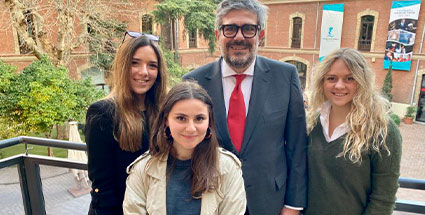
The Nebrija team at the ADEUR Moot Court
The team of the School of Law and International Relations, made up of students Alejandra Moreno Garcia, Maria Ros Saura and Sofia Pascual Tabares, and trained by our professor Jordi Regi, has qualified for the oral phase of the Moot Court organized by the Spanish Association for the Study of European Law (ADEUR).
Read moreVersus Pre-College Debate League
Pre-university students from Madrid and from different provinces participated in this debate league organized by Nebrija University on the Madrid–Princesa Campus.
Opening ceremony of the academic year
Opening Ceremony of the academic year at the Madrid-Princess Campus of the Nebrija University.
Master's Degree in Legal Practice
The School of Law and International Relations presents one of its most consolidated and demanded programs, with the presence of some of the best professionals in the sector.
IMPULSA I. Nebrija Employment Event
Event in which Nebrija talent connects with companies, organized by Nebrija Alumni and the Professional Careers department.
Double Bachelor's Degree in Law + Security
Testimony of Alejandra Moreno, student of the Double Degree in Law and Security.

